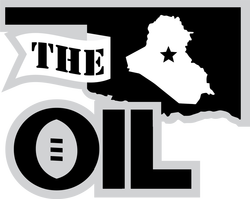|
Compiled and edited by Justin C. Cliburn This is the first installment in our ongoing oral history project. You can read later chapters here. To understand the OklahomIraqis League ("the OIL"), one must know who its members are and what brought them together. The league began at Camp Liberty in Baghdad, Iraq in 2006. It was resurrected in 2007 and kept alive each successive season. It's the way they keep in touch and share news with the men they served with in Iraq. Sometimes it's the only way because, although the men of the OIL are incredible friends, they may have never known each other without the Army National Guard. They came from different backgrounds and followed different career paths, but they served together as soldiers. Their bond would never be what it is without the experiences they shared one year in Iraq. 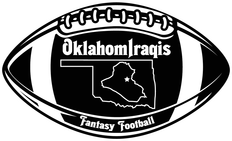 Their story is important, even if only to them, because when historians chronicle the Iraq War, they will focus on the usual fare: the battles; the successes and the failures; the bombings and the civil war . . . and the presidents and generals who managed them. But it will be up to the everyday Joes, the boots on the ground, to tell their stories . . . because no one else will. Who were these men? Why did they join the military? What did they do over there? How are they now? And what has kept them close since they first went to war together? These questions may be important only to those who already know the answers, but they need to be shared just the same. 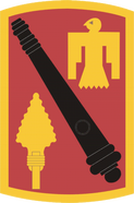 What follows is an oral history of the OIL, as told by the men who lived it, beginning with the combat mission that inspired it. It is by no means an exhaustive history of that combat mission in 2005-2006; such a history would fill a book of its own. But it is a decent overview of the year that preceded the formation of the OIL: where they were; what they'd experienced; how they felt. 152 Oklahoma soldiers served on that mission, but just a fraction of them are represented here. Each soldier below speaks for himself as an individual. Collectively, their memories form a history best expressed through the oral tradition of storytelling through conversation. Soldiers are traditionally a guarded bunch, reluctant to show emotion or share their feelings, so the following is a rare look into the collective memory of one group of soldiers in Iraq almost a decade ago. Origins The Oklahoma National Guard raised the 1st Battalion 158th Field Artillery regiment on February 26, 1920. Its proud history includes combat in World War II and Korea . . . campaigns in Sicily; Naples-Foggia; Anzio; Rome-Arno; Southern France; Rhineland; Ardennes-Alsace; and Central Europe; and in Korea from Winter 1951 to Summer 1953. And General H. Norman Schwarzkopf himself praised the battalion when it deployed during Operation Desert Storm: 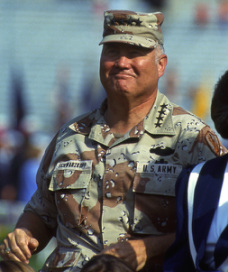 Gen. H. Norman Schwartzkopf (1934-2012) Gen. H. Norman Schwartzkopf (1934-2012) "[The Oklahomans] are part of the ground attack, [ . . .] achieving the highest rate of fire in Third Army,” he said. No unit, active-duty or otherwise, fired more rockets downrange than the 158, who fired over 900 rockets during that brief war to repel Saddam Hussein's forces from Kuwait. It was a point of pride for the soldiers firing the rockets and the Oklahoma Army National Guard in general. Those soldiers came home heroes, and many of them remained in the 158 when the future members of the OIL enlisted in the late 1990s and early 2000s. But no one suspected the 158 would be similarly called-upon in the near future. Television advertisements for the National Guard promised new recruits a monthly paycheck, commissary benefits, and a pension in exchange for "one weekend a month; two weeks a year" of their time. It was an easy sell, and later education benefits further sweetened the deal for young men and women fresh out of high school and soldiers transitioning from active-duty at Fort Sill. One Weekend a Month, Two Weeks a Year The Desert Storm veterans were proud of their service during that mission and spoke of it often. But they weren't just war stories. They were a reminder that one weekend a month, two weeks a year could change at any moment. So, when the country was attacked on September 11, 2001, the men of the 158 knew it was only a matter of time before they got the call. When they did get the call, each reacted differently because they'd joined at different times for different reasons. But they all answered the call, and this is their story. 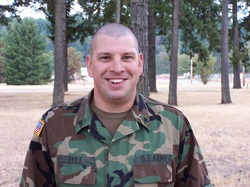 Kevin "Gomer" Pyle* Kevin "Gomer" Pyle* SGT KEVIN PYLE**: I joined in July 1997 to pay my way through college. I was naïve enough to believe my average athleticism would be enough to land some sort of scholarship. I was wrong. And I wasn't savvy enough to get an academic scholarship either. But I was savvy enough to know I didn’t want to spend 20 years paying off student loans. So I took the oath and joined Charlie Battery 1st Bn 158th FA in Anadarko. The Anadarko armory was built by the Works Progress Administration in the 1930s. A lot of the armories in Oklahoma were built that way. And most of them survived until the Oklahoma Army National Guard consolidated its regiments in regional Armed Forces Reserve Centers. *The accompanying soldier photos were taken at Fort Lewis, Wash. in 2005 unless otherwise noted. ** Soldiers are listed at the rank they were when they deployed in 2005. *** For information on the U.S. Army rank structure, click here. SGT LYNDAL MORGAN: I didn't join until 2001. I was from Comanche and knew Zachary Jessen, Matthew Leal, Yancy Baldwin, and James Peacock, who also joined the 158. 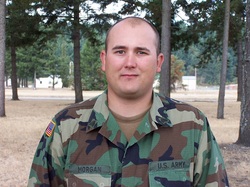 Lyndal "Dole" Morgan Lyndal "Dole" Morgan When September 11 happened, we all knew things would change; we just weren't sure how or when. But one thing was clear: whatever we thought we were signing up for was over. We accepted that. We just went to drill, did our jobs and hoped for the best. PYLE: Before 9/11, drill was pretty laid back. I knew we could get called up because I joined just six years after the 158 had gotten back from Desert Storm. But the U.S. hadn't been involved in any prolonged conflicts since then, and it didn't seem like anything major was on the horizon. Things seemed peaceful. 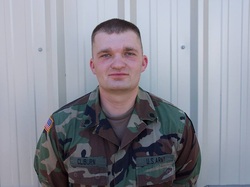 Justin "Brick" Cliburn Justin "Brick" Cliburn SPC JUSTIN C. CLIBURN: War was certainly the last thing on my mind. I joined because I procrastinated my way through high school and needed to pay for college. I started going to weekend drills before I was even officially in the National Guard and was assigned to Bravo Battery in Duncan, about 30 miles east of my hometown. The Duncan armory was old, but it wasn't historical like the other ones. It wasn't built by the WPA, and it sat on the outskirts of town, far away from the town's core. I was still in high school when I went to my first drill early on a Saturday morning in April 2001. I didn't even have a uniform for the first few months I went to drill. SPC ZACHARY JESSEN: That's when I joined, too. Originally, I was a 92A overseeing equipment maintenance and records. That job was okay, but I didn't like drilling in Lawton. I was assigned to HHS Battery in Lawton for my first two years in the National Guard. 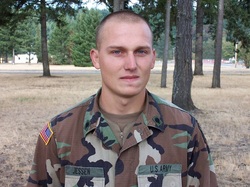 Zachary Jessen Zachary Jessen After that, I transferred to the Duncan armory, where I actually knew guys. I'd gone to high school with Bravo Battery guys Morgan, Baldwin, Leal, and Peacock. It was good to move to an armory closer to home. Eventually, I moved into a launcher and became certified as a 13M, but that was years down the road. CLIBURN: Is that snuff in your lip in your pre-deployment photo? JESSEN: Yup. CLIBURN: I wonder how many of our guys took their pre-deployment photo with snuff in their lip. JESSEN: Probably quite a few. You know it was pretty common in the Guard, and we were training when they pulled us out individually to take those photos. CLIBURN: Yeah, but I didn't even know anyone who dipped until I joined the Guard. My first drill in Duncan, at least three guys offered me snuff. That was very kind and welcoming of them, but I had never done it and didn't want to vomit on the drill floor. That would be a hell of a first impression . . . one I would never live down. Do you still dip? JESSEN: No. I actually quit during the 2006 Iraq mission, but it was hard to do. CLIBURN: I bet. I remember guys getting care packages full of snuff each week. It was a pretty popular item. 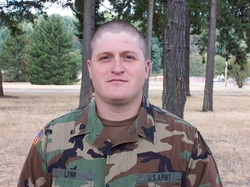 SPC Joshua Lynn (now an Armored Cavalry officer) SPC Joshua Lynn (now an Armored Cavalry officer) SPC JOSHUA LYNN: I was born in Duncan but always considered Marlow my hometown. I joined the 158 in 2000. Before that, I was in the Army Reserves in Texas. After I moved back to Oklahoma, I joined Bravo Battery because it was based in Duncan, where I was living at the time. CLIBURN: I didn't have a choice of armories. I was assigned to the Duncan armory and never questioned it. But you may have had more choice in the matter because you were transferring in from the Reserves rather than enlisting as a Private like me. SPC MATTHEW LEAL: I was from Comanche, too. I joined the National Guard just out of high school for several reasons, but the main reason was probably the college money. I was going to East Central University in Ada at the time. 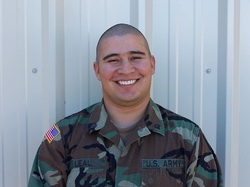 Matthew "Crash" Leal Matthew "Crash" Leal My dad was prior military as well, so I liked continuing that tradition. But he wasn't in the 158. He was active-duty in Vietnam and was very active in the VFW post in Duncan. So it was nice when I was assigned to Bravo Battery in Duncan. It wasn't far at all from my hometown, and I had a lot of connections there. Plus, I already knew so many of the other young soldiers assigned there. SPC JUSTIN FINCH: I joined the Guard between my junior and senior year of high school. Originally, I planned on using their tuition assistance program for college. I was from Rush Springs but drilled at the Bravo Battery detachment in Marlow. I loved it there. I spent half the day playing basketball in the armory with Luke Davis, Daniel Pickett, and Jake Smith. 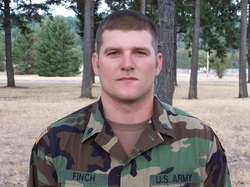 Justin Finch Justin Finch We had it made in Marlow because SFC Williams treated us like adults. We'd show up, get a list of tasks that had to be completed, make it happen, and go home. Sometimes, we'd stick around and play basketball for the hell of it. Those were the good ol' days. Meanwhile the guys at the Duncan armory would be sitting around waiting on final word from battalion whether they could leave or not. CLIBURN: I always liked when we had meetings down at the Marlow armory. It was older and in the middle of town. It was built by the WPA and had a lot of character. It just looked so much more statuesque than the Duncan armory. Plus, like Finch said, it had a very large drill floor with basketball goals. 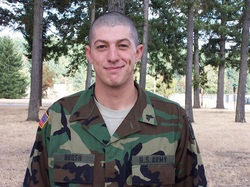 Stephen Brosh Stephen Brosh CLIBURN: I remember the day he came to drill for the first time. BROSH: I was sitting on a connex talking to a group of my fellow soldiers about when we were being shipped to basic training. That’s when I found out that my new friend Justin Cliburn would be heading to the far away land of Fort Sill . . . less than 30 miles away from where we were sitting. That first drill I remember being told to clean the rest rooms. I said I signed up to fire rockets, not to be a janitor. That’s when I realized how full of shit my recruiter really was. SGT STEPHEN BROSH: I was from Marlow, but I drilled in Duncan. I joined in 2001, just out of high school. I joined the National Guard to get through college. Little did I know I would never be interested in school. My parents told me I would have to prove my grades to them before I went off to a school other than Cameron University in Lawton. I thought “I'll show them” and joined the Army National Guard on August 21, 2001. SGT YANCY BALDWIN: I was another Southwest Oklahoma guy. Like Leal, Morgan, Jessen, and Peacock, I was from Comanche. I joined on February 28, 2001 while I was still in high school. 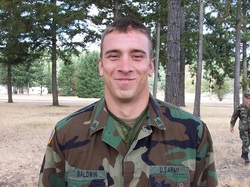 James Yancy Baldwin James Yancy Baldwin I was going to Bacone College in Muskogee on a partial wrestling scholarship, but I knew I'd need extra help. That's why I joined the Guard. They put me in Bravo Battery in Duncan, which was good because I knew guys there already. SGT MIKE SCHMIDT: I wasn't from Oklahoma. I ended up here like so many other young guys: I was active-duty Army. I was stationed at Fort Sill when my enlistment contract expired, and I decided to say in the area. I was originally from Salt Lake City, Utah, but I knew I didn't want to move back home. So I stayed here when I ETS'd mainly because I'd met my future wife and didn't want to leave her. 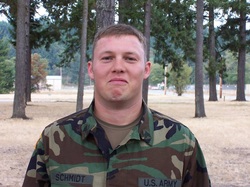 Michael Schmidt Michael Schmidt And I didn't want to move back to Utah either, so I joined the 158 in August 2001. It was mainly to pay for my college as I transitioned to a new career. Obviously, that was just before 9/11, but I don't regret joining. I drilled in Alpha Battery in Walters. I got married just a few months later, and that's how I stayed in Oklahoma. After I got out of active-duty, I moved to Walters, where I was started working for the local funeral home. So drilling in Alpha Battery was really convenient for me because it was in Walters. Plus, there were great guys there. 1LT MARK FITZGERALD: I joined the National Guard (and the 158) in 2000. I was older than most guys are when they sign up, and I had already finished college by that point. I was living in Lawton and starting a career teaching at Lawton High School. Prior to teaching, I'd considered staying at Cameron University to get my Masters degree while working through ROTC and going active-duty. But my wife and I decided I should start teaching rather than delaying a regular paycheck for two more years. She was also a teacher, so money was always going to be an issue . . . especially trying to raise a family and retire with dignity on two teaching salaries. 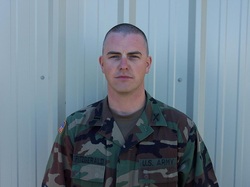 1LT Mark "Fitz" Fitzgerald 1LT Mark "Fitz" Fitzgerald So I started feeling out my options with both the Army Reserves and the Army National Guard to see what a monthly drill check and reserve component retirement could do for me. The Army Reserves couldn't guarantee me an OCS (Officer Candidate School) slot, but the Army National Guard could. And they could guarantee me a Field Artillery position. My father is a retired Lt. Col and commanded two different batteries in Vietnam, so there was a strong pull to follow in his footsteps. I joined the Army National Guard as a 13P (Fire Direction Specialist) with the OCS option in my contract to eventually become a Field Artillery Officer. Since I wasn't MOS-qualified (Military Occupational Specialty), I spent drill weekends up at brigade headquarters getting the feel of things while waiting on my OCS to start in March 2001. There wasn't a lot to do during that time, but I at least got to familiarize myself with the equipment I'd be in charge of once I received my commission. SSG JACK BRUESCH: I got in the Guard in December 1993, when I was still in high school. I come from a strong military family. All the men in my family have been in the military, but I was the first to join the Army. I don't remember why I picked the National Guard, but I did. 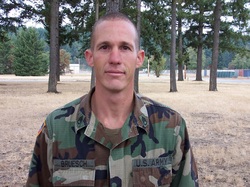 Jackie "Jack" Bruesch Jackie "Jack" Bruesch My recruiter took me to see an MLRS battery in the field, and I got to ride in one of the launchers. After that, I was sold. I signed up and my recruiter assigned me to the Chickasha armory because it was closest to Norman. CLIBURN: I didn't understand why my recruiter assigned me to the Duncan armory, even though I lived in Lawton and there was an armory there. I asked if I could just drill there, but he said everyone has to start out in Duncan and then transfer to Lawton later. It wasn't until I was actually in for a year or two that I realized he was full of shit: I was a 13M, and the Lawton armory wasn't a firing battery. 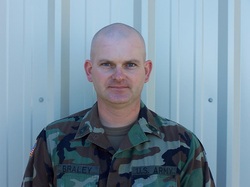 SFC Mark Braley SFC Mark Braley SFC MARK BRALEY: I joined the Oklahoma Army National Guard after leaving active-duty. I was in the 1/179th Infantry and drilling in Stillwater. I got a job in Norman and the commute each drill weekend was killing me (165 miles round trip). One of my bosses was a Major in the 158 and suggested that I transfer. I started out in Anadarko under the excellent tutelage of then SSG Scott and 1SG Blalock. I went from active duty at Fort Bragg to the infantry and then to Anadarko. I believe “culture shock” would not be overstating it. Those were a great group of guys who knew how to shoot rockets. The Day Everything Changed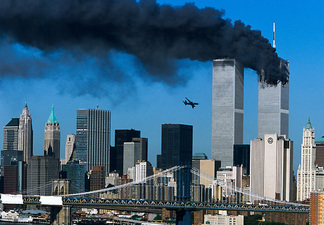 CLIBURN: When I told my friend I'd joined the Guard, he said, "Dude, if we go to war, you're like the first to go." I replied, "Yeah, but what are the odds of that happening?" Then 9/11 happened. BROSH: On September 11, 2011, I was driving a delivery truck for Cable Meat Center in Marlow and going nowhere with my life. CLIBURN: I was going nowhere as well. I was still working my high school job at Captain D's and didn't really have much of a plan beyond the end of each shift. BROSH: I heard about the attack on the radio. I immediately called my recruiter and asked him if I was headed to war. He said “hell no, you’re headed to basic training.” Damn! CLIBURN: Since I hadn't been to basic training yet, plenty of people were telling me it wasn't too late to get out of the Guard. I didn't want to go to war, but I had too much pride to tell my recruiter I'd changed my mind because I was afraid I would actually have to be a soldier. So, in a sense, 9/11 made me a man of my word . . . because I was too ashamed not to be. I reported to basic training the next month, and the die was cast. BROSH: The same with me. We weren't going to back out at that point. So, a month after 9/11, Cliburn and I went to MEPS (Military Entrance Processing Station) and then basic training together at Fort Sill. 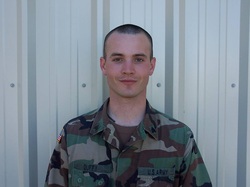 Adam "Duff" Duffy Adam "Duff" Duffy SGT ADAM DUFFY: 9/11 was significant for a handful of reasons above and beyond the obvious one. I'd just joined the Guard to pay for college (I swore in on September 6, 2001). Years of peacetime preceded my enlistment. But, five days after I swore in, the world changed, and we dropped the hammer on Afghanistan while I was in basic training. PYLE: That was a difficult day. I wasn't in class due to a funeral, so I watched the chaos live. I called my mom, who was beside herself. She knew I'd be deployed. And I was anxious because I wanted revenge . . . even though I wasn't sure who was responsible. But, as information trickled in, one thing became clear: being a weekend warrior was over. Training had a different feel; it was palpable. BRUESCH: I was at work when the planes struck the towers and watched it all on TV. It was disturbing. I don't think "terrorist" crossed my mind at the time; I was thinking it was just crazy people. FITZGERALD: I was in class teaching at LHS when it happened. I had OCS drill the following weekend and showed up for drill unsure of what was to come. We were all officer candidates at that time without much of a function. We knew we had to finish OCS, receive our commissions and then head to Officer Branch Course (OBC) before we were even deployable. So the knee-jerk revenge reaction wasn't even an option for us because we weren't yet qualified to lead soldiers into battle. CLIBURN: That group of soldiers (the ones that went to basic training just after 9/11) . . . we knew things were different. Our drill sergeants reminded us every day that the embers were still burning at Ground Zero . . . they were still looking for bodies. BROSH: Drill Sergeant Breland loved to remind us of that. CLIBURN: The first week of basic training we were each assigned a "battle buddy." You were never to do anything without your battle buddy, and you were responsible for looking out for your battle buddy. Mine was Sam Alvey from Kentucky. BROSH: Mine was from Kentucky, too. His name was Timothy Bertram, and he was in the Kentucky Army National Guard. We got along really well. I couldn't believe someone from Kentucky could be so much like me. I mean, we were alike in just about all our beliefs and political opinions. We had the same hobbies and listened to the same music. We hit it off right away. CLIBURN: Yeah, and because you and I knew each other, we spent a lot of time talking to each other during those early days of basic and beyond. Naturally, I became really good friends with Bertram, too. BROSH: Yeah, and he was also a 13M, like us. So we knew we'd be going to AIT together after we graduated basic training, the three of us. CLIBURN: We became close friends during that time. Then we remembered that, once we graduated AIT, Bertram would go back to Kentucky while we stayed in Oklahoma. That sucked, but we promised him we'd get back together one day. And it did happen eventually, just not in the way we expected. Getting the CallThe soldiers were always told the call would use coded language like a cloak-and-dagger film. In Bravo Battery, SFC John Kaiser said the message would simply be Raging Bull. But that wasn't what happened when they got the call on Valentine's Day 2003. 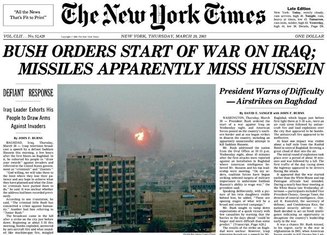 DUFFY: It was inevitable we'd deploy, but then 2002 came and went without a word. I started to wonder if it would ever happen. I was giving my girlfriend her Valentine's gift when I got the call from SFC Kaiser. It was happening: we were being mobilized for the invasion of Iraq. CLIBURN: I remember that call ruining a lot of Valentine's Days. Mine came from SFC Paul Burden, but there wasn't any mysterious language involved. He just said we were being mobilized and I had two weeks to report. I was disappointed, but not because we were being mobilized . . . because he didn't even try to make it sound cool. 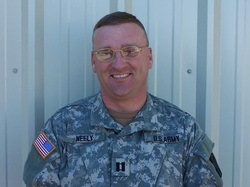 Captain Charles "Charlie" Neely Captain Charles "Charlie" Neely CPT CHARLES NEELY: I'd been in the 158 since 1997 and drilled mostly in Charlie Battery. When we got the call, I was excited to deploy and do my job as a Field Artillery officer . . . because that's what I'd trained for for so many years, both in the National Guard and on active-duty. I wanted to do my part in the war effort. A lot of us did. FITZGERALD: I wanted to also, but I couldn't. I was in the unit then, but the 2003 mobilization happened more around me. I was back from OCS and at Alpha Battery in September 2002 with an OBC date of Summer 2003. So I wasn't branch-qualified as a Field Artillery lieutenant when the mobilization began in March 2003. PYLE: I had mixed emotions when I got the call. I was excited to get an opportunity to do everything I'd spent years training for. We were good at firing rockets down range. Our track had good chemistry. I was with the same Track Commander for four years, and we were at the point we knew what each other was thinking. We were a well-oiled machine. And my father was on the mission, too. But I was leaving my eight-month-old son and wife at home, and I would miss my son’s first birthday. My wife was a terrified first-time mother, and her husband of less than a year was about to go to war. CLIBURN: I was in the ammo platoon back then, so I wasn't nearly as excited. Ammo got all the grunt work and none of the glory. But all the ammo guys had joined at about the same time, so we had good camaraderie. I played high school football (poorly), and I missed that feeling of being on a team. The Guard provided that, especially during the 2003 mobilization. BROSH: In 2003 we were activated and once again I wasn’t doing much. I requested to go “advanced party” and get there a little earlier than the majority of the unit. I had just been put into a launcher (for the multiple launch rocket system) and was excited to fight for my country. PYLE: I was at the top of the promotion list when we mobilized, so all the brass told me I would get “pinned with my five” when we got to Fort Sill. I was the battery, battalion, and brigade soldier of the year the previous two years. I felt my time as an Army National Guard soldier finally meant something, but that changed once we got to Fort Sill. CLIBURN: I'm not sure what I expected when we mobilized in 2003, but it sure wasn't what happened. It was all a lot more bureaucratic than hooah. PYLE: That's being kind. The mobilization was soul-crushing. Days dragged on and on as the monotony and home sickness set in. There were endless classes, ranges, and vehicle maintenance that made every day feel like a grind. CLIBURN: It certainly wasn't exciting. The days were long but not particularly busy, at least for the grunts. PYLE: My only solace was I could go home on weekends to see my wife and son, although it was frowned upon. Once we checked all the boxes to prove our worth as soldiers, I spent endless days in the motor pool cleaning every speck of dirt and oil from our track. Hurry up and wait was in full force. We still had to go to the motor pool daily, despite our track being spotless, while we waited for the order to load our equipment on the railhead. FINCH: We spent most of our time in the motor pool cleaning our equipment. In the off time, we drank quite a bit. Some of us ended up getting locked down on post due to things we'd done while drinking. CLIBURN: Didn't you paint someone with black Kiwi polish one night? FINCH: Yeah. Me, Luke Davis, Jake Smith, and Jim Beam had a Kiwi makeup party one night. We painted several guys after they passed out. CLIBURN: I just remember the one guy from Altus. His entire face and neck was painted black. He didn't remember any of it and got the shock when he went to the bathroom the next morning. He was late for formation. BRALEY: I was amped for the 2003 mission. I was on active duty in 1990 at Fort Bragg and deployed for Desert Shield/Storm. In a perverted way I was looking forward to going back. The camaraderie and adrenaline is like nothing I found in any other venture. During our mobilization training I was offered a direct commission and, like an idiot, declined. DUFFY: I had a girlfriend when we got called up, and I freaked out. I figured I would deploy and I would die. I told her I wouldn't go downrange with a girlfriend, and she somehow turned that into a marriage proposal. I didn't know what to do, so I did what any guy in my shoes would do: I married her. CLIBURN: I didn't have a girlfriend to worry about . . . and I wasn't one of those guys who went and found a stripper to "wait for me" as soon as we got called up. Anyone who's been in the military or grown up in a military town knows those guys exist. I wasn't sure if Duffy was one of those guys, to be honest. To be fair, I didn't know him well and his wife did show up to the armory kind of looking like a stripper. DUFFY: Yeah, well, the writing was on the wall when her sorority sister approached me and said, "she was asking today how much money she got when you died . . . not if you died. When you died." That was one of the dumbest moves of my life . . . we were split up by May. BROSH: I had a blast on that mobilization with all the guys. Leal knows what I'm talking about! LEAL: I think I do indeed. What I remember most about the 2003 activation was all the time we young guys spent at the strip club. CLIBURN: Oh, yeah. They took plenty of 158 money during those few months. It's important to remember that we were all 19, 20, 21 years old during that time. LEAL: Yeah. A lot has changed since then. Haha. We're both married, for one. CLIBURN: I would hope we'd changed since then. It's been over 10 years. I remember being there one night and never having to buy a beer. My cup was filled and refilled all night long. About two weeks later, we were talking about how nice it was for the strip club to give us free beer all night (since we were going to war). That's when Porterfield piped up and said, "What? I paid for the beer the whole night." I couldn't believe he'd spent almost $200 on watered-down beer that night and never mentioned it to us, but he was an odd dude. BROSH: Was that the night he tried sleeping in my bed and pissed on Little Bickerstaff's shoes? CLIBURN: I think so. But he certainly wasn't the only one who got too drunk during that activation. Mission AccomplishedBut the 158 never did load their equipment on the railhead. Nor did they go to Iraq that year. After Baghdad fell, they were told the war was over. Some guys were thrilled. Some were disappointed. And some were angry. But they all agreed it was extraordinary and wouldn't happen again. When Uncle Sam activates says "you're going to war," he usually keeps his word. This time he didn't, and that was unnerving to some extent. So each soldier accepted his medal and went back to his civilian life . . . wondering when he'd get the call again. DUFFY: No one anticipated the speed of Saddam's downfall, and, before we even deployed, President Bush went on national television and declared "mission accomplished." 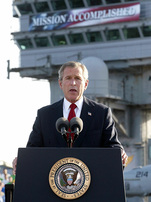 LEAL: That was really disappointing. We were all ready to go. We'd had this singular purpose all that time, and then it was gone. CLIBURN: I remember Col. Gary Adams delivering the news to us at Fort Sill. He was gentle and built us up before he let us down . . . like he was breaking up with us. DUFFY: He basically said it's not you; it's Baghdad. CLIBURN: Exactly. He told us the original battle plan called for the 158 to take Baghdad, but the city fell sooner than expected. I don't know if that was true, but it felt good. Then he told us the war was over and we were no longer needed. There was a weird vibe after that speech. DUFFY: And, by May, we were packing up our stuff and heading back to the armories. Looking back, that's when the National Guard really changed. It marked the end of the weekend warrior era. Although we were going home instead of war, the intensity of everything was as serious as one would expect on active duty. That’s why we all became so close: we lived that together and knew it could happen again. CLIBURN: That evoked a lot of mixed emotions. PYLE: It did. I felt angry, unwanted, frustrated, and useless. I'd left my full time job (which I had just started in January), my family, and my home. I spent two and a half months building a camaraderie with brothers-in-arms only to be told to go home. Then I found out my ETS date was supposed to be 02 July 2003, but, because of the deployment orders, I was on stop loss for an additional year. BRALEY: When we demobed I felt like we had been cheated. All of the training, the shots, the time away from family was worth it until we were told “just kidding, go home” CLIBURN: I was a little upset, too. I'd psyched myself up for this. I'd dropped my college classes in preparation for the deployment. And I didn't really have a whole lot going on at the time anyway, so it wasn't like I was excited to get back to my civilian life. NEELY: I was depressed as the war dragged on without us, and especially after we were told "the war was over." I felt we could have made a difference early on, but the mobilization process just took too long. DUFFY: What a roller coaster. I wasn't sure I could handle that sort of instability and uncertainty again. The end of the mobilization was bittersweet. I got married and divorced in a manner of months due to knee-jerk reactions to the mobilization. I dropped 15 hours of school for no apparent reason. But I didn't have to go to war, and the safety of that trumped everything else. JESSEN: I definitely had mixed emotions when the mission got canceled. I was excited to be going. I was excited to actually do what we were trained to do. But, to be honest, I was still scared of what could happen. FINCH: I was upset we didn't get to go over there and shoot rockets downrange. But, at the same time, I was relieved I didn't go with some of those soldiers. There were a lot of power-tripping old men on that mission who were just pissed off they had to go to war. BRUESCH: I was on the 2003 activation and spent those 80 days on Fort Sill fishing after we got off duty. I was kind of mad we were ordered to stand down, because I wanted to go. It felt like my calling. We were finally going to do what we'd spent years training for . . . and then it was back to regular weekend drills. PYLE: By the end of that deployment, I still wasn't promoted either. Apparently, they put my father's name in the E-5 slot instead of mine. It's difficult to describe the disappointment I was feeling, and I never found out why the mistake couldn't be fixed. The 2003 mobilization was a huge disappointment all around. FINCH: Yeah, it was. Then I got home and found out Jody was banging my wife while I was washing ammo trucks at Fort Sill every day. I divorced her pretty quickly . . . and that's all I've got to say about that. 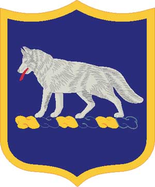 1st Bn 147th FA, South Dakota 1st Bn 147th FA, South Dakota DUFFY: Our "sister unit" during that mobilization was a South Dakota Army National Guard unit. I remember feeling bad for them because they had to drive their equipment all the way to Fort Sill. CLIBURN: Yeah. One of their guys actually went to high school with me. That's the only reason I remember they were the 1st Bn 147th Field Artillery regiment. DUFFY: I wonder how they felt about packing up and driving another 12 hours or so in their HEMTTs back to South Dakota. BROSH: That was really disappointing after all the training to be sent home to normal life. I really wanted to go at that time of my life. LYNN: I was on the 2003 mobilization. Getting deactivated was a real letdown. We trained and spent a lot of time preparing our equipment for movement to theater and it just never materialized. I remember our date for the rail head kept getting pushed back further and further; meanwhile we were watching Third I.D. (Infantry Division) roll through Iraq with little resistance. It soon became obvious there was going to be no need for MLRS, and sure enough we were demobilized. Change of MissionBut the mixed emotions went away less than two years later when, in early 2005, the soldiers were informed their next drill's first formation would not be at their respective armories. Instead, they were to report to Snow Hall at Fort Sill, home of the U.S. Army's Field Artillery School. The change signaled a big announcement to come, and the rumor mill started churning. 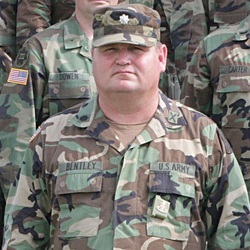 Lt. Col. Allen J. Bentley Lt. Col. Allen J. Bentley LTC ALLEN BENTLEY: I was the battalion commander when the mission came down. We got word just a few days before we put everyone in Snow Hall for the change of mission brief. Col. Adams was opposed to my briefing the troops right away. He wanted me to wait until stop-loss went into effect (after the official orders came in). He was worried there would be a mass exodus of soldiers doing all they could to avoid a combat deployment. But I had no such fears. I knew the men, and they deserved to know immediately what we were facing. They took the oath, and that was enough for me to trust that they'd show up and fulfill their duty. FITZGERALD: By the time the mission came down, my wife and I had moved out of Lawton and were living in Decatur, Texas (north of Fort Worth). I was driving up each month for drill weekends as a 1LT in Alpha Battery in Walters. 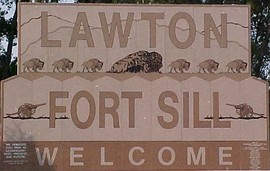 DUFFY: When 2005 rolled around, I had let my guard down. It'd been two years since we were activated, and even then we didn't go anywhere but Fort Sill. So that was the backdrop when we found out January drill was moved from the Duncan armory to Snow Hall at Fort Sill. CLIBURN: When I heard we were meeting at Snow Hall, I knew something was up. I had just started working for UPS with Duffy. I stopped by there to complete some employment paperwork and asked what he thought was going on. He suspected just as I did. DUFFY: I had just gotten off the phone with SSG Velarde, who was calling to discuss the same thing. We knew that we wouldn't be summoned to Snow Hall unless there was going to be an important announcement. CLIBURN: And it wasn't hard to guess what the announcement would be about. The country was involved in two wars and we hadn't yet "done our part." DUFFY: Exactly. We all suspected a deployment announcement, but nobody knew much else. And we wouldn't know much more until the announcement. CLIBURN: I got there early and sat in the back, waiting for my buddies to show up. On stage, the leadership was working through technical issues to ensure the PowerPoint presentation was ready. I could see the mouse moving all over the desktop on the big screen. Then someone clicked on a PowerPoint icon and "CHANGE OF MISSION: SECURITY FORCE (SECFOR)" popped up on the screen. It was only a split second before someone minimized the window, but it was long enough . . . I knew what was up. JESSEN: I wasn't early enough to see that. I just remember it all being presented as an opportunity rather than an obligation . . . and I definitely bought in. SPC Wes Parra and I sat next to each other that morning, and, after they finished their Hooah! speech, all we could think was, "Hell yeah, I’m volunteering for this!" It seemed exciting. DUFFY: It was definitely hooah! The leadership seemed really enthusiastic about the change of mission, and they tried to get us excited too. It felt like they were trying to sell us a timeshare . . . and I wasn't buying. LTC BENTLEY: I hated that the mission was for a security force, too. I always thought I would lead the battalion into battle. But no; the burden fell onto a captain's shoulder. I hated that and tried to get the mission changed to no avail: half the battalion would go and half would stay behind. Damn, I hated being too old and too senior to fight in this war. But I also needed to set a good example for my soldiers. NEELY: The SECFOR mission wasn't my favorite but my thought was any way to contribute to the war was better than sitting at home and missing out. FITZGERALD: That whole ‘change of mission’ and the way it was presented was interesting. I remember SGM Jensen coming on stage practically screaming at us all he was so excited. Knowing CPT Neely pretty well, I knew a little about what was coming. I was already trying to work into an AGR (Active Guard and Reserve) position when news of the activation came down. BRALEY: I didn’t care what the mission was. I just wanted one. So when the change of mission came down, I was just happy to be a part of it. PYLE: Regardless of the presentation at Snow Hall, the change of mission left me with a WTF?! feeling. A lot of the let down from 2003 crept back. I already felt I'd been screwed over and let down and trampled over before, so I didn't want to volunteer. I had a wife and son at home, and besides, I figured Uncle Sam would just get my hopes up again and then say, “never mind!” CLIBURN: I wasn't convinced I should volunteer by that speech either, but it wasn't because I was afraid they'd get my hopes up again. I was starting my second semester of college and had just started a new job. And I wasn't sure how I'd tell my parents I'd volunteered to deploy. DUFFY: I drilled in Duncan my entire time in the Guard (until they moved the armory to Fort Sill). The only guys I knew when we mobilized were from Bravo Battery. Unfortunately, I was called up after most of the groups were established, so I didn’t join my Bravo guys. Instead, I was in Second Platoon (mostly Alpha Battery guys), and Henderson was the only guy I knew in that platoon. 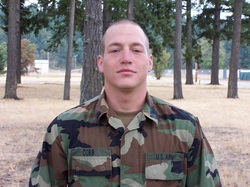 Aaron "Doc" Cobb Aaron "Doc" Cobb SPC AARON COBB: I had just moved to Oklahoma to live with my dad when the mission came down. I was from Arkansas and spent time in the Arkansas Army National Guard before transferring into the 158. I was a medic assigned to HHS Battery in Lawton. The only guys I knew in the 158 were the other medics . . . guys like Aaron Gray and Eric Hitchcock. As a medic, I knew pretty early that I was going to be deploying. I didn't have much of a choice, and I knew it. LEAL: I didn't have a choice in the matter either. I was supply, and supply was going no matter what. So I knew I was on the mission from day one. I was going to East Central University and selling cars at Ada Nissan when we got word of the mission. 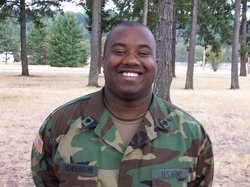 Ulysses "Hendo" Henderson Ulysses "Hendo" Henderson SPC ULYSSES HENDERSON: When the change of mission came down, I'd just joined the 158. Before that, I was active-duty and had just come back from Korea. I was originally from California but ETS'd at Fort Sill. After I got out, I just decided to stay here. I didn't have a job yet, so I joined the Oklahoma Army National Guard. Then I started a new career with the Lawton Police Department. I knew several LPD officers who were in the 158, and they told me they were likely deploying. But, at that point, it was nothing but a rumor. The Army runs on rumors, so who knew if it were true? We just had to show up each month and do our job until we knew something for sure. 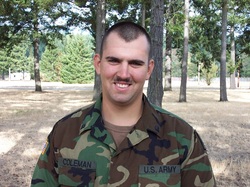 Kyle Coleman Kyle Coleman SPC KYLE COLEMAN: I'd just come off active-duty, too. I was from South Carolina, but I was stationed at Fort Sill when I ETS'd. I stayed in Lawton for awhile and joined the 158 in 2005. It was about a year before the SECFOR mission, and I didn't know anyone in the 158. I knew pretty early on that the 158 was deploying soon, but I'd been to Iraq before and joined anyway. They put me in Bravo Battery, and I made friends right away. LYNN: I was excited about it. I'd enlisted in 1998 and done a lot of training. But I never had an opportunity to employ it. It was akin to practicing for a game but never getting to play. CLIBURN: Finally getting a chance to "play in the game" aside, not everyone was ecstatic about the prospect of dodging IEDs in Iraq. But, even though there wasn't a 100% volunteer rate, we didn't seriously consider deserting or anything. Whether it was duty or pride, that just wasn't an option. LTC BENTLEY: Not long after the announcement, Col. Bray stopped by my office to find out how the men took the news. I was proud to say they took the news just as I knew they would: with honor, commitment and integrity. Not one man tried to transfer or shirk their duty. I just hated having to prepare my soldiers for battle rather than leading them into it. Drafting the TeamThe mission required 152 men, but there were over double that in the battalion. The leadership characterized it as a volunteer mission, but their responsibility was still to send the best combat unit they could assemble. Not everyone that volunteered deployed. And not everyone that deployed volunteered. Drafting the SECFOR team must have involved a lot of difficult decisions, and the leadership didn't have much time to make it happen. CLIBURN: By the time the Constitution announced the deployment, we'd known we were going for quite a while. It wasn't a surprise, but seeing it in the local newspaper made it seem more real. 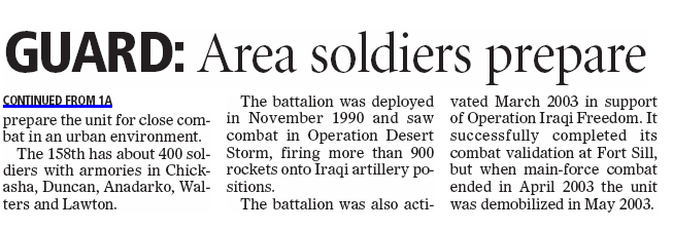 (click to enlarge) (click to enlarge) LTC BENTLEY: CSM Jenson and I knew up front that only our best soldiers would go. Oklahoma always sends her best men to fight. That way we have the best chance of everyone going over, fighting to win and getting back home safely. That was a given because it's the way it was always done. That was the only goal we had: send over the best we can. 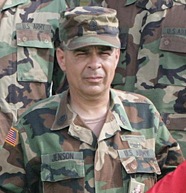 CSM John Jenson CSM John Jenson SGM JOHN JENSON: LTC Bentley is being modest. I've worked with a lot of colonels and generals, but he was one of the smartest and boldest. He was an excellent leader, and he created the criteria for the mission himself. Its sole purpose was to get our soldiers to Iraq and back safely. That was the goal from day one for all of us. LTC BENTLEY: I first called CPT Ray and offered him command but he needed time to think about it. He was honored to get the call, but he wasn't sure he wanted to be the commander. CPT Neely was called next, and he never hesitated. He said yes, so Bravo Battery got the lead on the mission. He and his leadership team led all major aspects of training for the mission. NEELY: I felt, as a former active-duty military police soldier, I had the skills and experience to serve as a company commander in a SECFOR role. I told LTC Bentley without hesitation that I and Bravo Battery would lead the way. We had been preparing for this in a small manner for some months before the "official word" came down, so I wasn't blindsided by it. I didn't micromanage which soldiers went on the mission and which ones didn't. I believed each battery had quality people to contribute, so it was a matter of asking the their officers and senior NCOs who would best execute the mission. I left it in their hands, and the DMD (Deployment Mobilization Document) changed constantly up until the day we arrived in Kuwait. CPT Ray served as Second Platoon's platoon leader, and the mission was all the better for it. SGM JENSON: I had little input on staffing the mission, but it was in good hands. It was mostly done by CPT Neely, as commander of the SECFOR mission. Although we had a lot of great soldiers, it wasn't easy putting the team together. There were very specific roles in each platoon and squad that needed to be filled and balanced across the platoons. I remember it required a lot of cross-leveling: pulling out guys from one battery to strengthen another; moving men between platoons to properly balance the skills and leaders of each platoon, etc. The leadership spent a lot of time doing that. BRALEY: I don’t remember how many people moved around. If I remember correctly, it was much like a big draft. One platoon sergeant or lieutenant would say “Okay, I'll take those six” and the rest of us would say “Oh hell no!” We ended up negotiating and getting good mixes for the platoons. None of us got everyone they wanted which was probably for the best. I am biased, but I think I came out with a smoking crew. FITZGERALD: I wasn’t privy to the draft that took place. I was simply given a platoon with SFC Braley as the platoon sergeant. We had not worked together before, but we'd each heard good things about the other. Do you remember when I came to Duncan on a Sunday of drill and Braley and I had all the guys in the classroom and gave our introductory speeches? CLIBURN: I do. You were a hell of a motivator, and SFC Braley made me feel like we'd be a squared-away platoon. I still couldn't tell my mom I'd volunteered to go to Iraq, but I was definitely feeling the pull. I hated not being in First Platoon. FITZGERALD: Oh, yeah. You weren't originally in First Platoon were you? CLIBURN: No. I was in the "able-bodied reserve" platoon . . . otherwise known as Fourth Platoon. It wasn't until after Camp Gruber that I joined First Platoon, after I was volunteered. FITZGERALD: There weren't many that came out of Fourth or Fifth that we wanted in our platoon. I do remember getting Coleman as a cast off from Second Platoon. They didn’t want to deal with him. That platoon was the rowdiest on the mission and they couldn't manage Coleman? CLIBURN: Well, I'm glad I was acceptable as a former Fourth Platooner. I really hated not being with my Bravo guys in First Platoon so, once I was officially on the mission, I lobbied hard to get put in First Platoon. Accepting the ChallengeBetween the Change of Mission announcement and the actual mission was the battalion's annual training period, which was scheduled to be conducted in Idaho that summer. But the SECFOR mission changed that, like it changed so much else. Instead, the men stayed closer to home and trained at Camp Gruber, an Oklahoma Army National Guard training post in eastern Oklahoma. It served as a POW camp for German soldiers during World War II and was named after the man who wrote the Army Song. There, the battalion was divided into platoons. Headquarters, First, Second, and Third platoon were soldiers who had volunteered for the mission. Fourth Platoon was the able-bodied reserves. Fifth Platoon was made up of the men who, for whatever reason, were not eligible for the mission. FINCH: I wasn't even at the Snow Hall presentation. I was out of the Guard by then. After the 2003 mobilization, the Marlow armory was closed down, and our days of playing basketball and going home early were over. I had to start drilling in Duncan. I met some good dudes in the Duncan armory (Wes Parra; the Baldwins [Big and Little]; Brick; Zach Jessen; Adam Schuster; and Will Martin), but I was ready to move on from the Guard. CLIBURN: I didn't know Finch well when he was in Marlow, and, just when I got to know him in Duncan, he got out. FINCH: I ETSd in November 2004 and didn't plan on reenlisting. But, when I heard Bravo Battery was being called up, I called SFC Burden to see if I could reenlist. I met with CPT Neely the next month about joining the mission and signed my papers that day: three more years. I just couldn't imagine my buddies going there without me. So I signed back up and went to Camp Gruber as a member of First Platoon. CLIBURN: I remember doing a double-take when I saw Finch at the armory. As far as I knew, he wasn't in the Guard anymore. What is he doing here? But he wanted to deploy, so he re-upped. I was glad to see him. FINCH: My papers actually say I reenlisted the same month I got out, but they had to have fudged some numbers or something. I know I was out for at least a couple months before I re-upped. MORGAN: I was in nursing school and working at Duncan Regional Hospital, so it wasn't an ideal time to deploy. But what is? I knew Leal, Jessen, Peacock, and Baldwin were going, so I went ahead and volunteered. PYLE: I didn't volunteer early on, so I trained with the scrubs and outcasts during annual training at Camp Gruber. But I didn't care because I was getting a paycheck. Besides, nobody seemed in a hurry to throw my name in the hat for a promotion. CLIBURN: Hey, I was in that platoon, too. So was Duffy and Schmidt, and we weren't scrubs. But I know the feeling. To be fair, there were some scrubs in Fourth Platoon, and Fifth Platoon was worse. I didn't like being associated with those guys either. It was a pride thing. PYLE: Exactly. But, throughout AT I heard younger soldiers speaking on the phone with their mothers and girlfriends. As an NCO, I shifted my thoughts from my own pity party to them. I’d known them since they were babies. I'd even known some of their mothers since I was a child. I felt obligated to lead and protect them. I also thought, “what if there will be multiple missions? Do I really want to go over there with the 'B' team? Do I really want to be there with guys who never wanted to be in a fight to start with?” That weighed on my mind the rest of AT. CLIBURN: I didn't like that it was a volunteer mission. It created two classes of soldiers: those who loved their country; and those who didn't volunteer . . . or that's how it seemed anyway. DUFFY: That's exactly what it did. The number of the platoon you were in indicated your status. If you were in Headquarters, First, Second, or Third platoon, it indicated you'd “volunteered” and met the standard. Fourth Platoon were guys that didn't raise their hands but were still qualified to go. Fifth Platoon was the Guard’s way of saying thanks, but no thanks. CLIBURN: When you met a soldier at Camp Gruber, the first question was what platoon are you? If you said Fourth Platoon, there was a visible disappointment in their face. DUFFY: And how many times did you hear, “we could really use you” or “you don’t want to be with the broke-dicks do you”? CLIBURN: If you didn't know any better, you'd think you were in some elaborate psychology experiment. It worked though because I felt guilty as hell. But why? I was a soldier; I followed orders . . . and I didn't have any orders. DUFFY: I always thought I volunteered for anything and everything the Army needed when I raised my hand and took the oath. The whole volunteer thing seemed redundant. It was like seeing someone drowning and turning to the lifeguards to say "we're going to need a volunteer to save this person's life; any takers?" A guy like me would think, “yeah, I that's why I became a lifeguard.” It was unnecessarily complicated and divisive. CLIBURN: Towards the end of AT, my platoon leader and platoon sergeant approached me and asked why I hadn't volunteered. I told the truth: I couldn't look my parents in the eye and tell them I'd volunteered to go to war; it would crush them. They asked what would happen if they really needed me and I had orders saying I had to go to Iraq. I said, in that case, I'd show up and give it my all. "Well, we really need you, so you'll be getting your orders next week. You'll be in Third Platoon. Thanks for volunteering," the platoon leader said. I told him I'd gladly accept the orders and join the mission, but, if I had any say in it, I wanted to be First Platoon. They tried to talk me into embracing Third, but I was adamant: First Platoon was where I wanted to be. That's how I volunteered. DUFFY: It happened to a lot of guys that way. They'd get summoned out into the hall by the platoon leader and platoon sergeant and come back saying, "well, it looks like I just volunteered." They called me at work and asked if I'd heard about Sergeant Mull. He was an Alpha Battery soldier, so I didn't know him. They said he had back surgery, and I was selected to replace him. That’s how I “volunteered." It's also how why I ended up with the Alpha guys in Second Platoon. CLIBURN: I have to be honest: I was excited to be doing something other than Field Artillery. Yes, it's the King of Battle and we Redlegs should be proud. But I never did feel proud of being Field Artillery. Compared to the Infantry, I felt less-than-hardcore. Anyone can press a button and kill people from miles away. But close combat involved true courage, in my mind. It didn't help that my father and grandfather were Infantry. JESSEN: I volunteered simply because I preferred having a choice rather than being told I was going. And I was excited for the adventure and life experience it promised. BROSH: I volunteered for the mission, too. I just didn't want to be the only one without his hand raised. CLIBURN: Once I was on the mission, I was excited for the same thing: the adventure of something new, something more dangerous. It sounds crazy in hindsight because less than one percent of the population is in the military, let alone join the Infantry. So I felt insecure because I was comparing myself to a small sub-set of the Army rather than the other 99% of the country. HENDERSON: I had already deployed to Iraq once when I was active-duty, but I thought "what the hell?" I volunteered for the mission and started the whirlwind of training and briefings. Then I found out I had a baby on the way, but it was too late to get out of the mission. So, they put me in Second Platoon, and off with the 158 I went. COLEMAN: Same here, minus the baby. I'd deployed before and knew what I was getting into. Still, I volunteered pretty quickly to go with my new unit. PYLE: Before AT ended, I told my platoon sergeant, if an NCO slot opened up, I wanted it. They didn't hesitate to move me from the scrub platoon to the cool kid platoon. I was all in at that point, and I was excited to fulfill the duty I'd sworn to eight years earlier. JESSEN: I lived in Duncan at the time. I was going to school at Cameron University and was engaged to Cristal. We got married three days before we reported for the SECFOR mission. It was a crazy time. LYNN: I volunteered primarily for the experience. I felt like it was a once in a lifetime opportunity, and something that would be worthwhile. Turns out it wasn't "once" in a lifetime, but it was still an experience to say the least. BRUESCH: I did volunteer. I remember talking to our Battery Commander and him saying it's likely we would lose soldiers. But it didn't matter to me. This is who I was. It's what I do, and these are my brothers. I wanted to be with them. Making it HappenThe 158's SECFOR soldiers reported to the Lawton, Okla. armory in August 2005 to ready for the deployment. And, on September 5, 2005, everyone boarded a plane and flew to Fort Lewis, Wash. to train for the mission. CLIBURN: Well, almost everyone. BROSH: The first day of activation one of the guys I joined with shows up with a broken leg. He said he dropped a washing machine on his leg early in the morning. As we all wondered where he was, he finally showed up . . . walking on crutches. CLIBURN: I knew he'd done something. The morning we report to start a combat mission and you show up with a broken leg? BROSH: Yeah. It was suspicious as hell. CLIBURN: Crawford and I walked to him immediately and asked, "what'd you do?" He said he was helping his step-dad move a washing machine . . . in the front yard . . . at five in the morning . . . when he lost his grip and it fell on his leg. Everyone knew it was bullshit. BROSH: Then I found out from a good source that’s not what really happened. In reality, he had a family member help him break his leg because he didn't want to go. I really didn't know what else to say but “wow, are you serious?" CLIBURN: I knew before you got the confirmation from that source. We'd been in the Guard together for four years at that point. And he'd said on multiple occasions that, if we got activated again, he'd break his leg. We always thought he was joking though. He was a funny guy and joked quite a bit. But, when he crutched his way into the armory, I knew what had happened without the need for any outside confirmation. Your source later just cemented what I already suspected. BROSH: I was really disappointed because, not only did we go to high school together, he was the one that talked me in to joining the Guard. CLIBURN: You know, in the months and years after the mission, my support for the war waned. And I met and supported soldiers who refused to be a part of it. But I supported them because they were prepared to suffer the consequences of refusing to fight based on a deeply-held belief. I met soldiers who spent time in federal prison for refusing to fight. That's conviction, and I respect it. So, if he had shown up and said, "Do what you gotta do, but I'm not going," I would support him too. But he didn't; he broke his leg. BROSH: Our friendship with him changed that day, and most of us haven't spoken with him since. CLIBURN: Of course, the leadership didn't know any of this. Even if they suspected it, no one could prove it, so he got away with it. BROSH: But we knew, and that's all that mattered to us. CLIBURN: Yup. There really wasn't time to stew about it though. We didn't fly out for a week, but it was an incredibly busy week. The attitude was next man up. Cooper took Cren's place and we kept on trucking. Then on the fifth of September we flew to Fort Lewis. LTC BENTLEY: And, in the wake of Hurricane Katrina, those who hadn't volunteered (or were too senior to join the mission) boarded a bus bound for New Orleans. That was a real punch in the gut for me. As battalion commander, I felt I should be leading my men into battle. Instead, they went to train for war while I went to New Orleans. I hated the feeling that I would have to tell my kids what I did during the war: shovel shit in Louisiana while my men risked their lives overseas.
CLIBURN: I was single and just wanted to get the show on the road. I'm sure it had to be harder for you guys with wives and girlfriends, but I was just bored. Plus, the whole day was depressing as hell. Everyone's family was there, and moms, wives, and girlfriends were crying everywhere. I remember a lot of nervous small-talk. COBB: That's pretty much how I felt. I didn't know many people in Oklahoma anyway, and I was assigned to Third Platoon, where I didn't know anyone. I was just ready to for it be over with. CLIBURN: Finally, our plane left Lawton-Fort Sill Regional Airport for Fort Lewis. The flight didn't seem to take long. We got off the plane at McCord Air Force Base and took a bus to our WWII-style barracks at North Fort Lewis. The Lost SeasonBefore their combat mission, the soldiers spent three months at Fort Lewis, Wash. training to be a Security Force, which was a catch-all term for warm bodies. No one knew exactly what their mission would be, so they trained to do multiple jobs: convoy security; detainee operations; personnel security; base security; door-to-door urban combat; and patrolling Iraq's highways for IEDs and ambushes. In an uncertain time, theirs was an uncertain mission. FITZGERALD: We trained on so many different things . . . not knowing what we ultimately might be doing in country. That uncertainty made us jacks of all trades but masters of none. The pace and quantity of training was sufficient, but there was never enough time to spend on any one task. Knowing what I know now, I just wish I had developed and built squad leaders' abilities earlier. We didn't know exactly what we'd be doing, but we quickly realized it wasn't going to be the company-level mission we'd expected. It became clear late in the training that E6s would be running three-gun truck missions primarily. Putting more emphasis on the importance of that squad leader position would have paid dividends throughout the deployment. NEELY: I appreciated both Fort Lewis and Yakima. I know they weren't popular mobilization locations for the soldiers, but it got the guys away from home and set their minds on the training instead being at Fort Sill and having the family to pull at them every night. As a commander, I only wish I'd been less forgiving of some transgressions during that training period. In hindsight, I would have been more focused on lasering in on problem persons from the beginning rather giving them a second chance. That wasn't the time to be a people person. Everyone wants to be liked, but training is serious and prepares troops for the worst. 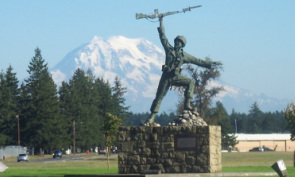 Fort Lewis, Wash. Fort Lewis, Wash. JESSEN: We found out just before we left that Cristal was pregnant. That added even more stress to the deployment. It was terrible timing. CLIBURN: I was caught up in the excitement of the deployment, but it wasn't the best timing for me either, although for a far less legitimate reason. We reported to Fort Lewis during the first week of football season . . . and we were from Oklahoma. We had no TV and no Internet. Missing football season . . . that was the true sacrifice. LEAL: Yeah, but it wasn't a good season for OU anyway. CLIBURN: True. We were outside the chow hall at Fort Lewis when we realized that TCU was going to beat OU . . . in Norman, breaking OU's consecutive home victory streak. Then we went back to the lovely barracks. FINCH: Those barracks were a joke. Washington was cold all the damn time, but I still cracked the door open and left the fan on every night. It just got so hot in those barracks, and we were on the second floor. CLIBURN: My cousin was stationed at Fort Lewis at the time. I took her back to see our barracks, and she couldn't believe we were housed there. I think they were scheduled for demolition before the wars started. Then they were used to house National Guard or Reserve soldiers training to deploy. FITZGERALD: I really liked Fort Lewis. I lived there as a kid because my dad was stationed there. Plus, I had been there several summers earlier with OCS, And all the leadership had gone up for a Leaders Recon a month prior to the main body mobilization. I enjoyed the weather there, liked the cool and wet. I remember competing with Big Baldwin to see who could go the longest without putting on our cold-weather PTs (physical training uniform). BALDWIN: I remember that. I'm pretty sure I won, too. It got pretty damn cold there, but I just couldn't let an officer look tougher than me. BROSH: Fort Lewis was beautiful . . . the first two weeks! After that I have never been to a more depressing place in my life. I knew after the three-month training period, we still had a whole year of being away from home. The weather was horrible and rained every day. BRALEY: Ah, the memories of Fort Lewis. I can honestly say the mock FOB security exercise we did at FOB Falcon was the most physically miserable I've ever been. We stayed out in the freezing rain for what seemed like a month guarding the base, beating back attackers, responding to security breaches. It doesn't sound nearly as bad as it was. We were all soaking wet, all the way to our socks. The freezing rain continued for hours and hours. We saw soldiers just give up and while others stepped up. CLIBURN: That night was definitely the most miserable I'd been, too. I remember taking solace in the fact we'd get a four-hour sleep cycle at some point. McKillip and I were doing our shift of tower guard and it was so damn cold. He and I tried staying warm by doing pushups, the side straddle hop (jumping jacks, for you civilians), anything to get the blood pumping. We even practiced drill and ceremony maneuvers. BRALEY: I wish I could remember the circumstances better, but at one point towards the end we were so punchy that we were laughing hysterically at one of the gates over something not normally that funny. I think it had something to do with a mouse. My brain was frozen. CLIBURN: Mine too. At some point, we looked out and a tent was on fire. We started laughing manically at the dumbass who had set his tent on fire. Then, when it was time for our sleep cycle, we got to the tent and realized it was First Platoon's tent that was on fire . . . so our sleep cycle consisted of shivering on a cot with no heat in a drafty tent for four hours. At that point, everything was so miserable it was funny. It still is when I look back on it. DUFFY: Like I said, Henderson was the only Second Platoon guy I knew before the mission, and I barely knew him. We literally slept next to each other in the barracks, so we talked often. It was weird at first; Henderson knew my wife (now ex-wife) because he was active-duty with her ex-husband. But we got over that awkwardness, and we made quick friends at Fort Lewis. CLIBURN: I remember feeling bad for Duffy because he got stuck with people he didn't know. At least I was going to war with guys I'd known for years. But that changed after we got to Fort Lewis. Duffy didn't seem upset at all with his placement. DUFFY: I was crushed when I found out I was in Second Platoon. I was in Bravo Battery the entire time I was in the 158. I knew very few people from Alpha Battery, and they primarily made up Second Platoon. However, as is the case in most military situations, you adapt and overcome. It didn’t take long to make friends. It helped that SFC John Kaiser was the platoon sergeant. He came from Bravo Battery, too. He always said, “Once a buzzard, always a buzzard.” He reminded me many times at Fort Lewis that he had my back and enjoyed having me. The Wilkerson brothers made it easy, too. They were welcoming. I felt like a brother in no time at all. CLIBURN: Ah, the Wilkerson brothers. The Guard was unique like that. Our unit went overseas with three sets of brothers and two father-son combos. DUFFY: Yeah. That would only happen in the Guard. Anyway, soon I realized I'd struck gold. I watched First Platoon work late every night. They couldn’t have any beers at night. They never seemed to have fun. They never smiled. Their motto was, “First for a reason!" and they eventually added " . . . because we’re always last." The icing on the cake was my best buddy downrange, SPC Michael Smith. We recognized each other’s “cleanliness” and made sure to buddy up. Meeting him and becoming friends is just as important as getting involved in the OIL for me when it comes to that deployment. 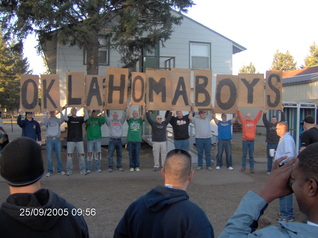 Second platoon's sign at Seahawks game. Second platoon's sign at Seahawks game. DUFFY: Second Platoon had a plan to get on the jumbotron: hold up signs that spelled out Oklahoma Boys. CLIBURN: That didn't work, did it? I just remember you pissing a lot of people off who were sitting behind you. DUFFY: Here’s the truth. I don’t remember anything from the game. I remember tailgating. I remember a fight after the game. I remember drinking until I couldn't feel feelings anymore. But my recollection of the actual game is zero. CLIBURN: I was a little jealous. Second Platoon seemed a lot more fun than First Platoon. We didn't have any signs to hold up, and we never seemed to have the same enthusiasm. DUFFY: You should have been jealous, too. Second Platoon trained hard, but we played hard too. It took a lot of the stress out of a very stressful time. 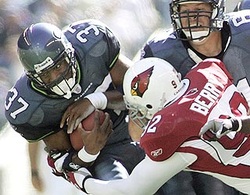 CLIBURN: In late September, the whole company went to the Seahawks/Cardinals game in Seattle. It was a welcomed break from training. DUFFY: That was when Shaun Alexander was running wild for Seattle. They went to the Super Bowl following that season. CLIBURN: And Arizona had Kurt Warner and Larry Fitzgerald. But they weren't very good yet, and they got trounced. 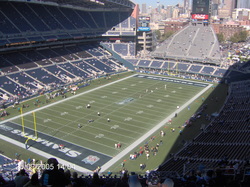 CLIBURN: I actually fell asleep at the game, which is a shame because it's the only game I saw start to finish while at Fort Lewis. I had a 13" TV with "bunny ears" in the barracks, but the reception was terrible and we were usually training every day. The only other game I saw was the last few minutes of the USC at Notre Dame game when Reggie Bush pushed Matt Leinart into the endzone to win the game for the Trojans. I remember the fight happening, but I wasn't around when it started and really never saw anything. FINCH: I remember it. It was after the game, and some Seahawks fan came at one of our guys talking shit about the Army. I don't know why he'd do that because he was greatly outnumbered, but he did. Then he threw a punch and got the shit beat out of him. And I remember that later there was an investigation into two of our soldiers sexually assaulting a local woman there, and they ultimately pleaded guilty or were convicted convicted of lesser charges. CLIBURN: That was a crazy time. It took a lot of courage for some of our soldiers to do the right thing and come forward about what they knew. I was proud of them; I still am. That's what I focus on: not the crime, but the response by our soldiers. Of course, there's plenty we did at Fort Lewis that no one is proud of, but no harm, no foul. FINCH: Yeah. Another night, some guys crashed a rental car into a fence there on North Fort Lewis. I still won't say who was responsible, because it's all water under the bridge now, but it really was a crazy time. CLIBURN: Yeah. We had a lot of fun there because we had this fatalistic attitude about everything. For all we knew, we'd die in Iraq, so why not have fun? But even then we spent most weekends goofing off and posing for photos. There really wasn't much else to do there without a car. BRUESCH: I didn't mind the rain. Fort Lewis was a cool place. I loved the area and got to do a little more sightseeing than most because I had family up there. I have an uncle that lives up there, and I got to spend time with him as well. I really made the most of our time there, and I took the training seriously because I was a squad leader. PYLE: The time we spent at Fort Lewis was pretty rewarding. I got to know soldiers I'd previously only said hello to or nodded to in the motor pool. I enjoyed getting to know the other soldiers of the 158. CLIBURN: I got to know everyone better, too. But that didn't always mean it made us closer. At first formation one morning, everyone seemed like their dog had just died. SFC Braley came out and said, "I know guys; it's horrible. I know what day it is, too. But we've got a job to do." I was confused. I sure as hell didn't know what day it was. If I was supposed to feel sad, I needed to know why. So I asked the guys to my left and right what I was missing. "Today's the start of deer season," they said simultaneously. I never realized that was such a big deal. And I wasn't sad. BRALEY: It was the deer opener and I was sad. It was one more reminder that normalcy was a long ways away. One of the reasons I am not a rabid football fan is that the season is during all of the good hunting seasons. I have no idea who played in what games while we were overseas. ell, I don’t know who played in what games this season. DUFFY: Our days pretty much started at 0500 and ended at 1700-1900 depending on what we were doing. Fortunately for us (Second Platoon) we could drink and decompress at night. It made the days easier to endure. Once those rights were taken away, it was horrible. I remember the first few days how beautiful everything was. It was short-lived. It started raining and never stopped. I remember doing PT (physical training) when every other unit on base was inside. We were doing push-ups, dipping our noses in the puddles. My PT clothes would be soaked. It made me ill to think about getting up each morning. The days were filled with training which made them go by quickly for the most part. DUFFY: My favorite part of training was riding everywhere in cattle cars. Second Platoon would sing our classic and inappropriate songs in unison. Our morale was at 110% at all times, and our spirits could not be broken. CLIBURN: That's very cute and inspiring and all, but it's also the first time I've heard anyone say they loved riding in cattle cars . . . ever. DUFFY: I always felt bad for my Bravo battle buddies suffering in First Platoon. Especially when they’d have to watch our highly-motivated platoon go out and kick ass in everything we did . . . while First Platoon struggled. CLIBURN: Hey, we didn't have as much fun as you guys, but we didn't struggle. First Platoon was nothing if not squared-away. SFC Mark Braley and 1LT Mark Fitzgerald made sure of that. Our only complaint was that we spent so much more time training than the other platoons with no (perceived, at least) measurable difference in outcome. So, at times, morale was low. But, looking back on it, our guys were probably whining a little too much. BRALEY: With the benefit of hindsight, there's not much I would change about how we trained. You are right about the training. And, while I would like to blame it all on Fitz, that would not be close to fair. I had the advantage of having been in a war before and, while intoxicating on one level, it was gruesome on another. I felt like discipline and training were the things that were going to bring the most soldiers home. I was willing to be the bad guy/hard ass that was constantly training. If someone were to be hurt or killed I wanted to know in my own mind that it was not because they had not been prepared for what lay ahead. I heard the bitching and I had an NCO from another platoon tell me that my guys were going to break and mutiny if I didn’t slow down. For the record, they never broke and were truly Hard Targets. Snake in the GrassThe soldiers spent a week in charge of a mock prison to learn detainee operations. At some point, the mock prisoners learned the unit was from Oklahoma. CLIBURN: What I remember about detainee operations is that guy chanting all week: "YOU A BITCH! TOBY KEITH, YOUR FATHER!" I guess Toby Keith was the only person they could think of from Oklahoma. DUFFY: And it didn't stop there. Like a good soldier maintaining accountability of his equipment, I had my name written on my gear. Often our stuff would end up in a giant pile and mixed up. This turned out to be a huge mistake during detainee ops. There was that guy, "Ranger Rick", or whatever they called him. He was the guy crazy enough to let us basically jump in while training on cell extractions. I admit, he was a rough SOB. Ranger Rick noticed my name written on my elbow pad. He walked by me, staring me down. Out of the corner of my eye I could see him still staring at me then suddenly he yelled, "Duffy!" I couldn't stop my head and eyes from snapping his direction after he yelled my name. Game on. For hours after that I was the topic of prisoner conversation. "Duffy is a bitch!" "Duffy is a piece of shit!" over and over and over. CLIBURN: They definitely tried to get under your skin, and "bitch" was their go-to word. I remember them calling Brosh "bitch hips" the whole time because of how he looked with his hands on his hips. Remember that, Brosh? BROSH: Yeah, that pissed me off . . . but it was kind of funny, too. I had to keep from laughing every time he said it. "Toby Keith's Your Father"BALDWIN: What I remember most about Fort Lewis was the "snake in the grass" video Crawford made. CLIBURN: It was after curfew and Finch was drunk and upset the night was over. We all were; he was just loud. FINCH: No, I was drunk, but I was upset because we'd come back for the curfew and others came back, got counted, and left to go out again. CLIBURN: Well, Crawford took out his video camera with night vision and filmed the whole episode, including Baldwin trying to talk Finch into going to bed. Every time Finch would walk close to Crawford's bunk, all you'd see was white as Crawford dropped the camera into his pillow. That's why we called him a snake in the grass. He was sneaky. BALDWIN: Yeah, I had to convince him to go to bed, especially since we'd woken up SFC Braley downstairs. CLIBURN: I just remember Finch saying, "it's not fair; it's . . . it's . . . it's prijidice." I still have that video on my computer somewhere. It just makes me happy no one whipped out a video camera on any of the number of occasions that I was drunk and uncooperative. FINCH: Yeah, then SFC Braley used Crawford's video to figure out what happened the next morning. DUFFY: I also remember ridiculous training aids. Tennis balls were supposed to be rocks? Neon green bombs flew around all day that were supposed to be aggressively thrown rocks. I had a hard time pretending. CLIBURN: Yeah, it seemed a bit ridiculous, but it worked. They upped our stress levels and made us lose our temper. DUFFY: Yeah, it did work. We "killed" a lot of people during that exercise. At least a dozen soldiers snapped and simulated shooting the prisoner(s). It made me think long and hard about what would happen down range. CLIBURN: It was a humbling experience. It reminded me of the Stanford prison experiment. Any of us could lose our humanity in the moment. It made me understand Abu Ghraib a lot more . . . not excuse it or approve of it, but understand it. One Last GoodbyeAfter checking all the boxes back at Fort Lewis, the soldiers were authorized to travel to Oklahoma for four days to see their families. It wasn't much, but they were thankful. They knew when they returned, they'd have two weeks of training at Yakima Training Center before flying across the pond. That was it. Two weeks. CLIBURN: I don't even remember what I did back in Oklahoma over those four days. I just remember they flew by and were just long enough to remind you that you were homesick. DUFFY: I didn't fly back to Oklahoma during that four-day leave, My wife flew up to Fort Lewis instead. Somehow I managed to make a couple babies during that time. While we were downrange, my wife told me she was pregnant with twins. CLIBURN: I didn't make any babies. I mostly just made a fool of myself on the way back. We drank at every airport bar along the way. Then, when there were no more bars to go to, I tried chewing tobacco for the first time at Sea-Tac Airport. Big mistake. I vomited all over the bus while we waited for everyone else to show up. I still get ribbed about that. FINCH: I flew home to Oklahoma and proceeded to drink as much alcohol as possible. I really don't remember much of those four days, but I didn't go to jail so that was a plus. Then I got on a plane and drank my way back to Fort Lewis. Good times. HENDERSON: I went home and got married . . . big mistake, but that's a story for a later chapter. In November 2005, the 158 traveled east to Yakima, Wash. for two final weeks of training. Yakima was a snowy, desolate place in central Washington. The small camp was cold and boring, but it had an on-base restaurant and bar called The Oasis. The men spent whatever free time they could there, and that's where they ate Thanksgiving dinner. The Oasis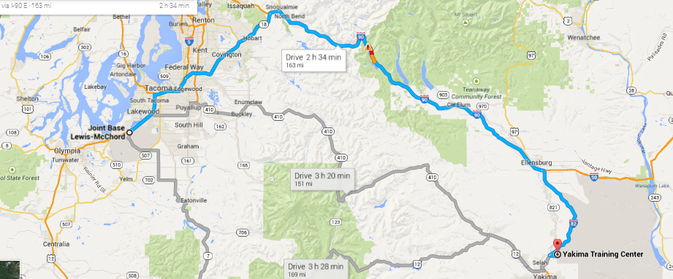 DUFFY: Yakima was beautiful in the winter. I enjoyed our living quarters there. I remember Smith getting me hooked on watching movies. I think I watched almost 30 movies in Yakima. The Oasis was epic. Yes, they had a “Hooters girl” but more importantly, they had the best breakfast burrito ever. 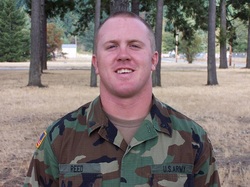 Nick Reed Nick Reed SPC NICK REED: I still talk about the huge breakfast burritos they had there. They were so big they'd last for breakfast and lunch. And I loved the night shoot of mounted gunnery at Yakima. I remember forgetting to ask after target was acquired about halfway through the night qualification shoot and just laying down on the trigger. LEAL: The size and quality of the breakfast burritos at Yakima really can't be understated. That's all I remember about Yakima. They were amazing. DUFFY: Yakima was weird. We got banned from playing basketball because somebody twisted an ankle or something. Yet, somehow we we were allowed to play a unit football game in the ice and snow. Yakima, in my opinion, was a much better experience than Fort Lewis (and certainly better than Fort Sill), and I wouldn't have minded doing the whole mobilization there. FINCH: What are you talking about? Yakima was the low point of the mission. It was brutally cold, there was nowhere to go in our off-time, and our living quarters were even more cramped than at Fort Lewis. BRALEY: Yakima was lovely . . . if you were a lizard. I did think the live fire convoy lane was great training. And, anytime I get to shoot something, I am happy. For being a desert, it sure snowed a lot there. BROSH: Yakima was definitely worse than Fort Lewis. I have never been in a colder, more desolate place in my life, and I’ve been in some sad places! FINCH: Yeah. I hated that place, but I did get to see Little Baldwin throw up all over Big Baldwin's boots. It was Lil B's 21st birthday and he went too hard down at The Oasis. YANCY BALDWIN: Man, he did puke all over my stuff. It was horrible. CLIBURN: He did . . . a lot. I came back from The Oasis and saw Crawford cleaning up the puke while other guys helped Lil B get hydrated and find his bunk. It's a good thing guys were there to look out for him though because it was ungodly cold outside and it wouldn't be crazy for Lil B to go off wandering and get hypothermia. FINCH: It was miserable those last few nights, but we got make a snow man. That was cool. CLIBURN: Those photos really don't accurately represent how cold it was there. It was miserable . . . and we were training to go to Iraq. It didn't make any sense. DUFFY: Second Platoon seemed to do a better job of making lemons out of lemonade. We had a football game in the snow at Yakima and loved it. I caught two interceptions, and immediately slipped and fell on my ass both times. I think we played Hooligans versus Muscle-Heads at first, but then it became Second Platoon versus Third Platoon. This was the most interaction I’d had with the Third Platoon guys to that point, and it was a blast. HENDERSON: It was cold . . . God awful cold. The only cold I've ever experienced like that was in Korea. But except for that it was awesome. That football game was something so simple yet so monumental in terms of building camaraderie and esprit de corp. That was when we started becoming a unit, a team, a family. REED: I remember running for two touchdowns and throwing for another during that game. Our team was crazy athletic. I remember winning big at the first Turkey Bowl. In fact, I think Hillier caught the one I threw. 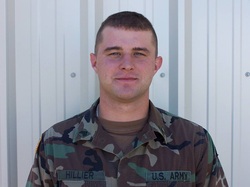 Thomas Hillier Thomas Hillier SGT THOMAS HILLIER: I do remember the snowy football game at Yakima. I'm not sure I remember catching any touchdowns that day. But, if it makes me look good . . . yessir I caught that touchdown! I really have a bad memory though. Ask my wife. She'll confirm it. REED: Well, you did catch a touchdown, so go ahead and brag about it. Trust me. I wouldn't steer you wrong. HILLIER: Damn right, I scored a touchdown. 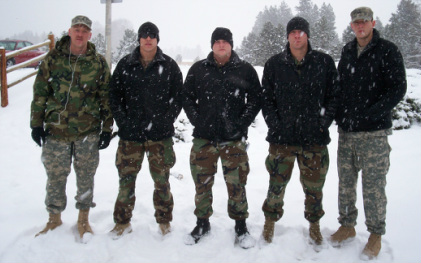 Aaron Helton; Wesley Parra; Justin Finch; Yancy Baldwin; Stephen Brosh Aaron Helton; Wesley Parra; Justin Finch; Yancy Baldwin; Stephen Brosh FINCH: Like I said, I hated Fort Lewis. But I hated Yakima more. I was so glad to leave that place. Before we got on the bus to head back west, some of us took a last photo there in the snow. We were so happy to be leaving that place. CLIBURN: I remember that photo. A part of me wanted to memorialize the day with a photo, too. But it was too damn cold, so I just stayed on the bus. In hindsight, I wish I'd gotten off the bus and taken a photo. I don't think I have any photos of myself at Yakima. Wheels UpThe soldiers returned from Yakima in December 2005. And, after packing their duffels and cleaning the barracks, the 158 soon after started their journey from Joint Base McCord-Lewis, Wash. to Camp Buehring, Kuwait with stops in Maine, Ireland, and Hungary along the way. FINCH: I was glad to leave Washington. I hated it and all the liberal hippie assholes who lived there. I got tired of training every day and then going off base and seeing protests. CLIBURN: I loved Washington, and I wasn't offended by the protests. As far as I was concerned, they were protesting the war . . . not the warriors. Does that make me a liberal hippie asshole? 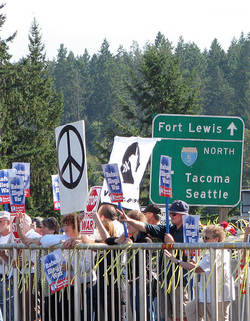 FINCH: Yes, it does. And you should move there if you liked it so much, C-Burn. CLIBURN: Hey, I would if I could afford it. Trust me; I've looked into it. I may be a liberal hippie asshole, but I'm not a liberal hippie asshole with money. LEAL: I'm with Brick. I loved Fort Lewis. It was beautiful there. I didn't love the protesters, but we barely ever saw them. FINCH: That time pisses me off just thinking about it. Anyways, I was glad to get on the plane and start the journey over there. CLIBURN: Before our plane took off, they told us we couldn't use any tobacco in the air or we'd get sick. An hour or two into the flight, Joshua Lynn told me to look at Coleman: "Look at him. They told him not to use snuff and now he's sick, serves him right." Then the plane landed at Bangor, Maine and paramedics were ready to take Coleman away. Apparently he had appendicitis and needed emergency surgery. Lynn and I felt like dicks, but Coleman caught up with us several months later. COLEMAN: All I remember about that flight is how much pain I was in. It was horrible. I ended up convalescing back at Fort Lewis until I was healthy enough join the guys in country. CLIBURN: I blame it on the gin Crawford and I smuggled onto the flight. We legitimately believed it would be our last opportunity to drink alcohol for a year (it wasn't), so we took advantage. Boots on the GroundThe company spent two weeks in Kuwait acclimatizing. Camp Buehring was crowded, and the men spent most of their time there waiting. But, before they moved on, they spent a few final days training for the mission ahead. The training area was away from Camp Buehring, out in the desert somewhere. It was their first experience with the desert of the Middle East. It's also where they saw their first camels and their first Bedouin people. CLIBURN: When we arrived at the Kuwait City Airport, we were immediately put on buses heading towards Camp Buehring. It was late at night, and the bus windows were covered in curtains. "Keep the curtains drawn," they said, "in case of snipers." DUFFY: That was such BS. There were no snipers in Kuwait . . . certainly not any that could hit a target moving at 50 mph . . . in the dark. CLIBURN: I know. But I was too tired to look out the window . . . too tired to strain my eyes just to make out the sand dunes. Instead I leaned my head against the window and listened to Talib Kweli's "Beautiful Struggle" on repeat the whole way there: "The revolution's here No one can lead you off your path You'll try to change the world So please excuse me while I laugh (yeah) No one can change your ways (rock with me for a second) No one can lead you off your path (come on) You'll try to change the world So please excuse me while I laugh" CLIBURN: I didn't intend to listen to that song on and on. It just came on my mp3 player as we left the airport and struck a chord. I couldn't stop listening to it. I was a believer at the time. I thought I was going there to help people, to help change the world in a small way. But I doubted myself and my capabilities, and it all seemed laughable when I considered the big picture: what could I really do? It felt like I was kidding myself; it felt like we all were. FINCH: Buehring was boring as hell. We were all in an extremely crowded tent with nothing to do and nowhere to go. We mostly slept or played cards while we waited to head to Iraq. 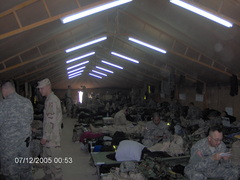 CLIBURN: Everything was too crowded there. Buehring was a base for soldiers transitioning into and out of Iraq. When we were there, an entire division was leaving Iraq while another entire division was heading to Iraq. And they were all housed at Buehring at the same time. Going to the PX or phone center took hours. Everything did. DUFFY: Yeah. They had Internet cafes, but you had to wait in line for hours to get into them. If Iraq was supposed to be military hell, Kuwait was military purgatory. CLIBURN: That's the perfect way to describe it. There was nothing to do but sleep, play cards and read. But I was surprised by the availability and quality of the Stars and Stripes newspaper. DUFFY: It really was a quality, independent newspaper. I was surprised too. I made sure to read it every day. CLIBURN: Me too. That's how I realized our sister unit in 2003 (the South Dakota Army National Guard unit) was on the same deployment schedule as us. Sadly, I only knew it because, their first week on the road, an IED killed two of their soldiers: SSG Daniel Cuka and SFC Richard Schild. They were based out of al Rustamiyah, patrolling the most dangerous route in Baghdad: Route Pluto. BRALEY: As we got ready to head into Iraq, I did feel some pressure and that started before we hit the sand. I had the same concerns every other platoon sergeant and lieutenant had. I did not want to make a mistake or a poor decision that could get my guys hurt. Though some may dispute it, I truly cared for each one of my soldiers. I did not party with them or hang out a lot on our off time. They needed time away from me and I also worried that if I was too close to them it may affect my judgment if it became necessary to send them in harm’s way. They had that opportunity and excelled. Wake Up Call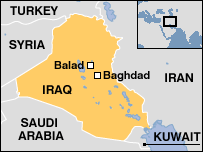 Then, in late December 2005, they boarded a plane bound for LSA Anaconda, near Balad (40 miles north of Baghdad). When they finally got there, after hours of waiting for the plane at an undisclosed Kuwaiti air base, they were going on a full day without sleep. They were immediately shuffled into a large tent behind a sea of T-walls for a welcoming brief. Each soldier took a seat and hoped to stay awake as they realized the brief was being given in PowerPoint form. But it didn't take long for the soldiers to wake up. CLIBURN: What sticks with me from that brief is how concerned they were with us knowing the EFP threat . . . what they were; how deadly they were; and where they were detonating: up and down Route Pluto and our prescribed route on MSR Tampa. DUFFY: I vaguely remember that briefing. We were all dead-tired when we heard it though. What I remember most is they seemed legitimately surprised that we had heard of EFPs, as if it were top secret information. CLIBURN: True. But they seemed more surprised that we thought the humvee armor would protect against us. After they recited how many deaths were attributed to EFPs in the previous months, one of our guys raised his hand to ask the question we were all thinking: "Wait, aren't our armored humvees going to protect us from this?" No, they answered, because the EFPs would melt through the armor. FITZGERALD: That EFP briefing was especially eye-opening. I hadn’t been briefed about that particular wicked instrument of war until that day. I already felt a lot of pressure leading a platoon into Iraq, but I really didn’t know what I was getting into. I was reading a lot of military history at the time, specifically company-level and below accounts of Vietnam, Korea and World War II. I knew what we were getting into was so totally different from that, but that's really all I knew. DUFFY: It was a legitimate question. All through training, we were assured: "Don't worry. Yes, there are a lot of IEDs over there, but the up-armored humvees will protect you." 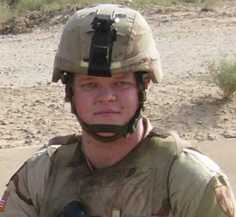 SPC Ryan Montgomery, KIA 7-3-2005 SPC Ryan Montgomery, KIA 7-3-2005 CLIBURN: I felt lied to. I knew we were going to war and it was dangerous. I accepted that. I was prepared for that. I didn't want or need anyone blowing smoke up my ass, but they did. And I felt stupid for buying into it. DUFFY: Especially once we fell in on the Kentucky Army National Guard we replaced. They had already lost a soldier to an EFP, and I knew him. We went to basic training together, and he slept directly across from me in the barracks. His name was SPC Ryan Montgomery and he died in July 2005, just after we left Camp Gruber. CLIBURN: And the humvee armor wasn't exactly immune to less sophisticated explosive devices. They'd lost other two guys to IEDs by the time we replaced them in December: SGT Jonathan "Adam" Hughes and SGT Eric Lee Toth. DUFFY: Yeah. It wasn't very encouraging knowing all that. Montgomery stung though because I actually knew him at one point. CLIBURN: The military really is a small world. We both had connections to that unit. Timothy Bertram, who went to basic training with Brosh and me, was a sergeant and team leader in that Kentucky Army National Guard unit. BROSH: He was my assigned Battle Buddy in basic, and we went to AIT (Advanced Individual Training) together as well. The three of us were close and stayed in touch afterwards. And Cliburn ended up being my roommate in Iraq. CLIBURN: Bertram was Montgomery's team leader, and Montgomery was his gunner. I remember talking to Bertram on instant messenger one day in summer of 2005 after Montgomery was killed. He was crushed. It was about that time we connected the dots and realized my Oklahoma Army National Guard unit would be replacing his Kentucky Army National Guard unit in Iraq. Crazy. BROSH: Once we realized that, I was really excited to see Bertram. We hadn't seen each other in four years, since we left AIT at Fort Sill. CLIBURN: Once we finally got to Anaconda and were taken to "Tent City," we all hit the cots to get some rest. I had no idea what time it was, but Bertram woke me up. We got Brosh and he gave us a tour of the base in his humvee. It was weird seeing him again . . . in that location. 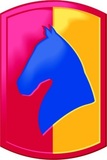 1st Bn 623 FA, Kentucky 1st Bn 623 FA, Kentucky SGT TIMOTHY BERTRAM: I loved seeing you and Brosh again, but I hated that you were taking over our mission. It was a dangerous mission; we'd lost several men by then, including Montgomery. I never knew you had a guy in your unit who was that close to him. I'll never forget that day, and the EFP that killed him will affect me the rest of my life. I'll never look at trash on the side of the road, nor small cylindrical-shaped objects, the same after that . . . But, wow. Three really close friends from basic training get reunited in a combat zone . . . then I find out one of your guys was close to Montgomery. Wow. Small world, indeed. CLIBURN: I know what you mean. But, we always said we'd meet up again, and we finally did. Welcome to IraqAfter a long first day of nothing but endless briefings, the soldiers went back to their temporary housing at Tent City and were welcomed by a bevy of mortars. This really is Iraq, they thought. BERTRAM: I remember that. We had just dropped off some of your guys who had done some "right seat riding" with us. Right as we dropped them off, the mortar struck the tents next to where you guys lived at the time. It didn't seem to do much damage on the outside . . . but inside was a different story. That was just your second day there, too. CLIBURN: Technically, it was our first day. We hadn't even been there 24 hours by that point. 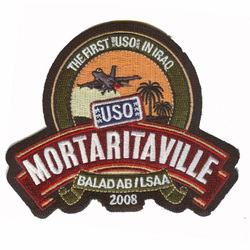 FINCH: The mortars landed just a few tents away and injured eight or nine soldiers from a different unit. It was intense. JESSEN: And that was just the first day. CLIBURN: I remember all of us in the bunker laughing about it. It felt so unreal it was funny. LYNN: I felt kind of embarassed immediately afterwards. People that had been at the camp for a while were looking at us kind of strange after that 100m dash to the bunkers. They seemed to be not at all concerned; an attitude that most of developed after a few weeks. NEELY: That alarmed me. I wasn't afraid of it, but rather, I thought a tent is not the best place to hide from a mortar. I found it hard to believe the U.S. Army couldn't find and kill these random al-Qaeda mortar teams that were constantly lobbing shots over the walls. But, at Balad, it just seemed like something you lived with. I was in disbelief. As a commander, all I could think of as we settled in to Iraq was whether there was anything else we could have done to prepare ourselves to survive the fight. I'm not sure what we could have done to prepare for random mortars though. BRALEY: I expected the mortars. It was the theater, swimming pool, and fast food restaurants that startled me. I don’t even recall the EFP briefing. I am sure that I chalked it up to just one more thing in the country that could kill you. FITZGERALD: The mortars on the first day were quite a welcome, but the mortar attack that SFC Braley and I experienced about three weeks after our arrival is the one that endures in my mind. BRALEY: 1LT Fitzgerald and I were heading back to our hooches in Balad when the incoming sirens went off. We ducked into a shelter. Then he commented that we'd heard the sirens before, but the rounds were never close. Apparently that statement was a magnet for metal. The explosion was close and a California First Sergeant went down while running. The reflective belt he was wearing did him no good. He lost both eyes, but survived. I did some research after we returned and learned that he had been promoted to Sgt. Maj. and was a medical and wounded liaison. DUFFY: Second Platoon was already in Baghdad by then. As soon as we got there, we were told our mission had changed and we were to go to Baghdad until we heard further. We heard about the close call with the mortars later. FINCH: I loved Anaconda. There was a movie theater and swimming pool there leftover from its old Iraqi Air Force days. The chow was good, and the streets were paved. We had a lot of fun there. BROSH: Yeah. We had really large rooms there. And I had one to myself, which I thought was unfair because other guys were older than me, but I took it. CLIBURN: My room was Little Baldwin, Finch, and me. And we had plenty of room. It was nice. BRUESCH: Balad was a surprise. I thought we would be roughing it in country but, like Finch said, there was a movie theater and swimming pool 200 yards from where I slept. That wasn't bad at all. CLIBURN: What I remember most about those early days at Anaconda though wasn't the mortars or amenities. It was seeing other soldiers who'd been there a long time and how they were coping. My first few days there, I was at the phone bank waiting to call my folks when I heard a guy on the phone start screaming: "I'll burn that fucking house to the ground before I let you and him sleep together in that house! Do you hear me?! To the fucking ground! How could you do this to me?! Fuck you, you fucking bitch!" CLIBURN: He then slammed the phone three times against the wall and stormed off, leaving the phone swinging from its cord. Then, the next guy in line calmly walked over, hung up the phone, picked up the receiver and started dialing his own family. And that wasn't the last time something like that happened. It repeated itself throughout the deployment and made me feel really lucky I wasn't married. BRALEY: Balad was great fun right up until the time you guys went to the range and burned up $100,000 in ammo on one old building. Perhaps the term test fire was not properly defined. I think my bosses and creative resupply saved my bacon on that one. The videos were cool though. If I recall, checkpoint 59A was irritating, but other than that it wasn’t a bad mission. CLIBURN: As an editor's note, I love that SFC Braley referred to checkpoint 59A as "irritating." Checkpoint 59A was a location on MSR Tampa (the main four-lane highway between Baghdad and Balad) defined by two, very large and thick groves of palm trees. It served as perfect cover and concealment for the enemy. In our first few weeks at Balad, one squad was ambushed there and another hit with an IED there. And the Kentucky guys routinely told us it was the most dangerous location on Tampa. "Irritating" is such a classic military understatement that I actually laughed when I read it. "Show Me Your War Face"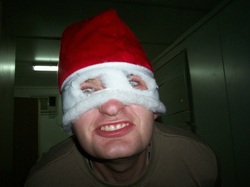 Cliburn, LSA Anaconda, Christmas 2005. Cliburn, LSA Anaconda, Christmas 2005. BALDWIN: Do you remember the Santa hats we found at Anaconda? CLIBURN: I do remember that. But where did we find them? FINCH: I don't remember where we found them, but I remember you cutting eye holes in one and showing us your "war face." BALDWIN: That was hilarious. He had the absolute worst war face, too. CLIBURN: Hey, I wasn't the only one who got into the Christmas spirit. Finch, Baldwin, and Parra all took turns looking creepily-jolly too. FINCH: We all had fun with it. That was a fun time. We were in country, but we hadn't really taken over missions from the Kentucky unit yet. We were all in the same platoon still, and had plenty of time to kill. CLIBURN: I seem to remember Finch finding a pair of pink hot pants and taking photos with them. That was a lot funnier than me with a funky Christmas hat. 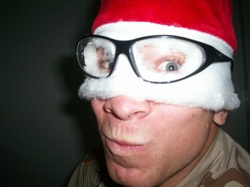 Baldwin Baldwin BALDWIN: And those trailers were pretty damn big. Life wasn't bad at Anaconda. CLIBURN: Not at all. Finch, little Baldwin and I shared a pretty large trailer there. It was close to the Post Exchange and just about everything else. Life was good . . . at least as long as we weren't running missions. BALDWIN: And our missions were sporadic while the leadership got settled in and kept getting mixed signals from their leadership as to what we would be doing and where. 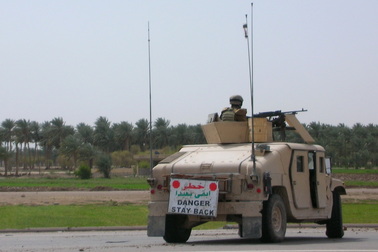 JESSEN: When we did finally start running missions, most of us did MSR patrol based out of Anaconda. CLIBURN: That was a dangerous mission. The Kentucky Army National Guard unit we replaced lost two soldiers and had over 20 injuries doing that mission. The days were long, and it was easy to become complacent. JESSEN: Yeah, but that only lasted a few weeks before our mission changed and we all went to Baghdad. No one knew what we'd be doing down there, but we hoped it'd be better than MSR patrol. BRUESCH: My squad was on mission there. We went out about 10 times doing route security. I was starting to figure things out when we were taken off mission. Even though we only did 10 missions while we were there, we did have an IED detonate on us there. I remember seeing a kid pick up a phone as we went by, and 30 seconds, later boom! But, no damage; no injury. We were lucky. 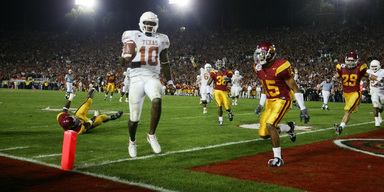 CLIBURN: My favorite memory at Anaconda was waking up at zero-dark-thirty to watch the Texas-USC Rose Bowl on AFN. BROSH: It was you, me, Finch and Little Baldwin, if I remember right. It was a hell of a game. FINCH: That was the first time I rooted for Texas. CLIBURN: I know. We're from Oklahoma, but we had to root for the Big XII . . . and nobody liked USC anyway. It was a hell of a game, too. FINCH: And, when it was over, we walked down to the motor pool to start our day like it never happened. CLIBURN: Yeah, everything felt normal until then. I forgot I was in Iraq for those few hours. REED: I didn't root for Texas. I hated that football season simply because Texas won . . . and I hate Texas. We couldn't get SSG Hodge (who was from Houston) to shut up about it. I spent a lot of my free-time on that mission playing NCAA Football 2006 on PlayStation2 with Baldwin and Finch . . . trying to erase the memory of a Texas national championship. The More Things Change . . . The mission changed again shortly after the soldiers hit Balad. The 158 was attached to the California Army National Guard's 49th Military Police brigade. Gone was the company-level mission, as each squad was split up and assigned new tasks. The majority of the company ended up at Camp Liberty in Baghdad but others were sent elsewhere. Each squad had a different job, and it no longer felt like the company shared a common mission other than staying alive. BRALEY: As with all soldiers, the way it is sucks and change is bad. I was comfortable with the mission and did not want to swap. I definitely did not want my platoon split up. But orders are orders, and we adapted. NEELY: The mission at Balad was one certain to result in fatalities; the odds were against us. I was only in country six days before my convoy got ambushed at checkpoint 59-Alpha. That opened my eyes: this was the wild west and they were out to kill us. I realized that every day we must prepare for the worst. If it could happen to me, it was surely going to happen to my men over the next year. But we didn't have a choice. That was our mission, and we were going to execute it to the best of our abilities. So I was glad when our mission changed from escorting convoys up and down MSR Tampa to PSD in Baghdad. I felt relieved because now, I thought, we could at least better control our missions and the execution of them. FITZGERALD: The mission at Balad would have relegated me to a supporting role as the squad leaders ran their squads as mission dictated. The eventual mission shift for the whole company and then the follow-on mission for us at Delta required me to be more operational daily, which suited me. So, in that sense, I was happy with the change. BRUESCH: We had just finished our RIP (Relief in Place) the day they pulled us off mission. I remember thinking how bad that must have sucked for the guys we were supposed to be relieving. They had a big party planned for that night, but, instead, they went back on the road. The day we left Balad, they loaded us down with gear, put us in our own HMMWV's and drove us to Camp Liberty. They dropped us off in the middle of the night and drove off. We were there all by ourselves, and I was the highest-ranking soldier. I was nervous. We lived in a tent for two or three weeks with no leadership around while we waited to figure out what we'd be doing. CLIBURN: We spent a few weeks transitioning the company from Anaconda to Liberty. My cobbled-together squad spent a lot of that time transporting supplies to the Second and Third Platoon guys who were already at Camp Liberty. My team then was SGT Brosh, SPC Finch, and me. We also escorted our leadership to Camp Rustamiyah on Baghdad's east side for command meetings with the MP battalion. BALDWIN: On one of those trips to Rustamiyah, I got my ass chewed by a Sgt. Maj. because the Kentucky unit had removed the 'D' from the "DANGER: STAY BACK" sign on the back of the humvee. CLIBURN: I remember that. We were driving around with a sign that said "ANGER: STAY BACK" instead. I thought it was pretty funny. BALDWIN: Yeah, well the Sgt. Maj. sure didn't . . . and we weren't even the ones who'd done it! It was only the first or second time we'd gone outside the wire alone, too. CLIBURN: I know. That was the first indication of the dog and pony show to come that year. Then, on the way back from one of those missions in early January, my squad hit with our first IED at the infamous checkpoint 59-Alpha. FINCH: We were heading north on MSR Tampa when it happened. I was gunning in an ASV and scanning the east side of the road when I heard (and felt) the loudest explosion I'd ever heard. 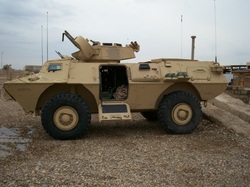 M1117 Armored Security Vehicle M1117 Armored Security Vehicle CLIBURN: I was driving when it happened. I flipped a switch in the cab to turn on the fan compressor right as it happened. My first thought was, "Holy shit; the compressor blew!" But I knew it couldn't be that. It almost blew our 15-ton ASV off the road, and it was LOUD. FINCH: Just as I heard and felt the boom my view through the turret's scope went brown. It took me a few seconds to realize it, but we'd been hit by an IED. The ballistic windows were webbed by the blast, and the humvee to our rear took damage. After the explosion my whole body was tingling. But the most surprising reaction I remember was my tongue actually tickled. It was crazy. CLIBURN: Brosh immediately pulled out my 3.2 megapixel camera and started filming our reaction. I still have that video file, and that's still the most elated I've ever felt . . . in the seconds after that first IED went off . . . realizing I was okay. BROSH: What makes me mad is that I had just put the camera down when it happened. I was filming our route of travel as we left Liberty and drove through Baghdad north onto MSR Tampa. Once we were on Tampa for a while, I turned it off because it just a four-lane divided highway . . . and then "boom!" CLIBURN: The first thing Brosh said on the video after was "we just got hit by an IED!" in his Oklahoma twang. It's funny seeing the video now. We were all so happy and excited. 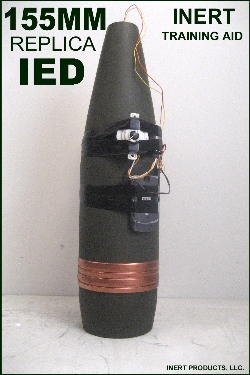 FINCH: Since no vehicles were disabled, we kept trucking north for a bit. We were caught up in the excitement of it all and forgot all our post-IED procedures for a moment. CLIBURN: But then we doubled back to cordon off the area and call EOD (Explosive Ordnance Disposal). They did an investigation and determined some guy was lying in the bushes waiting for us. The IED was a 155 mm howitzer round. Thankfully, it was positioned parallel with the road. If it was perpendicular to the road, the damage would have been much worse FINCH: We were also lucky that it went off between our vehicle and the humvee behind us. It wasn't a direct hit. CLIBURN: It just felt like it. When we got back to Anaconda, we all had to submit written statements documenting what happened. Mine said that, after we cordoned off the area and allowed EOD to conduct their investigation, we retreated back to Anaconda. I labored over the word retreat because it sounded bad, but I couldn't think of another word at the moment . . . and I'd left my thesaurus back in Oklahoma. So I went with retreat and turned the statement in to Lt. Fitz for him to type up. FITZGERALD: I couldn't believe that when I read it. CLIBURN: Hey, cut me some slack. Like I said, I didn't have a thesaurus and I couldn't think of another word. I'd just been bombed and may have been a little preoccupied. FITZGERALD: Well, I made sure to edit that word out. You didn't retreat. You secured the area and then, after EOD did their investigation, you trucked on back to your destination. Big difference. CLIBURN: I know. I was glad you were level-headed enough to make the switch. I was apparently in too much shock to find the right words. It was shortly after that the company headed to Baghdad. Then, almost immediately, you and the other First Platoon guys headed south, and my squad was piecemealed out to other platoons. The mission change split up First Platoon, and I wasn't happy about it. When I first got to Camp Liberty, I ran into SSG Daryl Taylor of Third Platoon. He said the mission was going to be different for us now. A week earlier, he said one of the squads had to help Iraqi police retrieve dead bodies from a sewage drain or something. He described it in detail and seemed upset by it. But then he shook it off and drove on. Everybody did. So that's what I had on my mind as the mission changed. FITZGERALD: And the mission change happened quickly. I just remember Second Platoon packing up and heading south to Baghdad within a couple of days of the notice. I remember moving the rest of the company to Baghdad, trying to get all our trucks, gear and guys there. Then we split up into two convoys, which kept me busy until we pulled out. As soon as we got unloaded and set up at Baghdad, I found out the decision had been made to split up my platoon and platoon leadership team between Camp Delta and Camp Echo. I couldn’t find out much about Delta ahead of time. Internet searches only pulled up Camp Delta at Guantanamo Bay and the Brigade S2 (intelligence officer) had nothing to tell me . . . literally nothing about the camp or the route we'd take to get there. So, we put together a convoy to get a plussed up squad to Delta and hit the road headed south to Al Kut and Camp Delta. It felt like we were flying blind, but we made it there. 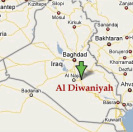 JESSEN: I was in that convoy. My squad was sent to Camp Echo, near Diwaniyah. It was a small outpost that we had to build up ourselves. Another squad was sent further east to Camp Delta, near al Kut. Our job was to train Iraqi police in those areas. FITZGERALD: I was in the group sent to Camp Delta. It was near the Iranian border and hours away from Baghdad. We ended up being both PSD for a couple of Guardsmen from Virginia (MAJ Jose Lugo and MSG Ed Balz) and trainers for the Provincial Police. Those two had the mission as the head trainers for the Provincial Police in Al Kut. We transported them from Camp Delta to Al Kut to work on improving police readiness and reaction. Several of us in the squad also did double duty by being assigned individual sections of the PSMR (Police Station Monthly Report). Our goal was to make that thing turn Green: have them to a trained level. Camp Delta was really the frontier. There were no creature comforts when we first got there: no internet for us to use; no phones; no finance; no mail; no Post Exchange. There was a chow hall and a gym and a lot of coalition troops. Poland was in charge of the camp with a strong presence, and Ukraine also had a sizable force. El Salvador and Armenia also had troops there. We were never sure what those other countries did. The Ukrainians did have some overlap with us on police training in town. That made it interesting having interpreters that spoke Arabic, English and Russian. BRALEY: I went to scenic Diwaniyah with a heavy squad to train and supply the provincial police. I had unrealistic expectations of the police and culture. Corruption was a way of life and it held no stigma for the police, citizens, contractors, and possibly some members of the allied coalition. My counterpart was a police general who better understood the situation than I did. He once told me that Iraq would be ready for democracy in 100 years, but it would not happen in his lifetime. The soldiers on that mission did an incredible job considering the obstacles they had to overcome. We did have the opportunity to run some good missions with the Navy EOD and the local SF unit. 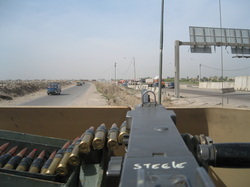 View from the gunner's hatch. View from the gunner's hatch. CLIBURN: PSD and police training became our squad too. But we were at Camp Liberty in Baghdad. SSG Bruesch was my new squad leader. It was a Third Platoon squad, and I didn't know those guys until all the platoons got mixed up at Liberty. It was an adjustment, but I actually enjoyed riding into Baghdad every day. I was a gunner, and standing up from the hatch at 60 mph felt incredible in the Iraqi heat. FITZGERALD: Since we went out nearly every day, I we operated really well together as a squad. Everyone knew their role and assignment and made it happen. I did learn about some things years later that the guys got into that I was unaware of at the time . . . but those stories are for a reunion, not for this setting. CLIBURN: That's probably best. Soldiers are a crafty bunch. We always find a way to make the best of a bad situation . . . but they're not always approved by the leadership. DUFFY: I did PSD (personnel security detail) for the 49th MP Brigade's S2 (intelligence). I was a driver for the lead vehicle in the group. We were a soup sandwich as far as traditional convoys went because our squad's lowest-ranking guy was an E-4. My team was three E-5s. Trying to figure out who was in charge was like reciting "Who's on first?" FINCH: I was First Platoon like Cliburn. After Balad, our platoon got split up, but I wasn't one of the guys that went to Diwaniyah or al Kut. Instead, when we got to Baghdad, I was thrown into SGT Neil Dolder's squad. It was a Third Platoon squad, and we did PSD, too. But I was roommates with Yancy Baldwin, another Bravo guy from way back. CLIBURN: I sure didn't like getting assigned to a Third Platoon squad. I didn't know anyone in it, and I didn't spend any time training with them. I hated that our platoon was the one that got split up and parceled out. FINCH: That's how I felt, but Pyle was in that squad with me. That's how I got to know him. And I was assigned Baldwin as my roommate, so I was reunited with a First Platoon guy. CLIBURN: In hindsight, it wasn't a big deal. SGT Stephen Brosh and I were in the same squad from the first day of Fort Lewis throughout the mission. He and I were roommates in Baghdad and went to basic training and AIT together, too. After I got moved into SSG Bruesch's gun truck, I got to know him really well. We became pretty close and still are. But, at the time, I didn't like all the moving around. I was happy to find some stability. 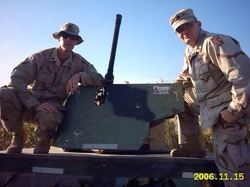 SSG Bruesch and SPC Cliburn SSG Bruesch and SPC Cliburn BRUESCH: And our mission at Liberty was pretty intense. There were days where there would be 50 SIGACTS (Significant Acts, e.g. bombings; attacks) in Baghdad . . . soldiers not making it home every day. I truly believe God protected us and kept us safe. CLIBURN: It's a cruel God who picks and chooses who lives and who dies. BRUESCH: It depends on what your purpose is. CLIBURN: That's where we disagreed then and where we still disagree. Every time we had a prayer before we left the motor pool, I just envisioned our enemies somewhere in Baghdad having their own group prayer, praying for God's protection. BRUESCH: You gotta have faith, man. CLIBURN: I know; I know. But I didn't. At least I stood there in silence though. Whenever Cobb's squad prayed, he'd walk away and not participate. COBB: I just thought it was a waste of time. I used that time to do more productive things, things that might actually help us. HENDERSON: I was assigned to SSG Carman's squad. We were known as the cop squad because three of the seven squad members were law enforcement on the civilian side. DUFFY: We weren't cops, but a lot of our squad's missions felt like undercover police operations. My first mission was busting a U.S. Army private that was running a prostitution ring on our base using Iraqi women he'd recruited. It was crazy. SCHMIDT: I was rear truck leader/assistant squad leader in SSG Barron's squad. We were based at Camp Liberty, but drove all over the country doing PSD for the Colonel. Towards the end of the deployment I spent time as squad leader. Civil War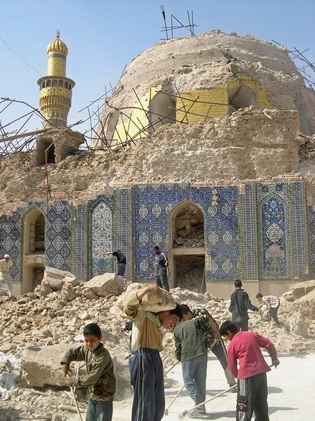 Iraqis clean the debris after the bombing. Iraqis clean the debris after the bombing. In February 2006, the al-Askari mosque was bombed. Everything changed after that. Before the bombing, everyone knew their role. The enemy were known as "insurgents" who attacked U.S. soldiers with the goal of the U.S. leaving Iraq. But, after the bombing, a new sectarian war emerged where different groups settled old scores with kidnappings, assassinations, bombings, and torture. Suddenly, the battle lines were blurred, and the U.S. soldiers felt more caught in the crossfire than the primary target. CLIBURN: It was such a confusing time. Some of the Iraqi Highway Patrol officers we trained were detained on suspicion of running death squads while others' bodies were dumped in front of the station bound, tortured, and killed. BROSH: I remember Cliburn, CPT Ray and I cataloging weapons seized from a group of IHP guys who were caught running a death squad. They only got caught because of a routine traffic checkpoint. It was after we got back from mission one day, and CPT Ray asked us to help him in one of the rooms at the palace (brigade headquarters). CLIBURN: Yeah, and then we had to turn them back over to IHP headquarters and hope they didn't get used for death squads again. But there really wasn't any accountability. BRUESCH: We really didn't know who to trust. All we could do was show up, train the officers and be vigilant in everything we did. CLIBURN: There were times it felt like we were being set up by the same guys we trusted the day before. It was surreal. And other times we'd show up to the station and they'd be retrieving bodies of IHP guys who had holes drilled in their heads before dying and being dumped in front of the station. BROSH: Things really seemed to be unraveling . . . so much so that I wrote a letter to give to my family and my girlfriend in the event that I was killed. I showed my roommate where I'd saved it on my computer and gave him the password so I knew they would get it. CLIBURN: It sounds melodramatic, but it was a very real possibility. And Brosh wanted his family to know certain things if he died. I felt a great responsibility being the gatekeeper for that letter, but I'm damn sure glad I never had to deliver it. BROSH: I was always nervous before going outside the wire but, once we drove through the gate, I had no issues. You couldn't be timid out there. CLIBURN: No, you couldn't. That mentality was ingrained in all of us. BROSH: I went on R&R not long after all that and couldn't wait to get home. I was planning on proposing to my girlfriend as soon as I got off the plane. I looked forward to seeing her so much. On the way back, we stopped at an airport in Ireland and were allowed two beers each. I don't think anyone had just two though. The leadership with us knew, but I don't think they stopped at two beers either. CLIBURN: For the uninitiated, soldiers in Kuwait and Iraq were subject to general order number one: no alcohol; no gambling; and no pornography. Being in Iraq was like going back in time to Prohibition. There were speakeasy trailers where guys could go drink and gamble in secret. Being actually allowed to drink was a big deal. BROSH: Yeah, it was. So, I came home with SSG ("Doc") Stephens. We got bumped to first class and flew from Dallas to OKC in style. One of the flight attendants gave me a bag full of small liquor bottles during that flight. I knew I was proposing the minute we got off the plane so I had my fair share of the liquor to get myself ready. But Doc Stephens told me to stop drinking if I wanted to be sober enough to propose. The proposal went well, and the rest of the time I went snow skiing and tried to forget about Iraq . . . which is hard considering all of the family you've had for the past six months were still doing their jobs overseas. CLIBURN: All things considered, I still think you and I were pretty lucky. BROSH: Oh yeah. Some squads were out on the road for days or weeks at a time. We were lucky to be back at the base each evening. CLIBURN: And another squad routinely visited the Baghdad morgue and cataloged the fatalities (how many bodies were received that day; how many were murdered; how many showed signs of torture; etc.). And the morgue there wasn't like you'd imagine. It was just a room with stacks and stacks of bodies. No drawers. No air conditioning. Towards the end of the deployment, we all shared our hard drives with each other so we'd have as many photos and videos as possible. I was the lucky recipient of a short video taken inside that morgue. It was horrible. Then a few of the guys in that squad got back to the states and found out they'd been exposed to tuberculosis and were now inactive carriers. The Long SummerSummer started early and seemed like it would never end. The heat was insane and affected everyone and everything. Equipment broke down and tempers flared. But the attacks didn't cease. HENDERSON: I spent three months on the road with the other squads running PSD missions. My son was born March 6th 2006. We were about three months into the deployment, so I took my R&R pretty early on in the mission. After that they needed an intel analyst in the brigade TOC at Camp Victory, so since my active duty MOS was intelligence, I went into the S2 night shift slot. I was able to avoid the long, hot summer days that way, and I wasn't ashamed. I'd deployed before, after all. So, yes, I was a FOBbit, but I'm making up for it every day now as a patrol officer. MORGAN: I worked in the company TOC headquarters at Camp Liberty and went on occasional missions convoying across the country. One of my convoys got hit with an IED pretty early on in the mission, and it stuck with me. It was just outside the Victory Base Complex on the way to the airport. LEAL: It's funny what sticks in your memory. What I remember most is how much Morgan talked in his sleep. We were roommates over there, and I heard him talking every night. CLIBURN: The day that really sticks out to me was in late March, just as the weather heated up. We'd just arrived at the IHP headquarters compound when Major Muhammed met us at our humvees. He said some snipers in a mosque were taking out his guys. The mosque was in the neighborhood across the street, and we rushed over to provide support. BRUESCH: I had a different perspective. I had to take some Iraqi Army guys back into the IHP compound to see if they could get a good shot from one of the towers. When they decided they couldn't, we came back out and the IHP guys took us onto a house rooftop. We posted up there and watched the mosque but never saw anyone come out. We did see the Iraqis shoot wildly up into the air whenever one of their vehicles needed to drive down the street. CLIBURN: Didn't they end up firing over 14,000 rounds that day? BRUESCH: Yeah . . . and they never hit the enemy either. It was a surreal day. CLIBURN: Indeed. During the middle of all this, a house 50 meters or less in front of me blew up (we later learned it was booby-trapped), and I almost shot the IHP guy running out of the smoke at me with an AK-47. One of their guys died in there, and another lost his leg. Then, I looked over and saw children walking home from school . . . right through the middle of this chaos. Surreal . . . that's the perfect way to describe it. BRUESCH: I think I trusted Major Mohammed for the most part. And Yakeem, too (who I later found out went to jail for helping the Mahdi Army). I started to look at it as a chess match or a shell game; we had to watch really closely. Outside of that I read the intel, paid attention to the briefs, found out what everyone else was doing, did the opposite and prayed a lot! CLIBURN: I liked Major Mohammed, too. But one day I told the civilian contractor (police trainer) riding in my humvee that Mohammed seemed like a guy we could trust. He replied, "Yeah, but every time I start thinking that, I remember he used to peel off fingernails for Saddam." It turns out that he was an interrogator for Saddam in the past. Tad (the contractor) said he didn't know for sure if Mohammed had ever tortured people, but he just assumed he did to stay on his toes. So you never knew who to trust. There were a few occasions where we thought the guys we were working with each day had set us up. Our mission really became nothing more than going outside the wire each day and hoping for the best until it was time to go home. Each morning briefing was a reminder of what could happen. BRUESCH: I'll never forget the brief we got from Iron Horse each week: convoys driving between 10-25 mph took 50% of the hits; 25-35 mph convoys amounted to 30% and 35-45 mph convoys accounted for 20% of the casualties. No one who drove over 45 mph ever got hit. So we drove as fast as possible everywhere we went. CLIBURN: We did, and I loved it as a gunner. That meant fewer people I had to point my rifle at. And, the faster we went, the better I felt as the air blew through my sleeves and cooled my body. We had some fast vehicles, too. It seemed like SGT Obie Clements was always finding a way to make them faster. He was a true country boy who could fix anything or make it faster with nothing but baling wire. BRUESCH: Do you remember when we blew by that convoy that was going so slowly down Route Irish? I got my ass chewed by that Lt. Col. for that. But CPT Ray had my back, and we continued down the road. CLIBURN: Oh, yeah. She was livid, but you took your lumps and did what you thought was best for your squad. I always respected that about you. You weren't afraid to take an ass-chewing to keep us safe, and you weren't afraid to dish out tough love when we needed it (like when you forced us to wear knee pads). BROSH: The thing I remember most from that time was walking through a parking lot at Traffic Police headquarters looking for VBIEDs on the BOLO (Be On the Lookout) list. I thought that was the dumbest thing in country. I never understood what we were going to do if we found one except get blown up! CLIBURN: I remember two things about that day: 1. you helping a couple Iraqis push start a van; and 2. these two old Iraqi men drinking tea outside a cafe. They looked old and wise and tired. And they gave me a slow nod as I made eye contact with them. It's hard to describe how that felt. There were a lot of emotions expressed in that nod. Then, several months later, a VBIED killed a lot of people in that very spot, likely including those two men. Memorial DayIn May, a CBS News team toured the country to report on how soldiers in the combat zone were spending the Memorial Day holiday. But on May 29, 2006 they were hit by an IED while stopped in the Karrada district of Baghdad. Sound technician James Brolan was killed and CBS correspondent Kimberly Dozier and six U.S. soldiers were wounded. CLIBURN: There was a lot of talk about event. For one, the rumor was that the CBS crew's next host was going to be one of our squads. But, more importantly, the soldiers of the 158 just couldn't understand why the convoy stopped in Karrada, just east of the IZ (International Zone or "Green Zone"). DUFFY: I always had journalistic ambitions, so I had respect for what they were doing. I saw it as brave too. I remember this happening, but vaguely. More than I remember it happening, I remember people talking about it. It was mostly negative because most guys in our unit hated the press because it was too liberal and all that typical scrutiny. I appreciated having any additional assets over there to tell the story. The Army has a reputation to protect, so it probably wasn’t going to paint a completely accurate picture of what was going on over there. Not that the independent media is always reporting free of an agenda, but I felt like having diversity in reporting was a good thing. It was sad to hear what happened. It was incidents like that (deaths) that helped me stay alive. You know, you’d get complacent and hear a story like that and tighten things up. CLIBURN: A lot of my guys were calling the reporter stupid. I agreed that it was a dangerous decision to stop there and report from that location, but I saw it was courageous. We all had orders to be in Iraq. She and her crew were voluntarily putting themselves in harm's way to accurately portray the way. Of course, they also put those soldiers in harm's way. REED: I was home on my two-week leave when this happened. I was actually angry about the whole situation because we had soldiers getting killed every day, and it wasn't a big deal to them to cover that. But when it was one of their own getting killed they made a huge story of it. I was throwing things at the TV, so my wife banned me from watching the news any longer. They shouldn't have been there is my opinion. CLIBURN: Do you mean the squad and news crew shouldn't have been stopped in Karrada or the news crew shouldn't be in Baghdad at all? REED: The news crew shouldn't have been there at all. Watching the news while I was home, it seemed like they loved reporting all the bad stuff we were doing, e.g. kids getting killed in crossfires and such as that. I had a hard time understanding whose side they were on. There were no reports of the schools we helped with security for the children or us giving them candy and beanie babies and soccer balls. It was all negative. So I felt like they should have stayed in the U.S. CLIBURN: I think they reported what was important. It really didn't matter how many beanie babies we passed out when people were getting killed left and right, when children were dying in bombings or getting caught in the crossfire. Our generosity towards the children had no bearing on the security situation there, and so I didn't care that the news didn't cover it. That's my opinion and I know it's probably in the minority within our unit. But that's why I'm glad we're all participating in this so we show the diversity of views within one Army unit, let alone within the military as a whole. The Little ThingsCOBB: Once we got to Liberty, I was assigned to SFC Williams's squad. It was the only squad that had a full-time medic with them, which meant I was the only medic out of the Camp Liberty guys that went out on regular missions. CLIBURN: Wait. What did Gray do if he wasn't out on missions? COBB: Not a damn thing! He was the designated medic "in case anything happened on base," I guess. He was my roommate and every morning I'd get up to go on another seven-day mission across the country, he'd still be sleeping . . . so I'd turn off the air conditioner before I left so he'd wake up sweaty as Hell. CLIBURN: It's the little things that show you care. What did your squad do again? 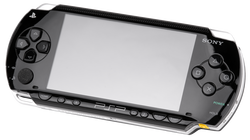 Rest in Peace, Cobb's PSP Rest in Peace, Cobb's PSP COBB: We did PSD for the 49th MP Brigade's Sergeant Major and drove him all over the country, getting hit by IEDs every so often. I never got seriously injured by one, but one did shred my Sony PSP once. I was so pissed. Reed was in that squad with me; he remembers. REED: I vaguely remember that happening, but I don't remember the specifics of it. CLIBURN: How many IEDs detonated on your squad that year? REED: Eight IEDs and one VBIED (Vehicle-Borne Improvised Explosive Device or "car bomb"), so nine total. CLIBURN: Well, in that case, you can be forgiven for not remembering the exact one that destroyed Cobb's handheld personal gaming device. REED: Those PSPs were a hot item back then. I remember standing in line in Kuwait for hours to get one. It was a good way to kill time, so I understand why Cobb would be angry his got destroyed. We were really lucky to have him in our squad. He saved a soldier's life one day while were out on mission. CLIBURN: I remember hearing about that. As far as the PSP goes, I never had one, but I know they were popular. And, after nine IED detonations, it's understandable that they'd all kind of blur together. REED: Yeah, but I do remember the VBIED really well. It was at 0730 on March 7. We were going around a minivan that was parked in the median. I was gunning in the second humvee for CSM Roman, and the minivan detonated on the third humvee. The g-force was so hard, it blew SGT Eden's quick-connect apart on his headset. We couldn't get commo with the third truck because of it and all we could see was smoke. They finally pushed through, and we secured the area and made sure everyone was okay. It was the most scared I've ever been in my life. QRF (Quick Reaction Force) took almost an hour to relieve us and we weren't even two miles from the base. CLIBURN: I remember that day. I saw SGT Eden and SPC May in the 49th MP Brigade motor pool. The humvee was a shell of itself. I couldn't believe everyone was okay. Apparently, May was standing up just before it detonated it. SGT Eden told him to sit his ass down just before. I ran into May at headquarters and he just had this thousand-yard-stare on his face. He kept saying, "I almost died today" over and over. JESSEN: The most memorable event over there? We were having our squad meeting outside the chow hall around the time Abu al-Zarqawi was killed in Baghdad. I think he had ties to Diwaniyah because all Hell broke loose when he was killed. It was right before dinner chow, and, as soon as it ended, mortars starting raining down on us. We all ran to the bunkers. When it calmed down, we kitted up and got on our trucks. There was smoke everywhere; they hit our chow hall and several other major targets on base. CLIBURN: I remember that. I was in Baghdad, but I was able to email and IM with Crawford and Lynn, who kept me updated during that ordeal. LYNN: I would say that was a pretty significant event for me as well. It was broad daylight and they blew up our chow hall. The KBR folks still served dinner that night though. They set up an alternate chow hall out of a building and made sure we got our hot meal. Say what you want about the "overpaid" contractors, but most of them were good hard working people. I think most of those guys disappeared in the later years of the war, because I had a different experience during my next deployment. JESSEN: Well, right after the attack, there was lots of fighting in Diwaniyah, so our missions got halted. Then one day we woke up and there were new tanks and soldiers on our base. They were there to calm things down, and that’s what they did. When we went back out on missions they had the whole town on lock down. There was no one out and about; it was like a ghost town. HENDERSON: What I remember fondly is the exceptional teamwork and dedication displayed by everyone on the mission. Not one time did I get any shit from any other member of SECFOR. It didn't matter if you were a mechanic or an RTO. Everyone had a job to do, and everyone respected the mission of everyone else. There were guys who were total shitbags state-side . . . guys that never showed up on time or worked really hard at getting out of work . . . but, once they hit the ground, it was like a light bulb went off and it was time to rock. That's what I like to remember about the mission. Obviously, it's not all that stuck with me, but it's a good memory. Almost Famous In May 2005, Rolling Stone journalist Matt Taibbi spent a week embedded with SSG Erasmo Barron's squad. At that point, the squad's luck seemed remarkable as they survived many near-misses. SCHMIDT: That was my squad. But I was on leave when that happened, so I never met the guy. CLIBURN: I saw Taibbi with Barron's guys. I didn't know who he was except that he was a journalist, and I have to admit: I was jealous. My dream was to be some sort of globe-trotting journalist, and he was one. But I never worked up the courage to go talk to him about it. I regret that. Of course, I'm not sure what advice he could have given me. He was the son of an NBC reporter, went to a prestigious college in New York and worked his way to Rolling Stone. Meanwhile I'd been a failing student at a regional university in Oklahoma whose greatest accomplishment at that point was not getting killed in Iraq. LEAL: There was a lot of excitement in the weeks after he left because everyone was anxious to see what he'd write about the Oklahoma Boys, a moniker we adopted from the Cross Canadian Ragweed song "The Boys from Oklahoma." We were proud of our home and showed it whenever we could. CLIBURN: That flag was a gift from a woman in California. She contacted me on MySpace and said she had an Oklahoma state flag she wanted to give to an Oklahoma soldier. She asked if I'd be interested, and I said "of course." I still have that flag. The Ultimate SacrificeFrom the moment they got the call, each soldier knew death was a possibility. And, just after they arrived in Baghdad, the al-Askari mosque was bombed, sparking the civil war that ultimately led to the surge. But, even though there were close calls, by June no one had been seriously injured or killed. It was easy to become complacent. That all changed on June 5, 2006. 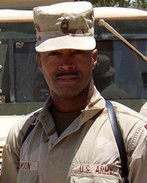 SFC Issac J. Lawson SFC Issac J. Lawson HENDERSON: What still sticks with me is the day SFC Lawson was killed by an explosively formed penetrator (EFP). I knew the members on his convoy. They were all great soldiers, leaders, and professionals. Oftentimes I wonder: was there any more information I could have given them that would have changed their route? Or could more intel on my part have prevented it? CLIBURN: SFC Lawson was part of the California Army National Guard unit we were attached to. His year was almost up, but he volunteered to go on that convoy with SSG Barron's squad anyway. They were hit near Baqubah. SCHMIDT: I was supposed to be the gunner in that truck until the air conditioner* went out. I was the rear gunner in my truck and when the blast happened I was thrown into the turret and would have had some bruised ribs without the body armor. When we stopped, we were past the blast zone and I had a young man 25 feet away from the barrel of the .50 cal. I told him to leave after I saw him piss himself. I was pulling security and trying to raise a bird (helicopter) for some help. Finally a Ranger helicopter answered back and came and landed in a trash dump. They loaded up Lawson but we knew he was gone already. We hooked up the blown truck and had six people crammed in one truck on the way back to the base we'd just left. When we came to the back door of the base it was locked and had a truck that wouldn't start blocking the gate. We finally got in, told them the news and were debriefed. Then we went to clean out the truck and found Lawson's boot . . . with his foot still inside it. Finally, squad one arrived and escorted us back home for another debriefing and statements. CLIBURN: That humvee had been mine for the six weeks prior to that mission. My assigned humvee was getting repaired during that time. When it was finally finished, we handed C21C to SSG Barron's squad for their trip north. When it was towed back, it was surreal seeing the damage . . . knowing someone died in the humvee I'd called my own for six weeks of missions. *The humvees had thick armor all around and needed air conditioners to cool the vehicles to a point that was safe for soldiers. Without them, the internal temperature could reach 180 degrees Fahrenheit. 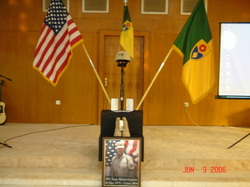 SFC Lawson's Memorial June 9, 2006 SFC Lawson's Memorial June 9, 2006 DUFFY: News of SFC Lawson’s death found its way into my room at about 3:30 in the morning after it all went down. Smith (my roommate) was in that squad. He came in and woke me up. I didn’t realize immediately how late it was, and then I asked him why the late night. His response was, “You know Sergeant Lawson? He’s no longer with us.” I was hit with adrenaline and wanted to puke, so I got up and he told me the story a few times. You could tell as he looked up at the ceiling and talked that he was replaying the whole thing in his head as he described it. It was terrible, and suddenly Iraq was dangerous again. I knew SFC Lawson well because he was always working in the S2 with my package, MSG Lownes. I was honored with being a rifleman in his 21-gun-salute. His memorial was a turning point in the deployment for me, and in many ways kept me from getting too complacent from that point on. CLIBURN: I didn't find out until a few hours later. The next morning there was a lot of talk in the motor pool about something. The information was hazy. All I knew is that one of our squads was hit and someone died. I knew Schmidt was in that squad, and he was my next-door neighbor in Iraq. We were in Fourth Platoon together at Camp Gruber and got along really well. I was worried. SCHMIDT: When we finally arrived back at Liberty, we were met with sorrow and tears and support from everyone. We didn't go back on the road for a couple of weeks just to make sure everyone was alright. CLIBURN: I didn't know what had happened for sure until we were told SFC Lawson was dead at that formation at the palace (49th MP Brigade headquarters). Everyone was in a mix of shock and despair. We all knew it could have been any of us. It definitely brought us closer together. HENDERSON: What I hate is: a squad is attacked, a soldier is killed, and not a single shot is fired by us. That's not a dig on the squad itself. It's hard enough to fight a traditional conflict . . . even more difficult when there is no such thing as a front or enemy uniforms. The battlefield in Iraq was 360 degrees. And the enemy surrounded you everywhere. That incident made me ask myself: is this a war or are our guys leaving the wire every day on a suicide mission? After all, what do you call a job where someone can can make an attempt to take your life using whatever means necessary and all you can do in response is wait and pray that the guy running away from the hole in the ground is holding an AK? It didn't matter that he just pushed the button that killed your buddy. CLIBURN: I understand completely. When people ask how I felt in Iraq, I always tell them "helpless." I was a gunner and had four weapons at all times, but I felt helpless. I didn't know who was trying to kill us or where they were. And I didn't want to get too jumpy and kill innocent people either. There were a few times I came thisclose to shooting someone who wasn't trying to kill us; they just weren't paying attention to the road. But I didn't do it. The rules of engagement forbade it, as did my own conscience. But it doesn't mean I didn't come close. And it doesn't mean I felt safe. Not at all. I just accepted the situation for what it was. JESSEN: That was a stressful time. But my son was born June 29, 2006, so I got to go on leave to be there for a couple weeks. After seven months in country, a few close calls, and SFC Lawson's death, I needed that. The Gang That Didn't Get Hit Fort Apache, Iraq appeared in the July 17-23, 2006 issue of Rolling Stone magazine, and an accompanying video of the soldiers appeared on RollingStone.com. 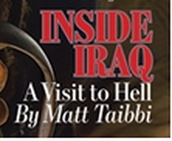 Because of their incredible luck preceding his visit, Taibbi referred to the squad as the gang that didn't get hit. But, shortly after Taibbi left, the squad was hit. That was the attack that killed SFC Isaac J. Lawson. The soldiers liked the story because it showed the experience and the soldiers for exactly what they were. The leadership hated the story because it showed the experience and the soldiers for exactly what they were. 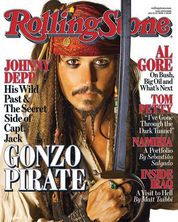 CLIBURN: To be fair, one guy did flip his middle finger at the camera and say how much he hated his squad leader. That wasn't the image the leadership back home wanted people to envision when they thought of the 158 or the Oklahoma Army National Guard. DUFFY: Yeah, but Taibbi got a lot of things right. We were just a bunch of guys doing our jobs and having fun while we tried to stay alive. CLIBURN: He did a great job portraying that. I thought it was the most accurate representation of day-to-day life as a soldier in Iraq. I went on R&R just as it was released, and I told everyone back home to buy it and read it. Want to know what it's like? Read this article, I would say. Even though I wasn't in the piece, I felt famous somehow. But just a couple weeks later I was back in Iraq and the missions continued unchanged. DUFFY: I thought the video was pretty cool. I liked Taibbi. I thought he did a decent job of keeping his liberal, anti-war personal opinion out of it (well, as much as a Rolling Stone guy could possibly do). I thought it was cool to be part of such a major publication. I proudly showed that to people. Cat and MouseThe war in Iraq changed daily as enemy tactics responded to the soldiers' evasive procedures and vice versa. It was a cat and mouse game and no one could afford to lag behind. On a macro level, Matt Taibbi explained it best in his Fort Apache: Iraq article and, later, his 2007 book, Smells Like Dead Elephants: "The primitive, single-plated Humvee that was first used for these patrols originally proved too vulnerable to IEDs and especially EFPs (explosively formed projectiles, copper-coated charges that are proficient at penetrating armor and were rumored to come from Chechnya). So the vehicle has been modified, and modified again, and then the modifications have been modified; it has been sent to the shop and affixed first with a Big Black Dick, then a Bigger Black Dick, and then extra armor and then extra armor on top of that. When the new triple-armored, Dick-bearing Humvee proved so heavy that the doors fell off their hinges, the Army was forced back to the drawing board again, and doubtless a new kind of Humvee door will soon roll off the line." But the 158 and other units that left the base every day couldn't afford to wait for life-saving modifications to come down from on high. For them, this meant daily modifications and ingenuity at the company level were needed to stay one step ahead of the enemy. Fortunately, the 158 was lucky to have a great group of maintenance and support personnel constantly scheming to provide the men the best protection possible. CLIBURN: What was the thing that extended from the front of the humvee to trick EFP infrared sensors? All I remember anyone calling it was the big black dick. I'm sure that wasn't the proper term though. JESSEN: The rhino? DUFFY: It was the rhino. FITZGERALD: Yeah, rhino or "RINO." CLIBURN: Damn, I guess I was the only one who couldn't remember. That's right. Once again, Taibbi described driving with it really well in his article: "The Big Black Dick was a long black iron prod with a big square head at the end that the Army had devised as a method of preventing vehicle-borne suicide bombers from ramming Army convoys head-on. Technically it was called the RINO, but in this group of the 519th MP, a police transition squad on the eastern side of Baghdad, they called it the Big Black Dick. CLIBURN: But it should be noted that the rhino was not for preventing suicide bombers. Someone told Taibbi that as a joke and he didn't realize it. It was actually for EFPs and their infrared sensors. The best drivers took pride in navigating through the streets with that thing extending six to eight feet in front of the humvee. Our squad's best driver was probably SPC Joseph Killman. He definitely took pride in driving through those narrow passages. He loved to push the envelope with his truck and had an uncanny sense of spatial orientation. BRUESCH: He did. He was a good soldier and a great driver. I never had to worry about him. CLIBURN: No, not at all. Despite the practical difficulties it presented while driving, it really was pretty ingenious (easy for me to say, since I was a gunner and didn't have to navigate with that thing out front). Not everyone was as adept at driving with it as Killman, but the rhino was a necessity. We had to use it because the enemy had equipped their EFPs with passive infrared sensors that were triggered by the heat of the humvee engine (which was terrifying but also pretty ingenious itself). They were timed to detonate on the passenger cabin. Somewhere, someone discovered they could "trick" the sensors by extending a box from the front of the humvee that emitted a heat signal. That would trigger the EFP, but it would detonate on the engine compartment rather than the passengers. But our maintenance guys didn't stop there. PYLE: They didn't; they were great. The one thing that stands out about them actually came about through tragedy. Our maintenance unit was tasked with "cleaning up" after one of the Iowa National Guard trucks got hit and, unfortunately, the gunner for that truck was obliterated. Our maintenance personnel noticed the multiple places where the layers and layers of "armor" were punctured. The EFPs were scorching through the armor like a hot knife through butter. But they noticed something else. The EFPs and their shrapnel were not fully piercing the 12 layers of glass and temper film that made up the humvee windows. Our maintenance crew was able to get the extra windows ordered, and we started welding them into every humvee. CLIBURN: I remember that. We were out late in the motor pool installing those things anywhere we could fit them: underneath the existing windows and on the gunner's turret mostly. PYLE: I don't know the effectiveness of that adjustment, but to this day I applaud the ingenuity of not only our maintenance crew, but our group as a whole. I have always felt that National Guardsmen have a distinctiveness that active duty personnel don't have. We were able to take our real world experiences and combine them with all of our professional military training which I feel helped make us better rounded soldiers. Back to EarthAfter nine months in country and all the hoopla surrounding the Rolling Stone article and video, it was easy for the soldiers to forget where they were. But it didn't take long to come back to Earth. There were more attacks, more bodies dumped in front of police stations, and more close calls. Complacency was their enemy. CLIBURN: In early August, our IHP station was attacked by a handful of insurgents. But we had to force the IHPs to fight back. It was almost comical. I wondered why the attackers felt so emboldened to just stand across the street without cover and fire at the compound, but it was clear: whenever we weren't there, the IHPs probably didn't stand and fight, so the attackers weren't afraid. BROSH: It was you, me and an E-7 from the 49th MP Brigade motor pool. We needed an extra body that day and he came along. CLIBURN: Yeah. We were inside the Central Maintenance Facility (CMF) compound (which adjoined the IHP compound) when the E-7 said he head small arms fire. He hadn't been outside the wire often and was extremely nervous. But we were pretty complacent by then. We were kind of jerks about it and said, "yeah, you're in Baghdad. You're going to hear small arms fire all day. It doesn't mean we're being attacked." BROSH: Then we realized we actually were being attacked! The IHPs started running down from the guard tower as fast as they could. I remember standing on a 'T' wall and yelling at them to "light them up!" CLIBURN: I was still in the hatch of the Humvee relaying everything to headquarters via the radio. At one point, they asked me how many attackers there were. But I didn't know because the walls were so high I couldn't see over them (I'm 5' 5"). So I stood on top of the Humvee to get a look over the wall . . . and that's when a tracer round flew by my head. I decided that was a good time to estimate the number and not pop my head up again. BROSH: But we made them stand and fight and they took out every one of those attackers. CLIBURN: Yeah, then the Iraqi Commandos showed up on the scene and put an extra bullet in the head of each one just to make sure. I was pretty sure that was a war crime but what was I going to do about it? I was just glad it was over with. BRUESCH: I was on leave when that happened, but I definitely heard all about it. It was things like that that reminded you where you were. It was easy to forget sometimes, especially with all the bureaucracy on the base. CLIBURN: Yeah. The bureaucracy and dog-and-pony show on base was worse than being outside the wire. The only time I got really angry during the mission was when I got kicked out of the chow hall . . . for being too sweaty. The chow hall cop came up to me and said I was too dirty to eat there because they "tried to present a professional image" at their "dining facility." I was furious. BRUESCH: You were so angry. I still can't believe they did that. I always tried to keep everything upbeat as best I could, make everyone laugh and enjoy the time. We were trained and knew what we were doing. But there were always unexpected things we had to deal with. We weren't supposed to listen to music on the road, but it was the few things we could do to suppress the stress of the mission. I think it helped a lot, too. BALDWIN: I got kicked out of the chow hall somewhere, too. I think we had salt rings from sweating so much, and they said we had to get our food to-go. But it was over 110 degrees outside; what did they expect? DUFFY: The chow hall police were the worst. They're the ones that would shake you down as you left the chow hall to make sure you weren't taking more than two Gatorades with you. CLIBURN: And they took it so seriously! I hated them and their pressed uniforms. Anyway, I was told I could get my food to go, but I wouldn't be allowed to sit and eat . . . because I looked too much like I was a soldier in a war zone in the desert. I'm getting pissed again just talking about it. NEELY: I remember you coming to my office to talk about that. It was unreal. CLIBURN: I tried to explain I was sweaty and dirty because I was busy actually being a soldier. And it was Iraq . . . in the summer. Not all of us were fortunate enough to work in an air-conditioned building all day. But they didn't care, and I had to take my food to go. DUFFY: I wasn't there for that, but I remember you telling me about it later. My wife had our twins in July. I'd gone on R&R in April already, but my wife's pregnancy was considered "high risk." So, when she went into labor, I was put on a plane back to Oklahoma. I ended up missing the birth by about 24 hours, but I got to be there for a little bit. CLIBURN: It seems like a lot of guys had children while we were deployed. I didn't have any children when we deployed, and I didn't have any born while I was there. I wasn't even sure if I liked kids at that time. But things change, and the mission changed me in ways I didn't expect. The RadioNo matter their mission, a common responsibility of each squad was to monitor both the "landowner's" (the military unit responsible for that AO (Area of Operation) frequency and the medical evacuation (MEDEVAC) frequency. It was crucial: if a squad nearby called for help, you needed to know. You had to be ready to go help another squad. And you had to keep constant commo with the MEDEVAC frequency in case you needed to call in a nine-line MEDEVAC report. CLIBURN: One day in August, we were convoying back to the base. It had been a good day, and we were getting back early. I was in my usual spot as the gunner in SSG Bruesch's humvee. BRUESCH: As squad leader, my truck always monitored the MEDEVAC frequency. CLIBURN: We were flying down Route Aeros/Irish when a call for help came out over the radio. A squad leader was calling in a MEDEVAC request. His gunner had been shot by a sniper, he said. BRUESCH: I remember that. I plotted the grid coordinates and realized they were only a short distance away from the IHP station we were assigned to. CLIBURN: It was SSG Bruesch, CPT Ray, and me in the humvee listening. The squad leader started out incredibly composed, and then, over the next 20 minutes he got more and more frustrated asking where the Hell the chopper was. It was gut-wrenching. BRUESCH: It was. But we had to listen. We had to monitor that frequency. CLIBURN: I know. So we listened, in silence . . . until the squad leader came back on canceling the request. "He's gone," he said. I felt so helpless; I hated that there was nothing we could do to help when someone obviously needed help. 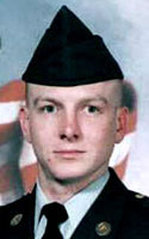 SGT Jeremy King, KIA 8-24-2006 SGT Jeremy King, KIA 8-24-2006 BRUESCH: I'll never forget that. CLIBURN: I know. Me either. After the pronouncement, the radio operator on the other end asked for the casualty's information. "SGT Jeremy King," he said. The name stuck with me. I wanted to know more about the man I'd just spent 20 minutes listening to the last minutes of his life. BRUESCH: I didn't know at the time that you'd looked into him. We never talked about it once we got back to the base. CLIBURN: I found the Army release announcing his death. It said he was 23, played high school football and was from Idaho. He sounded a lot like any of us. It could have been any of us; it could have been me. Over a year later, back in the U.S., I kept having dreams about that day, reliving it over and over again . . . and hoping that maybe this time he'd make it. I woke up one night with another one of these dreams and started writing about it. BRUESCH: I remember reading that. My reply of "I remember that day" was the first time either one of us had acknowledged it since it happened. CLIBURN: I know. We never talked about it, but I didn't forget it. It reminded me of a short story I read in high school: John Cheever's "The Enormous Radio." In it, a couple receive a radio capable of listening in on all their neighbors' lives. At first they love it, the voyeuristic feel of it. But then they hear things they don't want to listen to, but they can't turn it off once it's on. That's how this felt: I did not want to listen to this, but we were obligated to monitor that freq. Therefore, I had to listen to it. MORGAN: I understand that feeling. Earhart had a similar experience at Balad when he was monitoring the radio in the TOC and had to listen to the last radio transmissions of a couple men who were killed by an incendiary IED. CLIBURN: Yeah, I remember hearing about that. Earhart was my roommate after we got back to Oklahoma, so he understood. About a year after I got that off my chest, I got an email from a woman asking if I was the one who had written it. She was SGT King's widow, and I felt horribly guilty. I never wanted for his family to hear the gritty details of those last 20 minutes. But we talked on the phone for a long time, and she was grateful I'd written it. That meant a lot to me. Innocent VictimsOne constant in war is the relationships soldiers develop with local children. The same was true for the 158. Their gunners tossed stuffed animals and candy to children from the humvee hatches, and the soldiers passed time by joking and playing with children outside their humvees. BRUESCH: People from all over the U.S. would send us stuffed animals and candy to pass out to children on our route each day. We loved seeing how happy it made them. I still like to tell the story about a particular Beanie Baby we carried around for six months waiting for the perfect little kid to give it to to . . . and how when we found her she ran away when we threw it to her. CLIBURN: Early in the mission, our squad befriended two Iraqi children: Ali and Ahmed. We usually met them at the Traffic Police Headquarters compound, where they were collecting aluminum cans. BRUESCH: You especially bonded with those kids. They were good kids and helped the time pass by, although sometimes they could be annoying. 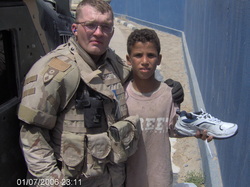 Cliburn and Ahmed Cliburn and Ahmed CLIBURN: They could be, but I loved spending time with them. We'd play rock, paper, scissors or kick around a soccer ball. BRUESCH: And people all over the country sent them stuff. CLIBURN: Yeah, I loved giving them things. People back home would send clothes, shoes, school supplies, food, candy, and toys for us to give to the children. I got care packages from Brigham Women's Hospital in Boston quite a bit. I even got one from a guy in Boston who said he found my APO address on a bar's bathroom wall. It was great. BRUESCH: It seemed like every week you were getting packages like that. CLIBURN: It did. I loved taking the stuff to Ali and Ahmed each week; it made me feel like I had a purpose other than pointing guns at people. But in August, Ahmed was killed by a suicide bomber. It was horrible. It was the worst day of my life. It still is. BRUESCH: I remember that day. All I could do was say "I'm sorry, man." CLIBURN: It's all any of us could do. I was crushed. I felt so helpless in that moment. I was so ready to go home. But we still had a few months left, the heat was still Godawful, and there were still people trying to kill us. We had to remain vigilant. BROSH: I know that was the turning point for Cliburn after his little buddy got killed. He wanted to make a difference and truly cared about the people. I could see a drastic change in his views on the war. CLIBURN: My views were constantly evolving, but you're right. I felt like, if we can't even protect the children, what good have we done here? The country was in chaos. It was hard to believe we'd actually helped the Iraqis at that point. Conflict CoffeeAside from their usual missions, the soldiers often went out on other convoys. Those missions varied, but one thing was a near constant: they usually didn't know exactly what they were escorting, protecting, retrieving or meeting for. Soldiers were told to "go outside the wire" with another squad and they complied. DUFFY: When the 89th MP Brigade replaced the 49th, my squad was dispersed throughout the company. Nye and I ended up going to SSG Grant’s squad. My old squad traveled mostly Baghdad. No crazy long trips, or extremely dangerous routes. Granted, my old squad got deep into the neighborhoods and alleys of Baghdad, which was no picnic, but nothing like the threat of the open road in certain areas. I was disappointed to hear our squad got volun-told to make a trip to Rustamiyah one day. There was a particular stretch of road involved in that trip that was getting hot. Plus, Rustamiyah had a reputation as a stinky, trashy dump that didn’t have soldier-friendly facilities. CLIBURN: Rustamiyah was, in my mind, the most dangerous destination in the Baghdad AO. It sat alongside Route Pluto and was bordered by a landfill on one side and a water treatment plant on the other. They had to retrieve dead bodies out of that water so often that they installed a sort of hook and pulley system to make it easier. It was dangerous, and it smelled. DUFFY: So you can imagine how pissed we were after making the ass-puckering excursion only to find out we were delivering two items: a set of “certificates of achievement” for a unit that had already been gone for two months; and coffee. We were livid. CLIBURN: I overheard a similar conversation in line at the finance office. A couple of guys in front of me in line said they had gone up north to escort a special convoy for their unit leadership. They said they were attacked on the way back and then, once they made it the base safely, they opened up the trailers and realized they were escorting lawn furniture the whole time. They were so angry and frustrated that that was what they risked their lives for. DUFFY: Yes, the coffee was fabulous. The 49th MP Brigade Chaplain had his small staff write to every major coffee company one could Google and ask for donations. I think they got more of a return on investment than they anticipated. There were three coffee presses and two percolators stationed in the Chaplain’s office. Each morning, or maybe each week, he would showcase new smells, tastes, blends, colors, and brands. CLIBURN: I didn't partake very often. To be honest, I felt very anti-faith during the deployment and wanted as little to do with it as possible. If that meant missing out on good coffee, so be it. I just tried to avoid chaplains everywhere we went. But I hear it was good coffee, and I know how much you love coffee. DUFFY: When I was in basic training, a guy named Watson and I smelled the coffee at breakfast every day and finally got the balls to try it. Nobody said anything, so it became our morning ritual. Somehow, during that three-week period, coffee became an important commodity in my life, and represented the good things we sometimes lost access to as soldiers. So I get it. There was a surplus of something that made people happy and the Chaplain wanted us to make that delivery for him. It saddens and worries me that a trip that dangerous was made for coffee though . . . because it certainly wasn’t for the awards that were two months too late. It’s things like that that make our feelings toward the military so love/hate. CLIBURN: You loved having access to that luxury, but you hated that you risked your life to ensure others had access to the same luxury. DUFFY: Yeah. I realized that other people may have been risking their lives for my gourmet coffee up until that point. It really made me feel conflicted. CLIBURN: You experienced a very real-life example of the ignorant consumer. So often, we (consumers) enjoy things without ever considering the logistical supply chain that made it possible . . . whether it's diamonds, gasoline, iPhones or gourmet coffee in a combat zone. And I don't mean to sound like I'm on my high-horse here; we all do it. DUFFY: That's exactly what it was. In that moment, I realized I'd been enjoying coffee other soldiers risked their lives to procure. I felt . . . conflicted. PreseasonIn the wake of SFC Lawson's death and the irrepressible summer heat of Baghdad, the men needed a distraction. Thankfully, football season was just around the corner. Someone suggested a fantasy football league to pass the time, and the OklahomIraqis League was born. That first season only had 10 managers, but other soldiers participated in their own leagues that were just as important. [NOTE: The logos and uniforms for each franchise were developed years later, but they are used here as if they were part of the league from the beginning.] CLIBURN: After the oppressive summer heat, the close calls, the bombings and firefights, the uncertainty surrounding the Iraqis we worked with, and the deaths of SFC Lawson, SGT King and Ahmed, the novelty and adventure of the mission was long gone. I was ready to go home. But we still had several months to go, so football season was a welcome distraction. The Camp Echo guys were re-supplying at Camp Liberty when Jessen suggested a fantasy football league. I wasn't crazy about the idea, but they needed another guy. Jessen agreed to be the commissioner, so I accepted. JESSEN: I did. But, even though I was a part of that original league, I don't remember much about it. I was supposed to be the commissioner. But I was at Camp Echo, and our Internet was horrible. That's why I only made three roster moves all season. It's probably why I finished with the fewest points in the league, too. CLIBURN: That's why I became the commissioner . . . because Jessen truly couldn't do it with the Camp Echo Internet. The Internet at Camp Liberty wasn't great, but it was light years better than what they had down there. Do you remember what the league was named before I took over? JESSEN: No. Not really. CLIBURN: It was the Care Bears League. JESSEN: Oh, yeah. I vaguely remember that, but I don't remember why. I'm sure there was a joke behind it, but I've totally forgotten it by now. CLIBURN: I don't remember what it was either, but the first thing I did was change the name. That's when it became the OklahomIraqis League. I tried to think of something clever, and I was stumped. But I knew that we were the Oklahoma Army National Guard and we were in Iraq, so: OklahomIraqis. PYLE: I thought the name was clever, and I was just happy to join a fantasy football league. I'd never played in one, but I was intrigued. But nobody I knew ever wanted anything to do with a league. Plus, I really needed an escape . . . and a way to make time go by faster, as I was homesick and ready to get back state-side. I honestly had no clue what I was doing. DUFFY: I wasn't in the first season of the OIL, but I played in a league with Nick Reed and Thomas Hillier that year. I had to go to their trailer to set my lineup because I didn't have Internet. I don't remember much about how that league began, but we enjoyed it. HILLIER: That was my first season playing fantasy football. I commished that league, but I don't remember who won or how I placed. I had a lot of fun though, and I was hooked afterwards. The DraftAs the draft approached, the teams were finalized at 10 managers. They were:
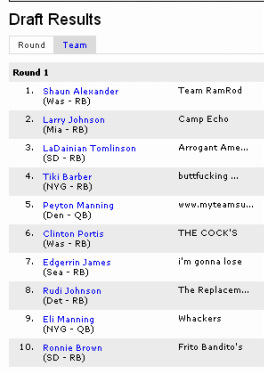 2006 autodraft first round 2006 autodraft first round CLIBURN: I was naive enough to schedule a live online draft on Yahoo. I scheduled it for a time when I knew we wouldn't be on a mission, but there were technical difficulties. PYLE: Our Internet was horrible, but I guess we were lucky to have Internet access at all. CLIBURN: True. I was all ready for the draft. I clicked on the Enter Live Draft button and waited for it to load . . . and waited and waited. When I finally hit refresh, the draft results were displayed. PYLE: Our Internet cut out right before the draft began, so every one of our teams was "auto-picked" by Yahoo. JESSEN: I got Larry Johnson with the second pick during his prime in Kansas City. It was a good pick, as he finished number two among running backs that season. CLIBURN: I lucked out with my autodraft. The software selected LaDainian Tomlinson for me with the third pick, and he was the number one player in fantasy that season . . . by a large margin. He had over 2,300 total yards and 31 touchdowns. Some of us weren't so lucky though. MORGAN: I got stuck with Eli Manning with the ninth pick. He was the number 13 fantasy quarterback that year . . . and he was my first-round pick. CLIBURN: And the first overall pick, Shaun Alexander, was a fantasy bust. He was Purdue's number one pick, but he finished as the 28th-ranked running back. Missing on your number one pick like that is killer. LEAL: I was happy with the selection of Ronnie Brown, but he finished as the number 25 running back that season. I really had no idea what I was doing that season. What I remember most is staying up to zero-dark-thirty to watch OU football games. 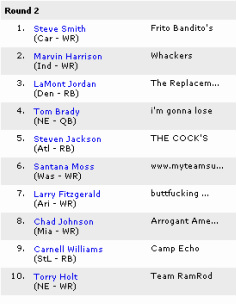 2006 autodraft second round 2006 autodraft second round CLIBURN: Woodman got screwed in the second round with LaMont Jordan, who finished as the 55th-ranked running back. But I lucked out again with Chad Johnson, who finished in the top five at wide receiver. PYLE: It's weird to see names like LaMont Jordan and Carnell Williams in the second round, but that was eight years ago. CLIBURN: What's more surprising is the number of guys who are still solid fantasy players: Steve Smith; Tom Brady; Steven Jackson; and Larry Fitzgerald are still going strong eight years later. They're all nearing the end of their careers, and their play is declining. But they're still on fantasy rosters. Steve Smith was on the 2013 OIL Bowl champion's roster, in fact. LEAL: Yeah, I remember being glad to have him that first season. Who was his quarterback back then? CLIBURN: Jake Delhomme. I think I owned him for part of the season before switching to Derek Anderson during his one good year with the Browns. Team-by-Team Drafts* |
CLIBURN: That is brilliant. I totally forgot how you came up with that name. I was obviously joking with the message board post, but I was a little jealous. I had the third-most points in the league that year, but I didn't make the playoffs. So I was a little bitter.
MORGAN: I guess I should be bitter about that season because I had the best regular-season record, but I didn't win the championship. But I barely remember that season, and all that really mattered to me was that we had a lot of fun talking about it day-to-day.
LEAL: I didn't win the championship . . . or make the playoffs . . . or even have a winning season. But I had a lot of fun that season, especially playing against my roommate, Morgan. After that season, I was hooked.
PYLE: That season was special, and the OIL became an important part of my life after that. It allows me to stay in touch with many of my former battle buddies (at least those that respond to trade proposals), and allows us to continue the camaraderie we developed while serving our country.
Week-by-Week Results
The Offseason
HENDERSON: I did just about the same thing. When we got home, I went right back to work at Lawton Police Department.
LEAL: When we got back, I felt lost. I felt numb. Something was definitely different. I took a few months off to decompress, but then I went back to selling cars.
CLIBURN: I was surprised by that. I don't care how close you are, spending a year as roommates in Iraq is tough. I sure didn't want to move in with Brosh when we got back, and we didn't even have any huge blowups or anything.
BROSH: No, but we were ready to go back to our own homes. Living in that close proximity takes a toll on relationships, but nothing ever persisted, just minor annoyances. Plus, when I got back I came home to my fiancee. We got married the next year.
DUFFY: I went right back to work at UPS when we got back. Full-time management was a lot more involved than what I was doing before the deployment, and sometimes I missed the simplicity of the mission.
CLIBURN: It was almost the exact opposite feeling for me. When I got back to work, everything seemed so mundane. I missed the excitement of the mission. Everything I did over there had real-life, life-or-death consequences. That was stressful, but it made me feel alive. Loading UPS package cars just seemed so trivial after that. But I eventually got back in the swing of things.
COBB: I moved back to Fort Smith after we got back. I transferred to the Arkansas Army National Guard and started college again. I still kept in touch with some of the 158 guys though, especially my fellow medics. My dad lived in Muskogee then, so I visited the guys when they were at Camp Gruber for the next year's annual training.
CLIBURN: I remember that. I think that was the first time I'd seen you since the mission. You were hard to keep in touch with since you'd left the unit by then.
CLIBURN: I remember going to a couple cookouts at that house. Those were good times.
CLIBURN: I bought a house in Lawton and enrolled at Cameron University. I'd reenlisted for three years while I was in Iraq because my contract was almost up and I hadn't done what I signed up to do: get a college degree. After two activations and one deployment, I was determined to finish that damn degree. So, almost immediately, I went back to work loading packages at UPS in the early mornings and going to class afterwards. I got involved in the Law and Politics club at school and started thinking of going to law school.
LYNN: I went back to college and started going to OCS. Eventually, I graduated with a degree in Occupational Safety and became a commissioned officer in an Armored Cavalry regiment.
The Legacy
FITZGERALD: What Cliburn and Duffy have done with the OklahomIraqis League and the recent reconnection of many of the SECFOR guys are both a part of the legacy, and a way to keep the legacy alive.
CLIBURN: I really found my humanity there. I think pre-Iraq Cliburn was kind of an asshole, especially when it came to thinking about people in other countries, people who were different. In Iraq I realized how alike we all really are, and I regretted a lot of stuff I'd said before. I hated pointing guns at people every day. But it was my job, and I had to keep my convoy safe. Like Brosh, it was one of the best periods in my life. I wasn't miserable there. Even though I was incredibly conflicted there, I appreciated the experience. I still do.
BRUESCH: Then the Texas Army National Guard sent a unit to replace us that was all kinds of jacked up. There were some good soldiers and good NCOs in it, but the unit was cobbled together solely for the purpose of deploying. They had no experience with each other, and it showed.
CLIBURN: And it's important to remember how lucky we were that year. The Kentucky unit we replaced had three KIA and over 20 soldiers sent home due to the severity of their wounds. One of those Kentucky guys committed suicide just after they got back, too.
DUFFY: We were incredibly lucky. Especially when you think of what happened to that Kentucky unit and the South Dakota unit that could have been us. They were assigned to al Rustamiyah . . . right along the most dangerous route in Baghdad. And they had four KIA that year driving up and down Route Pluto.
CLIBURN: I often wonder about that. I mean, how easily could it have been reversed? We were just two SECFOR units on paper. It was just a matter of you go here; you go there. That could have been us at Rustamiyah.
DUFFY: A roll of the dice. We were lucky.
CLIBURN: And the Texas unit that replaced us had a rough year after we left. One of the men that fell in on our squad was hit by a car bomb and woke up months later in Walter Reed. And they had a suicide shortly after returning, too. We were very, very lucky, and I'll never forget that.
BRUESCH: Yeah. We served, we did some good for the world, but, most importantly, we all came home alive and with all our digits. That's all we could ask for.
CLIBURN: That's where we still disagree, and that's okay. We became lifelong friends during that mission and still are, but I'm not sure what good we did for the world over that year. I think the general public has a homogenized view of soldiers and their opinions on the wars they serve in. But we're a diverse bunch like anyone else, and our opinions vary. The SECFOR mission was still an important part of my life, and I'm proud of our service. But that pride only extends to us showing up every day and risking our lives for the mission while performing the tasks we signed up for. I'm not proud of whatever effects our efforts had on Iraq or Iraqis because I'm not really sure what those effects were. But we did our best, and we risked our lives doing our best. That much I'm proud of, and I will always remember that year fondly . . . even with the tragedies we experienced.
NEELY: But not everything was hunky-dorey after we got back. There were a lot of divorces, too. Whether directly or indirectly, the mission tore apart a lot of families. I think over 70 of our soldiers got divorced sometime after our return. That's a lot, and it took its toll. There were only 152 men on the mission. And not all of them were married, obviously.
"Thank You for Your Service"
NEELY: "Thank you for your support, it means a lot to me and the troops. Have a great American day."
FITZGERALD: Like Major Neely said, I hit them right back with a "thanks for your support" and then it’s on them. They’ll usually have a personal vignette to share: "my dad served . . . my son serves . . . my cousin was in . . . ’ Then I nod and smile and can usually break contact at that point. It was unnerving 10 years ago when it first started, all the support, that is, but pretty routine now. I do try to go straight to drill and back without having to stop off anywhere in the community while in uniform.
CLIBURN: Maybe it's the lawyer in me, but I feel like accepting the praise implies that I think my service helped them. I'm not saying it's how I should feel; it's just how I feel.
FINCH: But it's not what you went overseas and did. I think it's more that you did the training. You were there when called upon to put your life on the line to complete whatever mission you were given. That's what deserves thanks.
CLIBURN: Okay. Good point. I know my service didn't protect anyone's freedoms, but I know that I volunteered knowing I might have to put my life on the line. So, I can accept all those handshakes of gratitude if that's what they're thanking me for.
BROSH: I really am honored when people say that, but my response is that I signed up and don't want anyone thinking that I expect them to say they appreciate my service. I don't feel like my service helped much either. On the other hand, we did serve, and we understand how the military works. I think everyone should have a dose of the military in that way.
The Rest of the Story
The following are the final rosters of the nine teams that didn't win the inaugural OklahomIraqis League championship, in order of finish:
LIstened to you guys on StoryCorps then came here to read more. THANK YOU for sharing your memories...
Leave a Reply.
January 2024
March 2023
March 2022
December 2021
November 2021
October 2021
September 2021
August 2021
May 2021
March 2021
February 2021
January 2021
December 2020
November 2020
October 2020
September 2020
August 2020
April 2020
March 2020
February 2020
January 2020
December 2019
November 2019
October 2019
September 2019
August 2019
July 2019
June 2019
May 2019
April 2019
March 2019
February 2019
January 2019
December 2018
November 2018
October 2018
September 2018
August 2018
June 2018
May 2018
March 2018
February 2018
January 2018
December 2017
November 2017
October 2017
September 2017
August 2017
July 2017
June 2017
May 2017
April 2017
March 2017
February 2017
January 2017
December 2016
November 2016
October 2016
September 2016
August 2016
July 2016
June 2016
May 2016
April 2016
March 2016
February 2016
January 2016
December 2015
November 2015
October 2015
September 2015
August 2015
July 2015
June 2015
May 2015
April 2015
March 2015
February 2015
January 2015
December 2014
November 2014
October 2014
September 2014
August 2014
June 2014
May 2014
April 2014
March 2014
February 2014
January 2014
December 2013
November 2013
October 2013
September 2013
August 2013
July 2013
May 2013
March 2013
February 2013
January 2013
December 2012
November 2012
October 2012
September 2012
August 2012
July 2012
March 2012
February 2012
January 2012
December 2011
November 2011
October 2011
September 2011
August 2011
July 2011
June 2011
May 2011
April 2011
March 2011
February 2011
January 2011
November 2010
October 2010
September 2010
August 2010
July 2010
June 2010
May 2010
April 2010
March 2010
August 2006
All
100 Losses
100 Wins
158
#158reunion
158 Reunion
2006
2007
2008
2009
2010
2011
2012
2013
2014
2015
2016
2017
2018
2019
2020
2021
2022
2023
45th
89ers
Adrian Peterson
Ads
Adsense
Afc
Afghanistan
All Decade Team
All-decade Team
All-time
Almanac
Andy Behrens
Anniversary
April Fools
Arena League
Arian Foster
Army Slang
Arrogant Americans
Ask The Arbitrator
Award
Baby
Baldwin
Baltimore
Banners
Beastmode
Beer
Bellar
Benefits
Bios
Blue-falcons
Book-of-oil
Boomtown
Brake
Braley
Brawlers
Bricktown
Brosh
Bruesch
Buccaneers
Buehre
Buffalo Wild Wings
Bylaws
Cabin
Cafepress
Calvin-johnson
Camp-gruber
Cease-and-desist
Champions
Championship
Charity
Chicago-bears
Chiefs
Cleveland-browns
Cliburn
Clickydraft
Coach-rankings
Cobb
Coin
Commish-advice
Commissioner-series
Congratulations
Contest
Cooler
Coop-ale-works
Cordes
Cowboys-stadium
Crazy-eights
Custom
Dallas-cowboys
Dbf
Dbfa
Defoor
Denver
Denver-broncos
Design
Detroit-lions
Dez-bryant
Directions
Dirty-hippies
Ditch
Divisions
Donate
Draft
Draft Order
Dues
Duffy
Dynasty
Enforcers
Espn
Expansion
Fantasy-football
Fantasy-football-commissioner
Fantasy-football-commissioner-advice
Fantasy-jocks
Fantasyland
Fantasysportsfactorycom
Favre
Field-artillery
Finch
Fitzgerald
Fiverr
Footballguys
Fox-news
Franchises
Free
Fsgear
Fsgearnet
Games Of The Week
Gauthier
Gomez
Google-hangout
Gray
Green
Green-bay-packers
Hall-of-fame
Hangovers
Harrington
Hastings
Helmet
Helmet-nation
Helton
Henderson
Hillier
History
Hodge
Hopcosports
Indianapolis-colts
Infantry
Iraq
Iraqi-children-foundation
Isaac-lawson
Jacksonville
Jaguars
Jamaal-charles
Jersey
Jerseys
Jessen
Jimmy-graham
Jostens
Kaiser
Kansas-city
Kansas-city-chiefs
Keeper League
Kevin-hodge
Kia
Killman
Kristen Leach Creative Media
Ladainian-tomlinson
Lambeau
Landrum
Landrum-memorial-trophy
Lawson-memorial-trophy
Lawton
Leal
Lesean-mccoy
Liberty-bowl
Logo
Logos
Lt
Lucky-enuf
Lutonsky
Lynn
Manager-rankings
March-madness
Matthew-berry
Maurice-jonesdrew
Mckay
Mckillip
Media
Megatron
Membership
Memorial-day
Merch
Mfc
MFL
Michael-taylor-design
Michael-tenequer
Mitchell
Mjd
Money
Morgan
Musselman
Myfantasycommishcom
Nathan-harrington
Ncaa
Neely
New-england-patriots
New-members
New-orleans-saints
Nfc
Nfl
Nightmares
Nye
Odds
Offseason
Oglesby
Oil
Oil2
Oil Bowl
Oil-bowl
Oil-in-action
Okc
Okiraqi
Oklahoma
Oklahoma-city
Opr
Oral-history
Orangebloods
Parity
Patriot-bowl
Patriots
Paypal
Peacock
Pennington
Peyton-manning
Pfc
Philadelphia-eagles
Pierre
Playoff-odds
Playoffs
Podcast
Poll
Power-rating
Preview
Prize
Pyle
Radio
Randy-moss
Rankings
Ratemyleaguecom
Ratings
Rattlers
Ravens
Ray-rice
Recordbook
Record-book
Red-ball-express
Reddit
Redlegs
Reed
Reid
Relegation
Rest In Peace
Reunion
Ring
Rivalry-week
Rivals
Roe
Rogers
Roster
Rotoviz
Roughnecks
Salute-to-service
San-diego-chargers
San-francisco-49ers
Schedule
Schmidt
Schuster
Sculpturealley
Seattle
Seattle-seahawks
Secfor
Secfor-reunion
Serious
Sgt-jeremy-e-king
Shaw
Sirius
Site
Sixers
Sjax
Skydance Brewing
Sleeperu
Spirits
Spreadsheet
Stadiums
Standings
Stats
Stephens
Steven-jackson
St-louis-rams
Store
Straily
Super-bowl
Survey
Tadlock
Tampa-bay
Teams
Tenequer Memorial Trophy
Texas-longhorns
The-big-lead
The-d-league
Thunder-bowl
Tony-gonzalez
Tornado
Tournament
Trade
Trading-cards
Trash Talk
Trivia
Trophies
Trophy
Trovillo
Twitter
Underdogs
Uniforms
Uniwatch
Upset
Usa-today
Venable
Veterans
Veterans-day
Veterans-resources
Veto
Vice
Vikings
Walking-dead
Website
Whatsthatguybeenupto
Whats-that-guy-been-up-to
World War
Wrap Up
Xm
Yahoo
Yardbarker
Zerger
The OklahomIraqis League
|
|




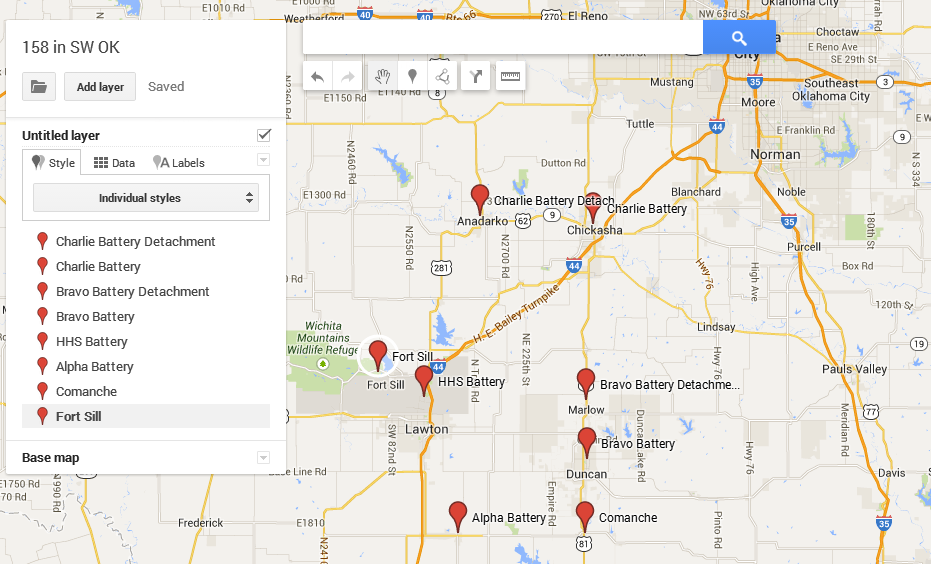
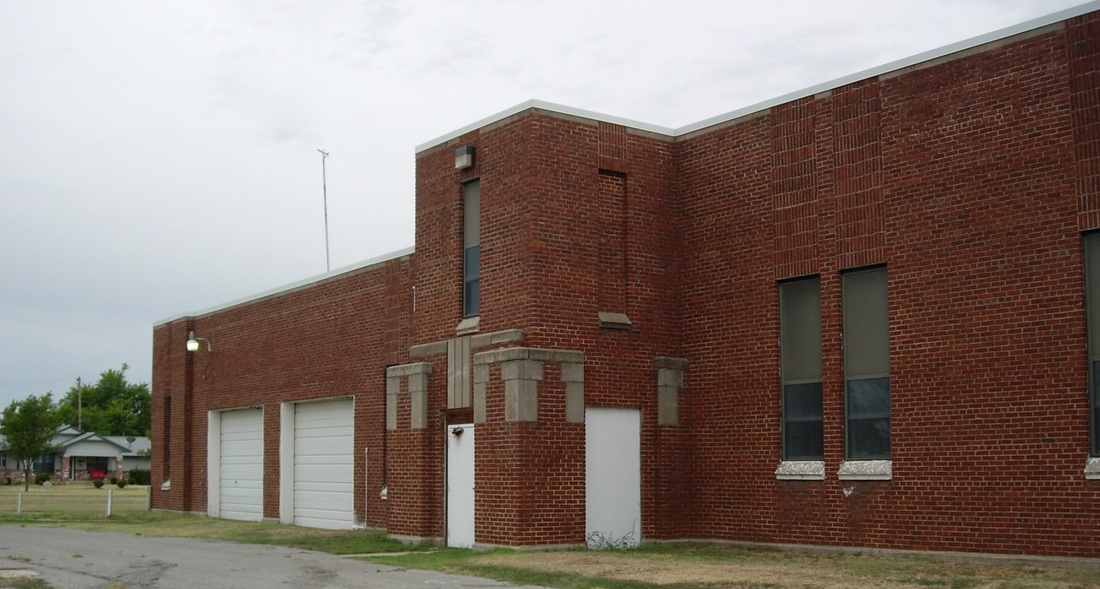
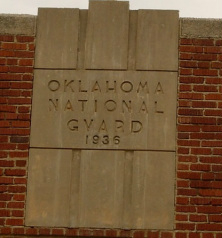

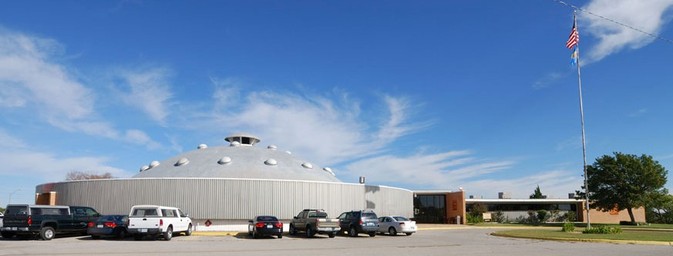
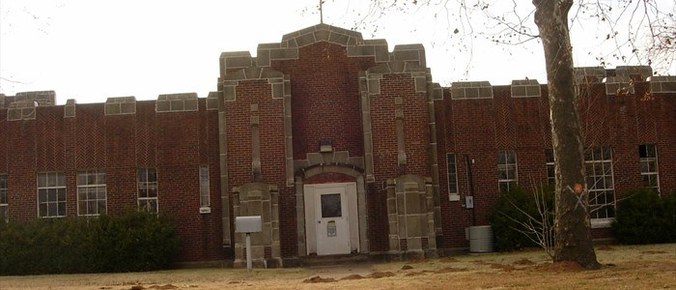

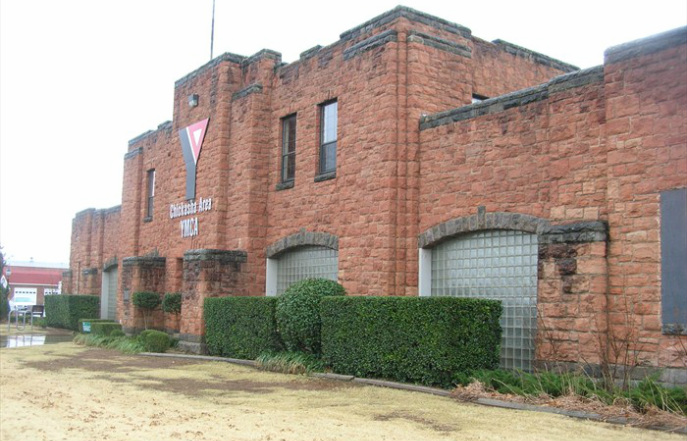

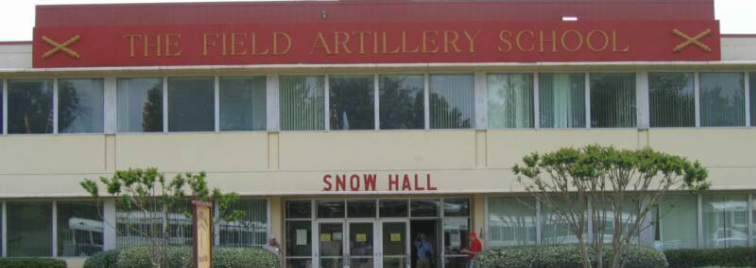



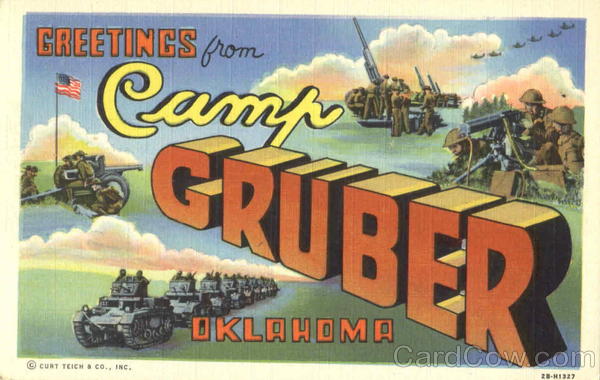

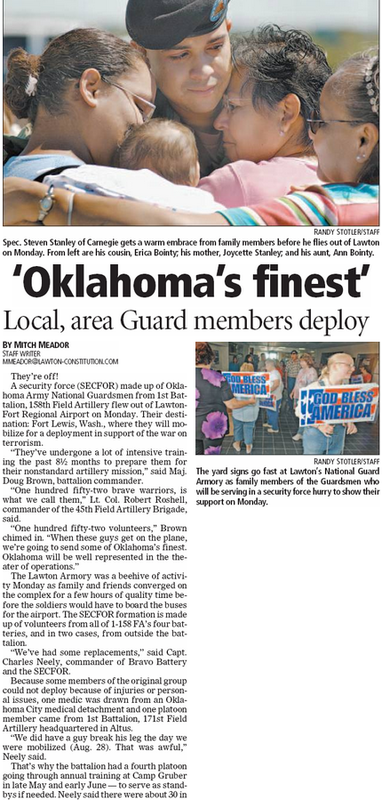
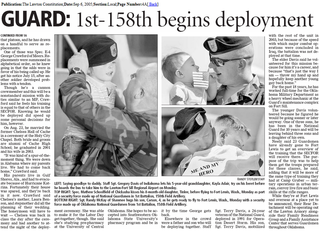
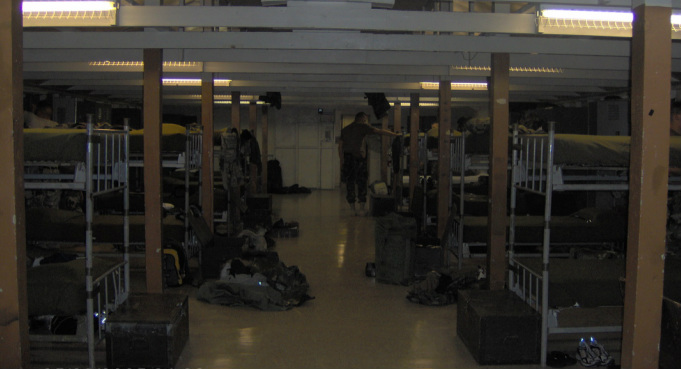
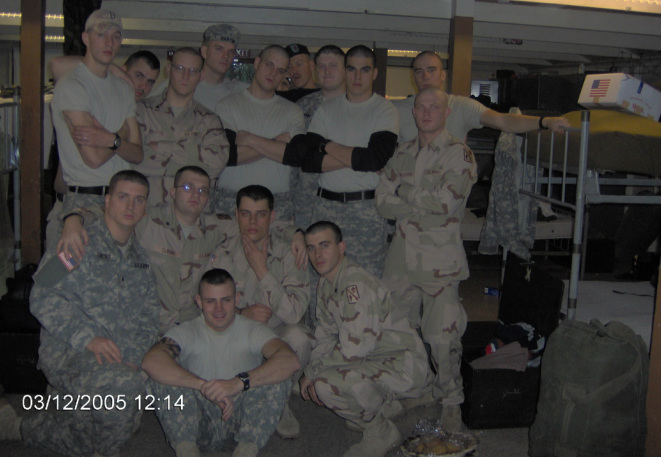
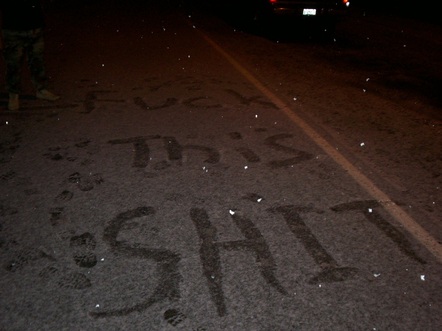
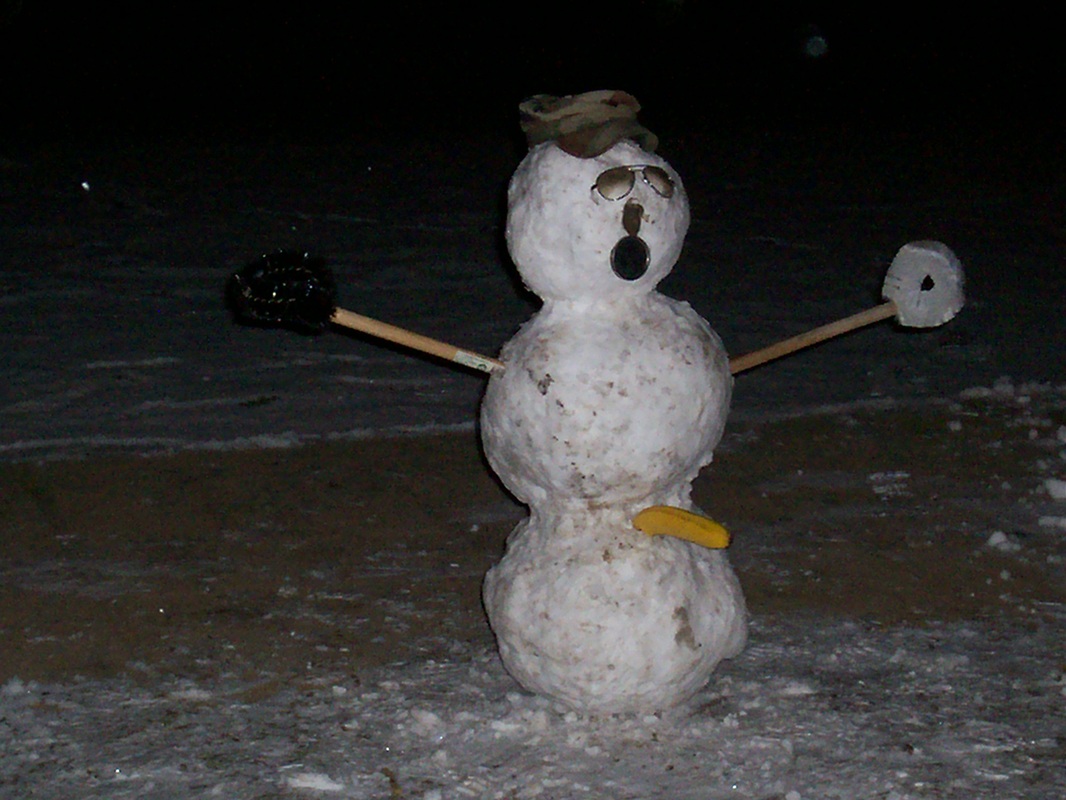

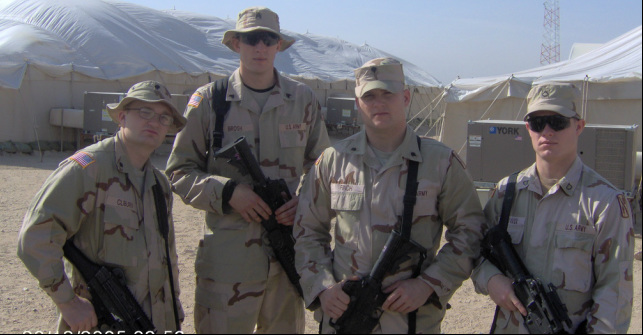
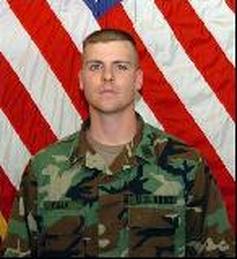
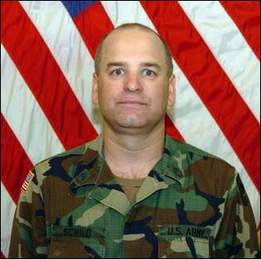
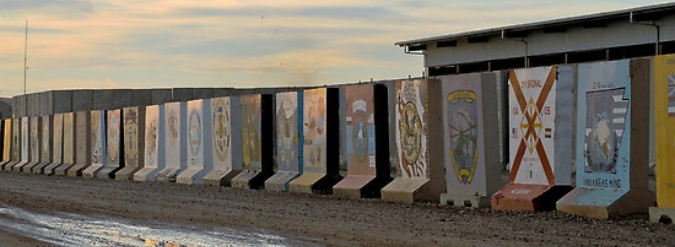
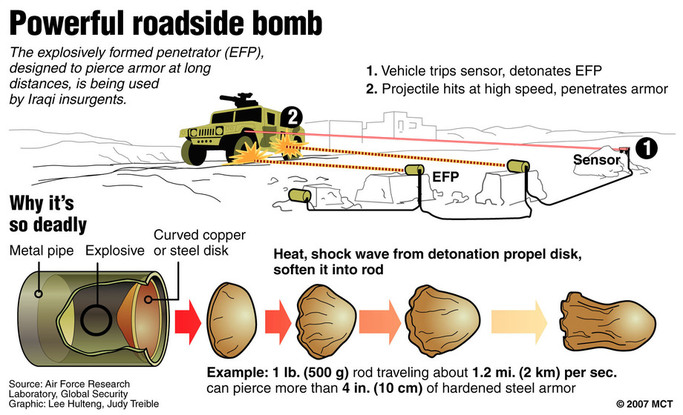
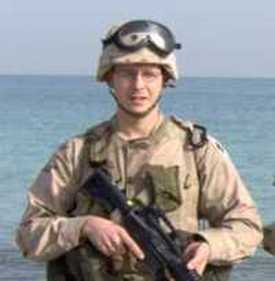
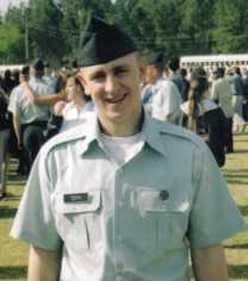
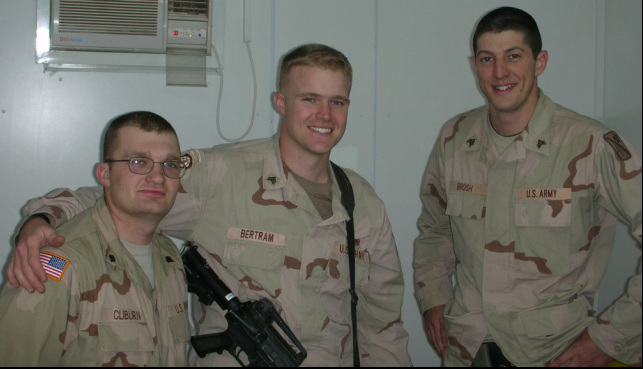
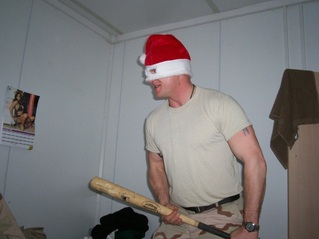
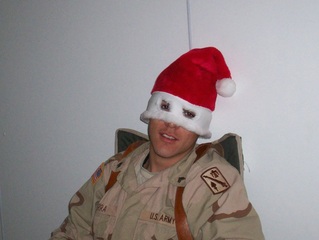
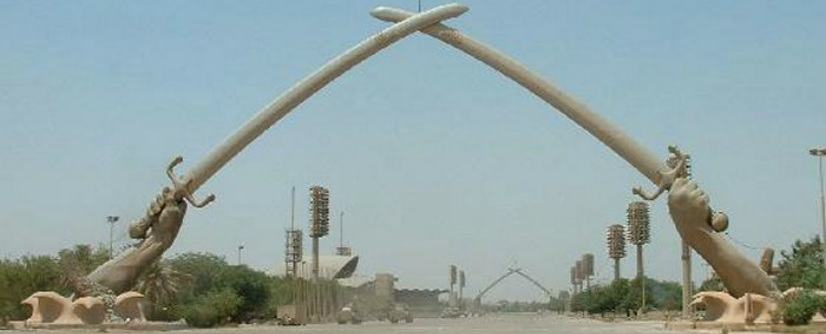
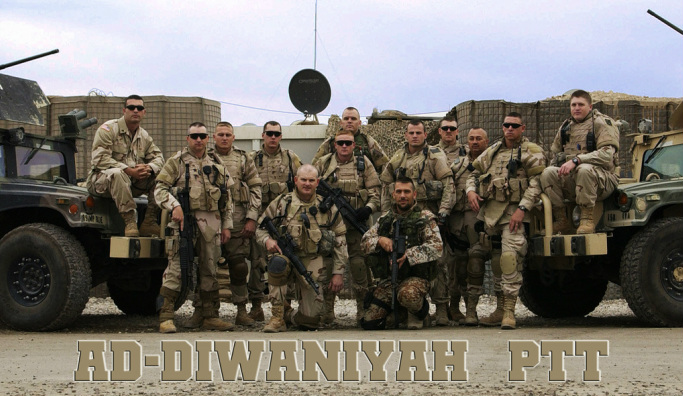

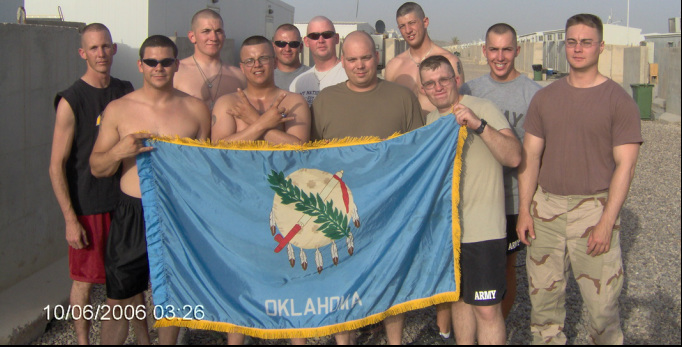
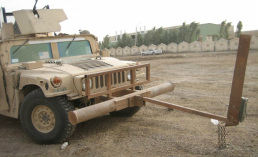
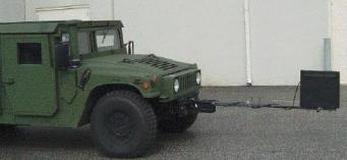
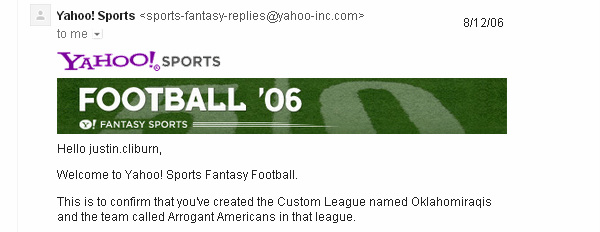


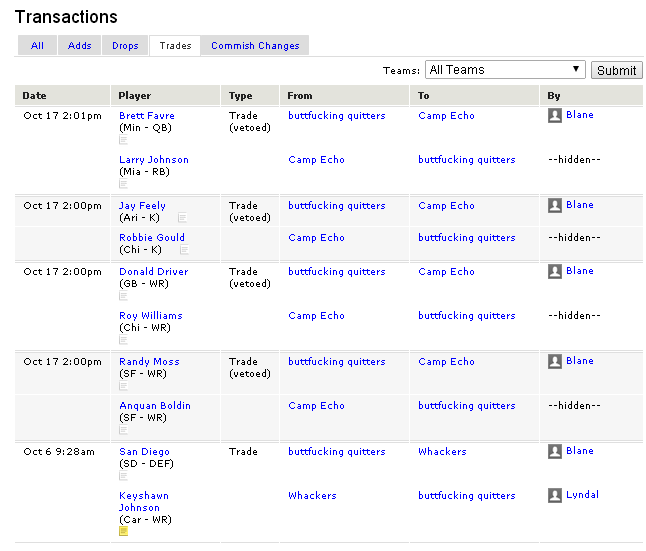
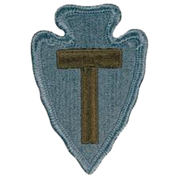

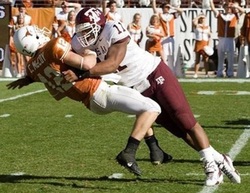
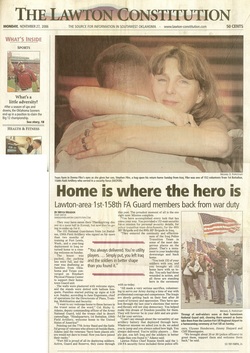
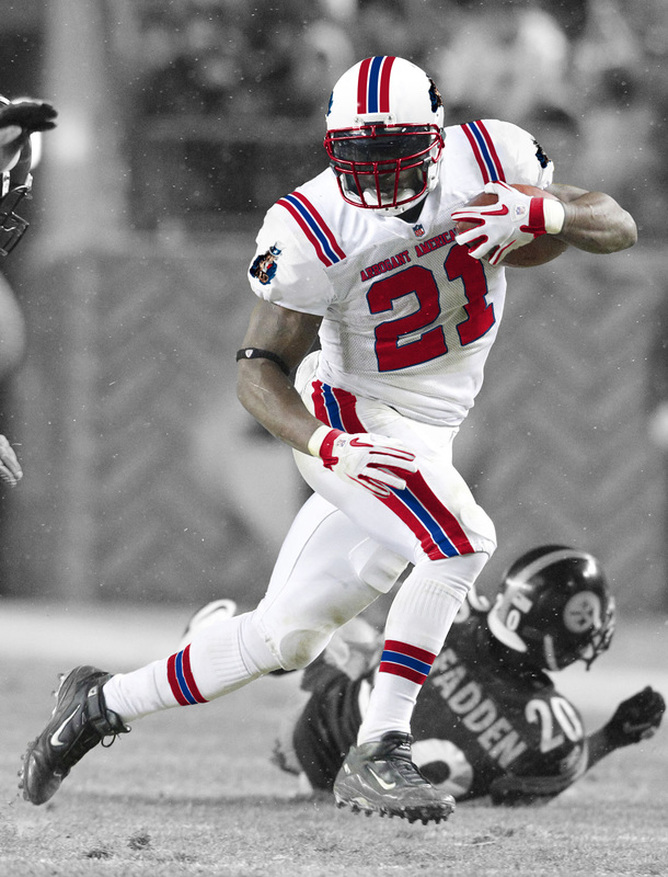
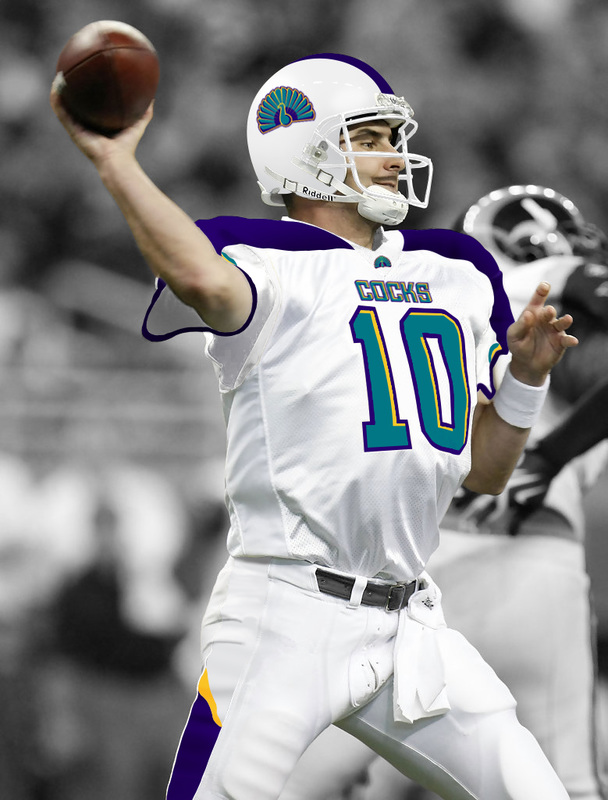
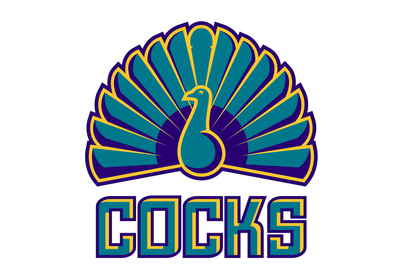
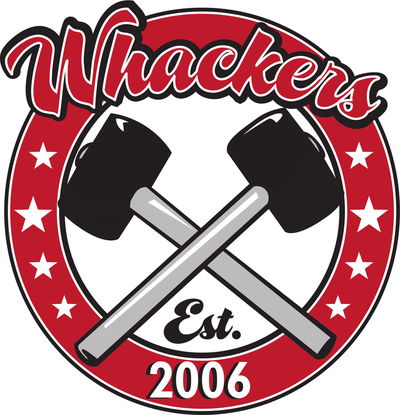
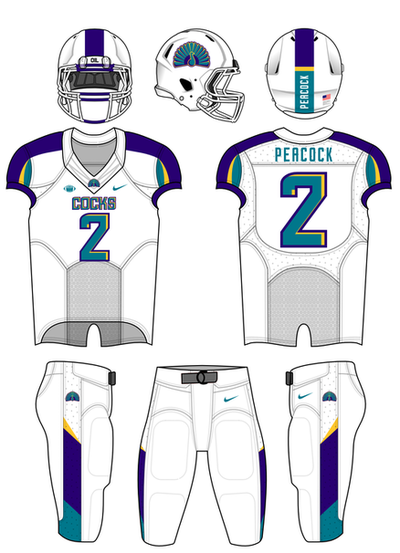
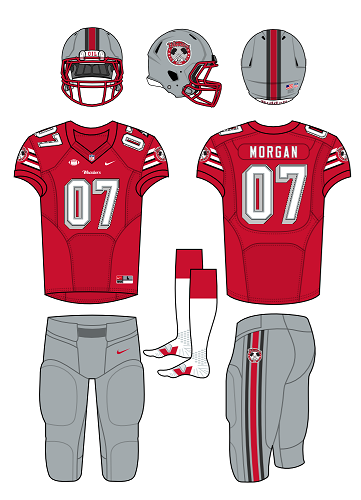
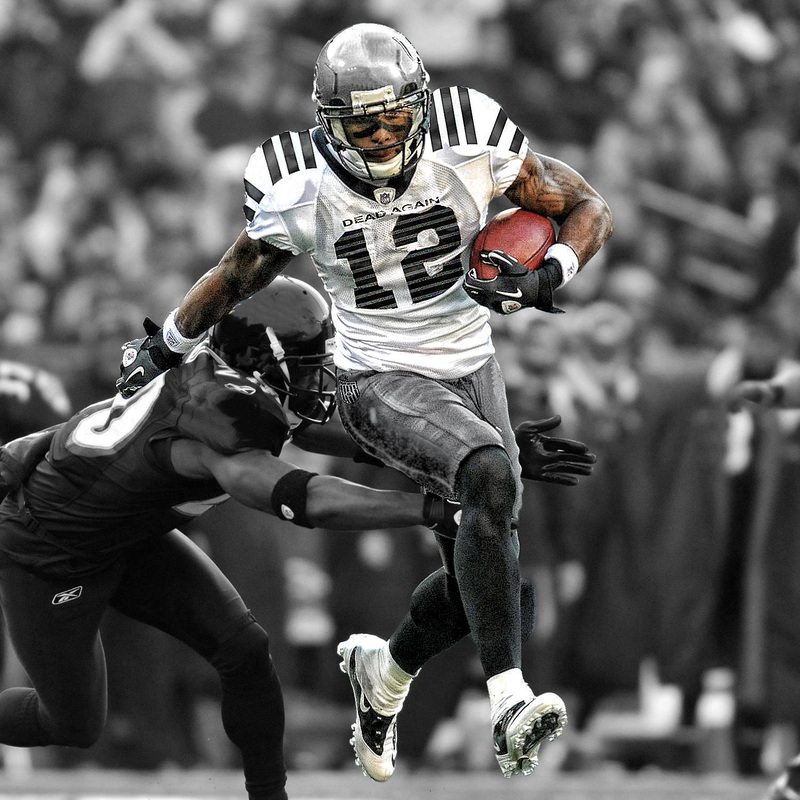
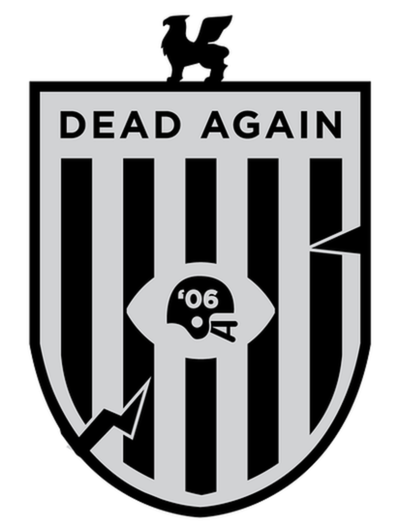
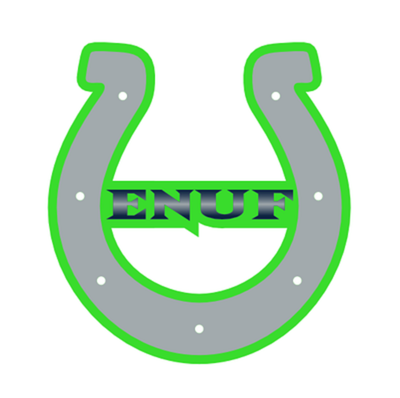
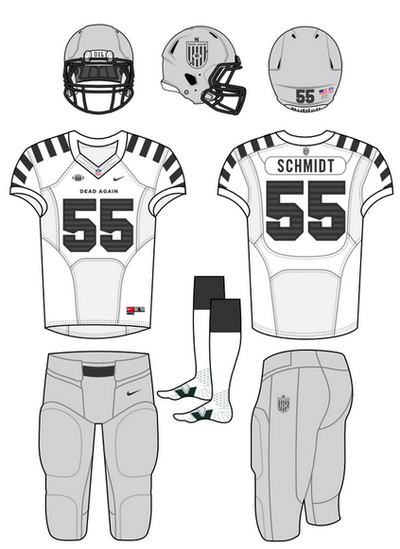
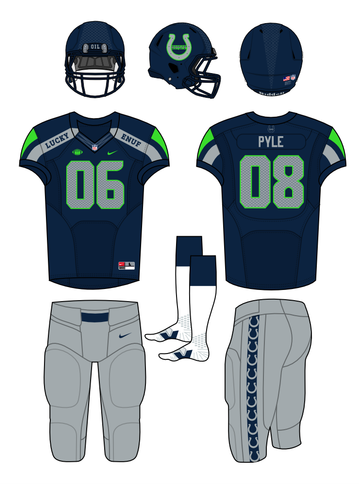
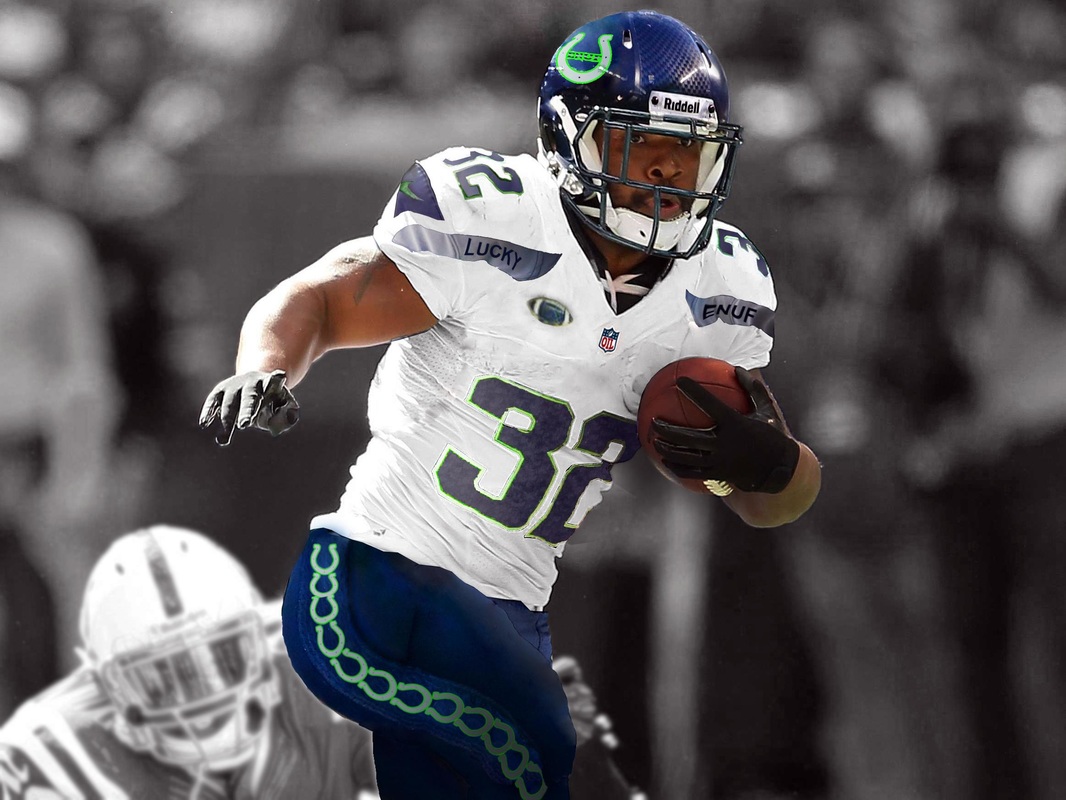
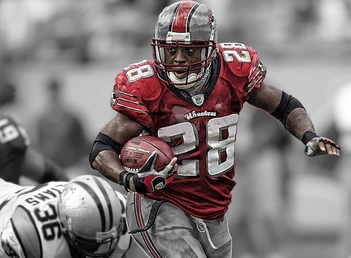
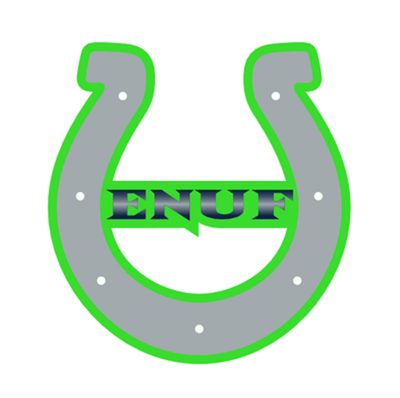
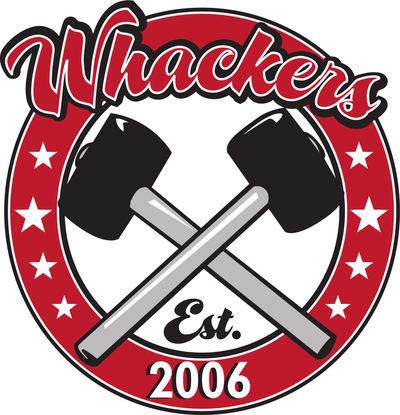
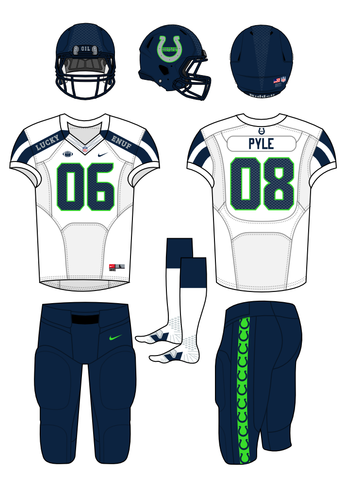
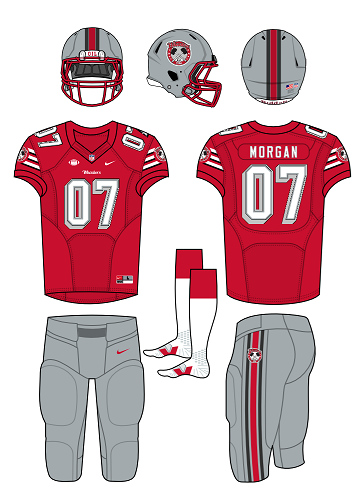
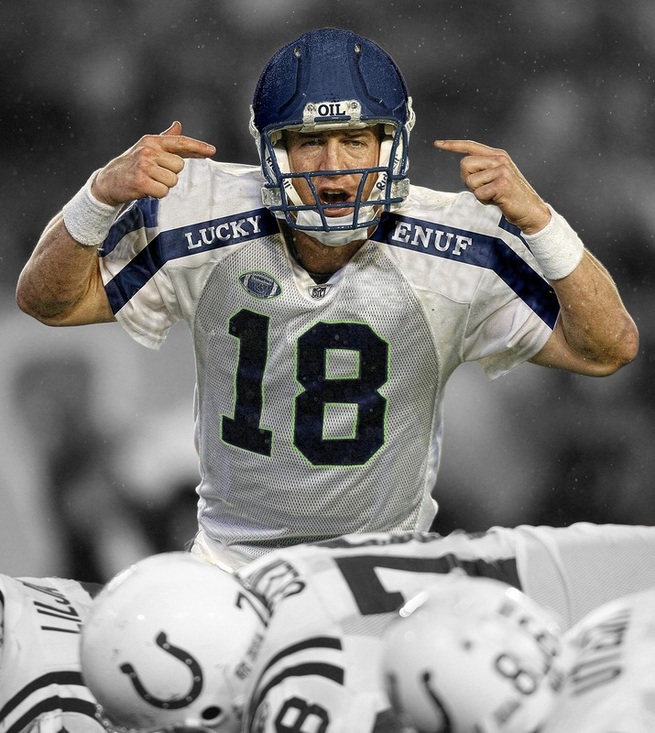
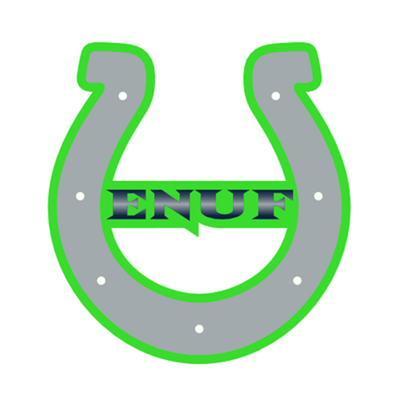
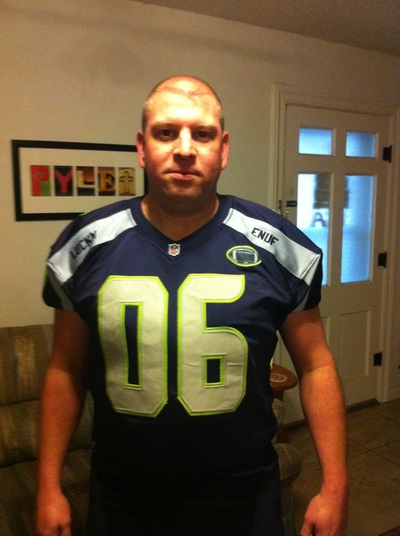
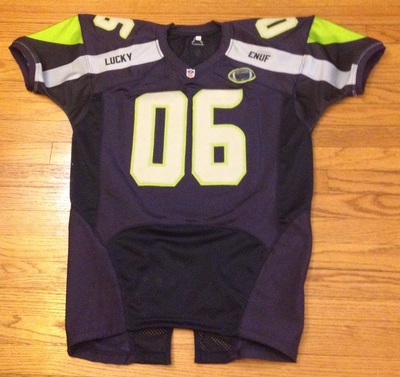
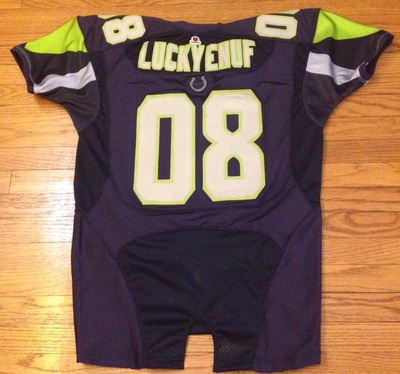
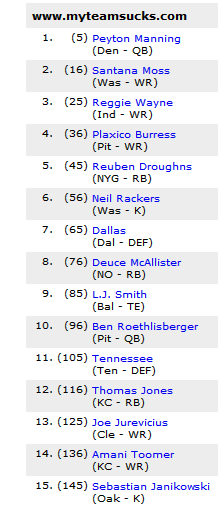
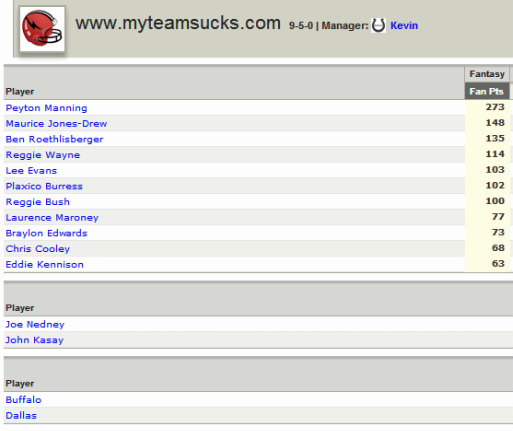
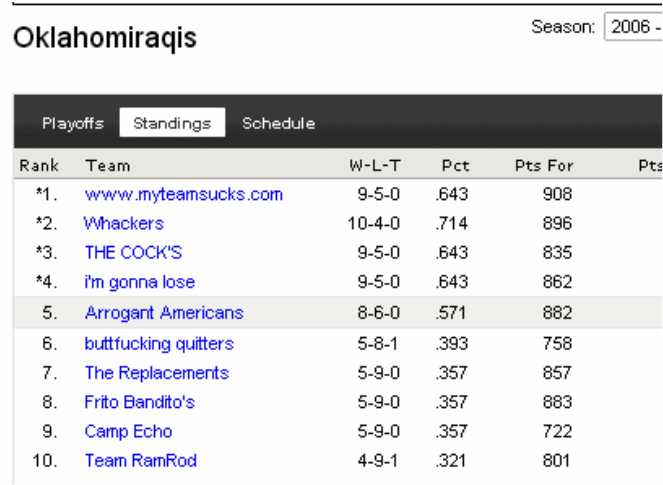

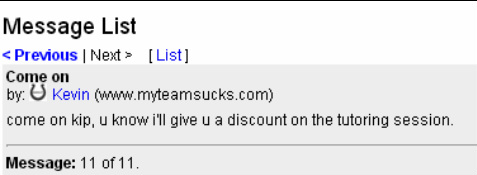
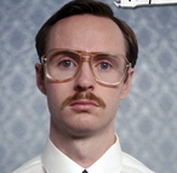
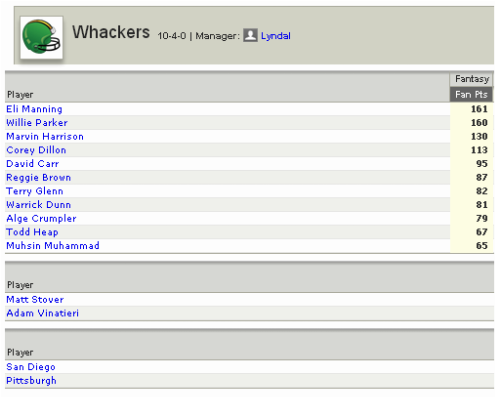
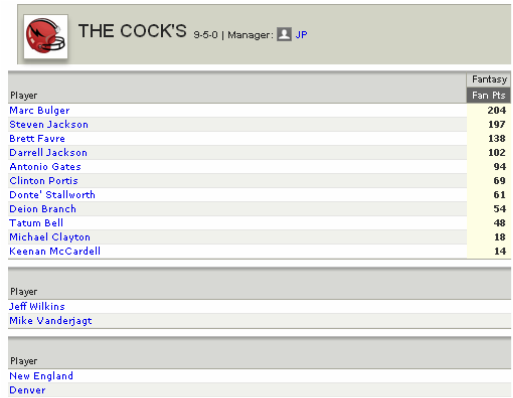
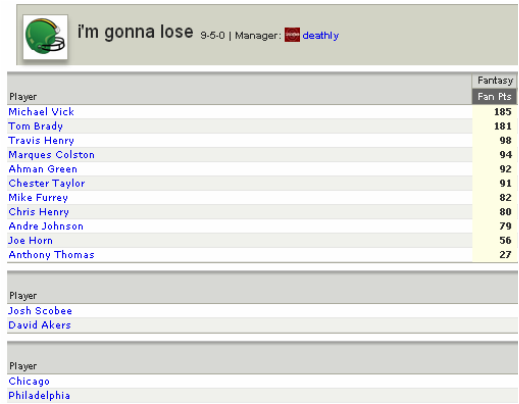
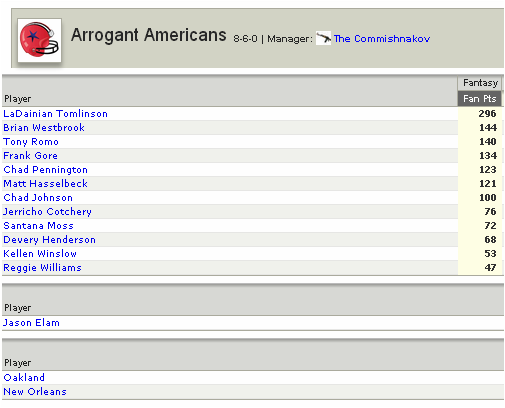
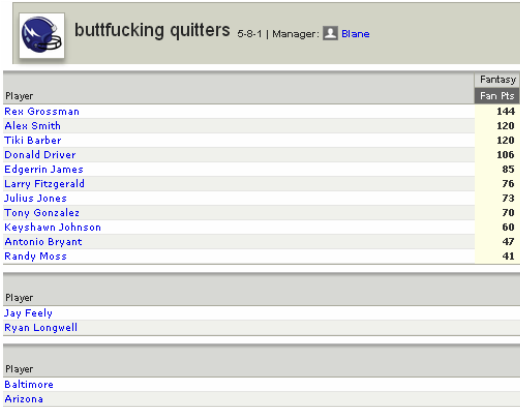
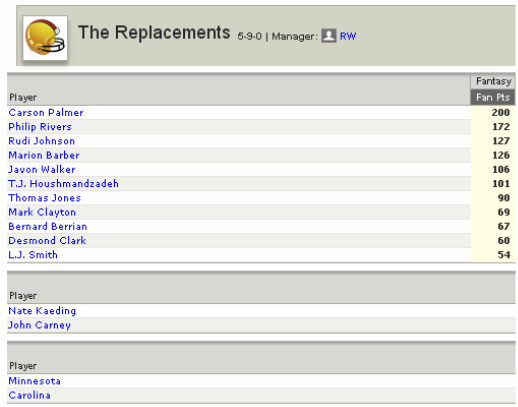
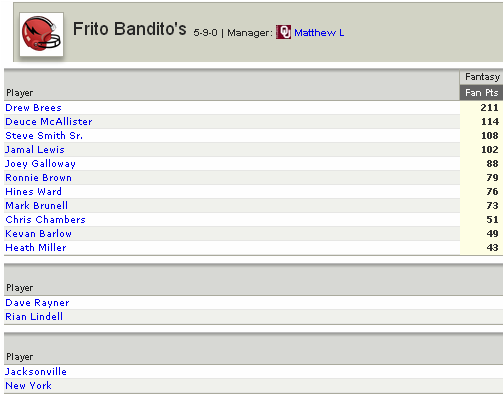
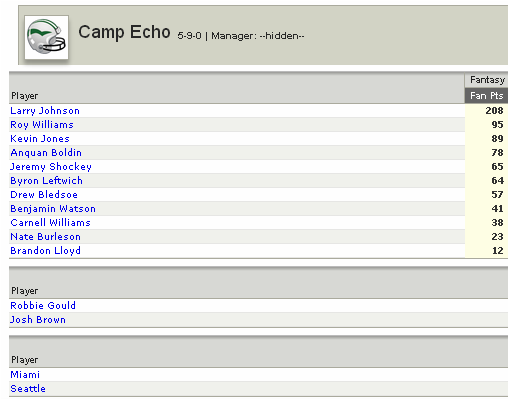
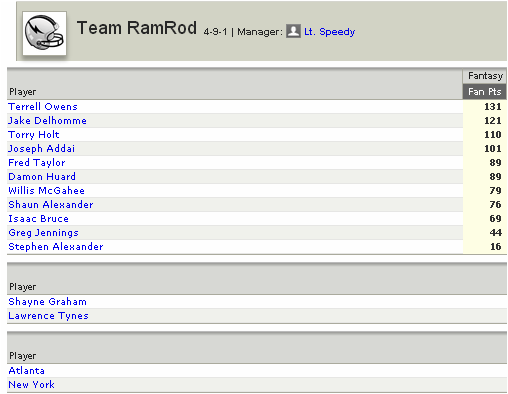
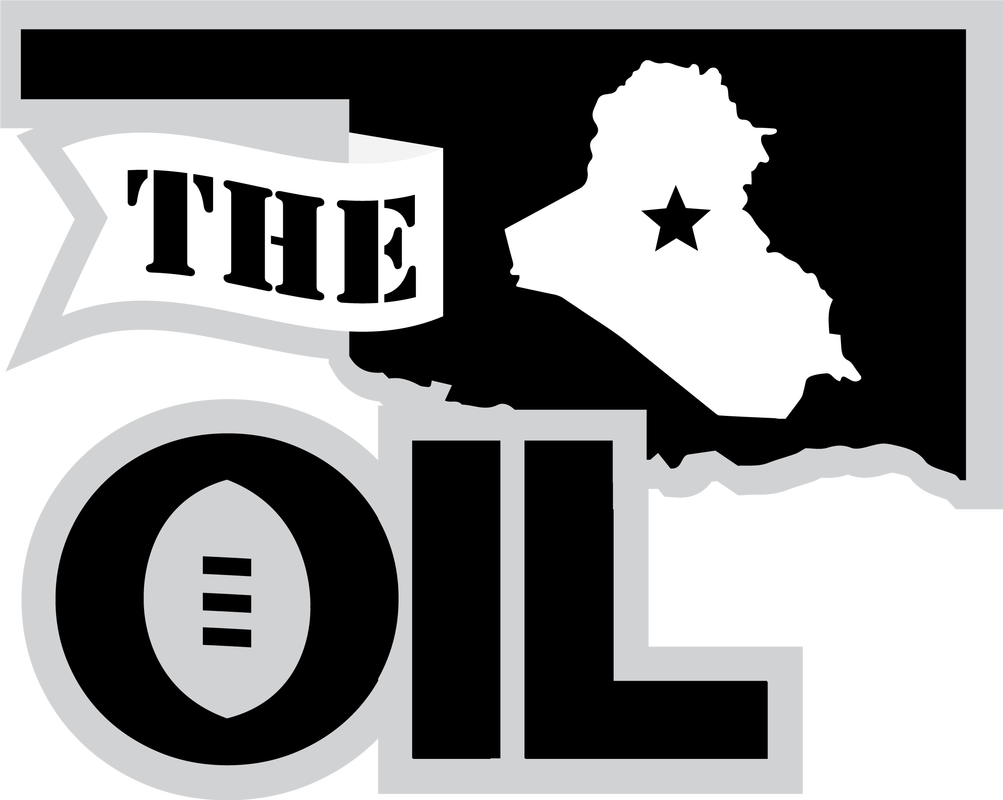

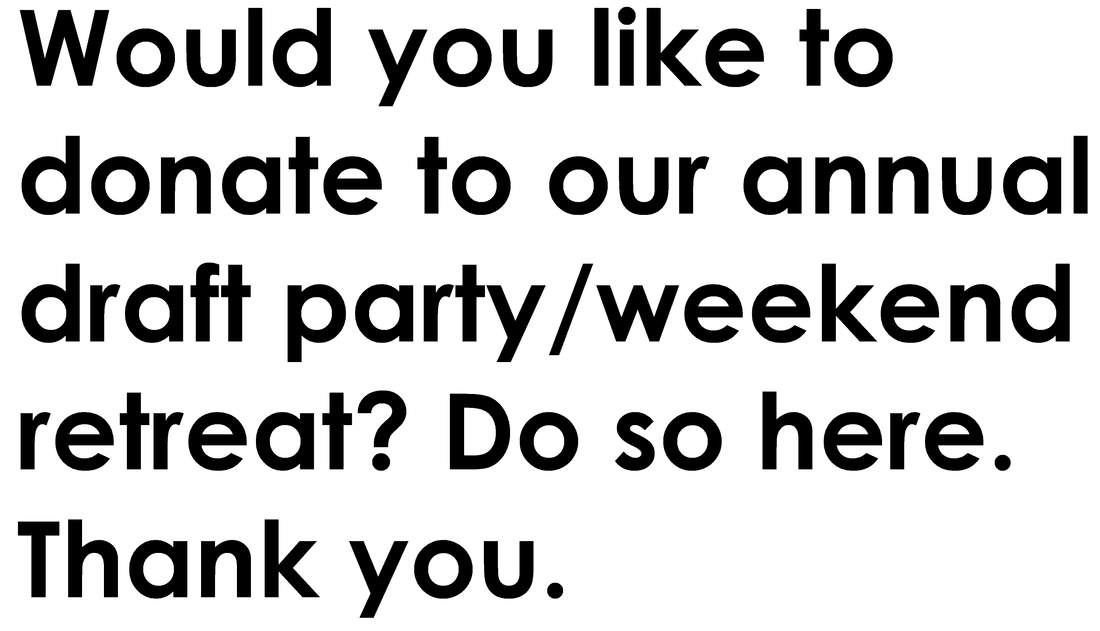



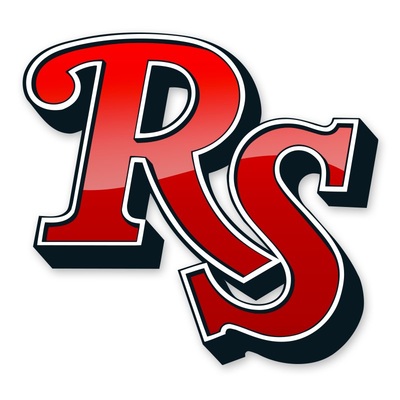



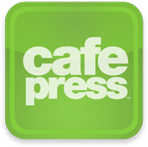
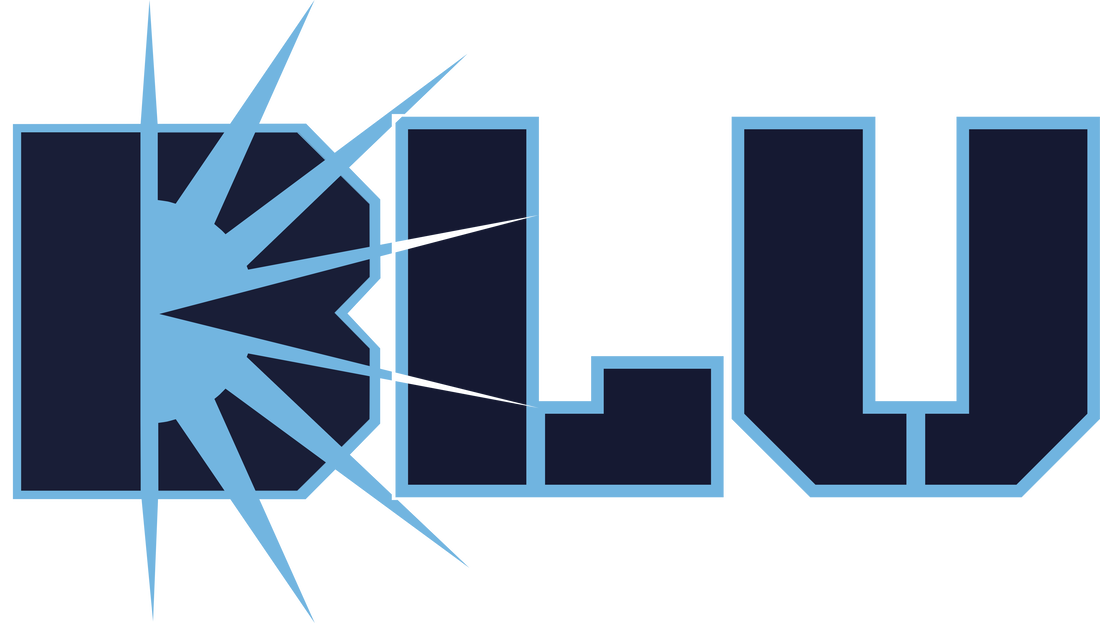

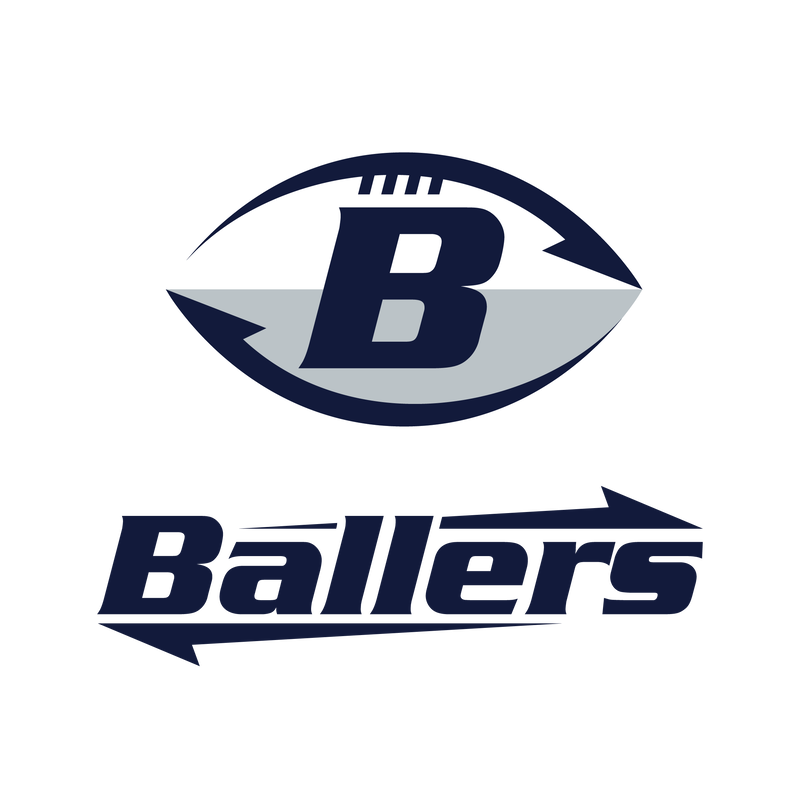
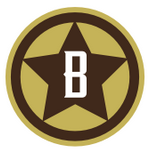
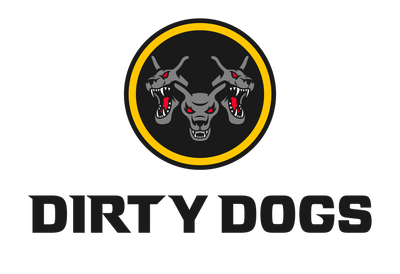
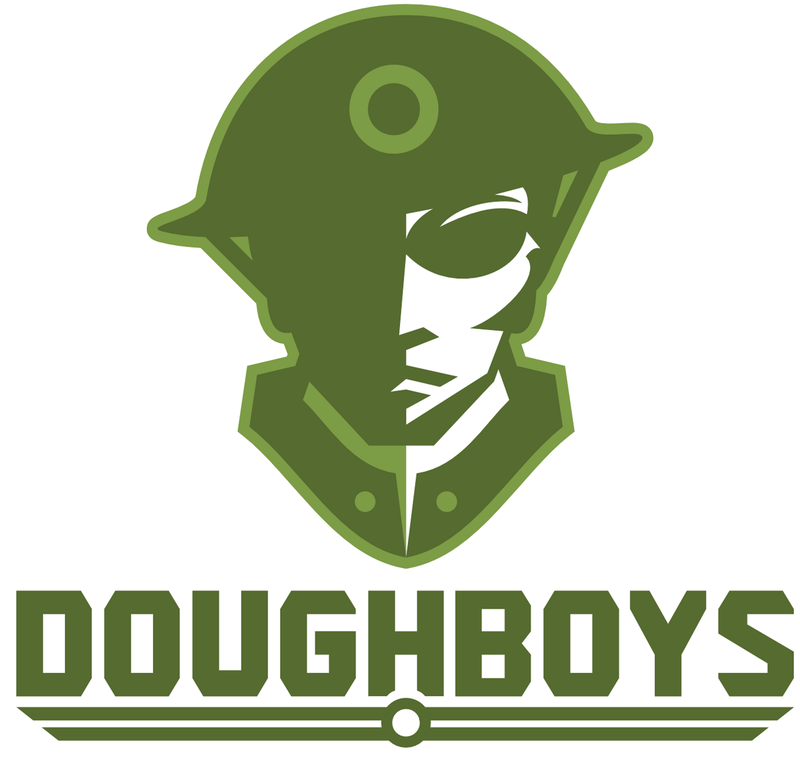
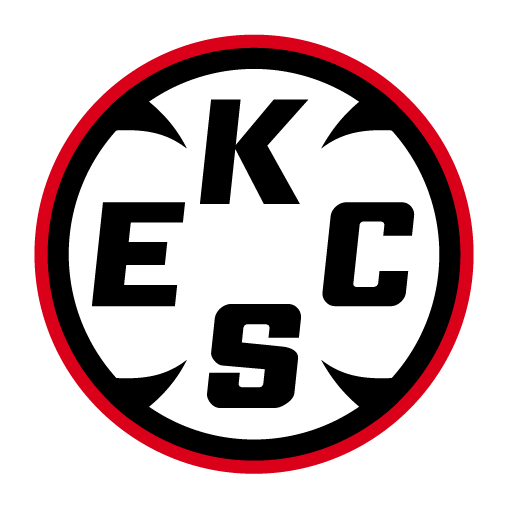
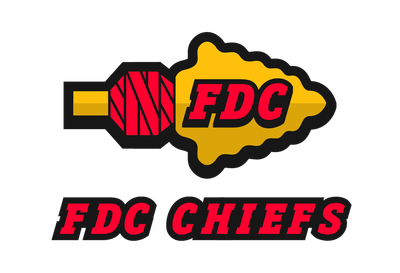
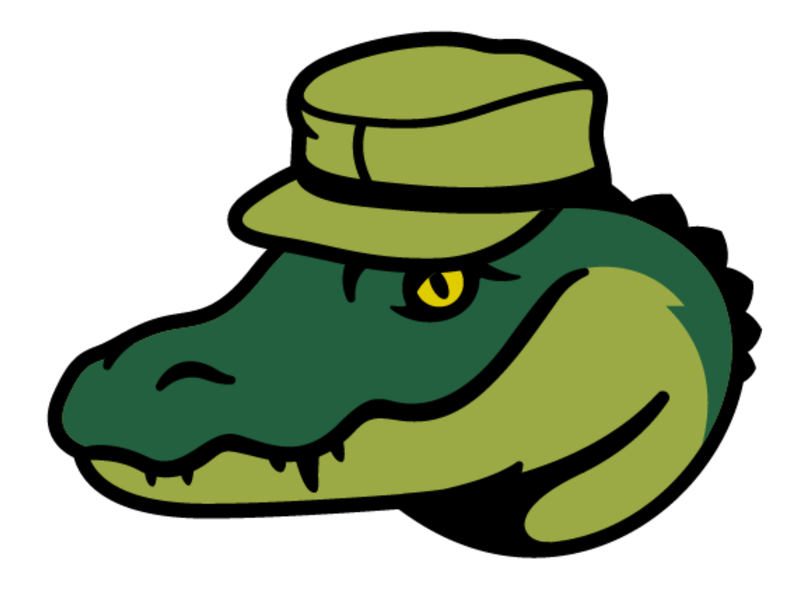
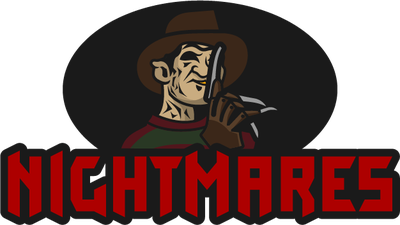
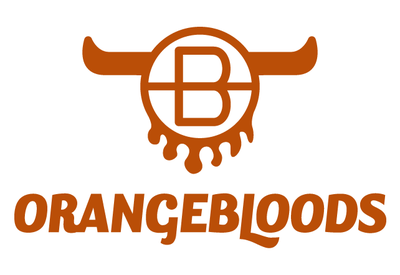
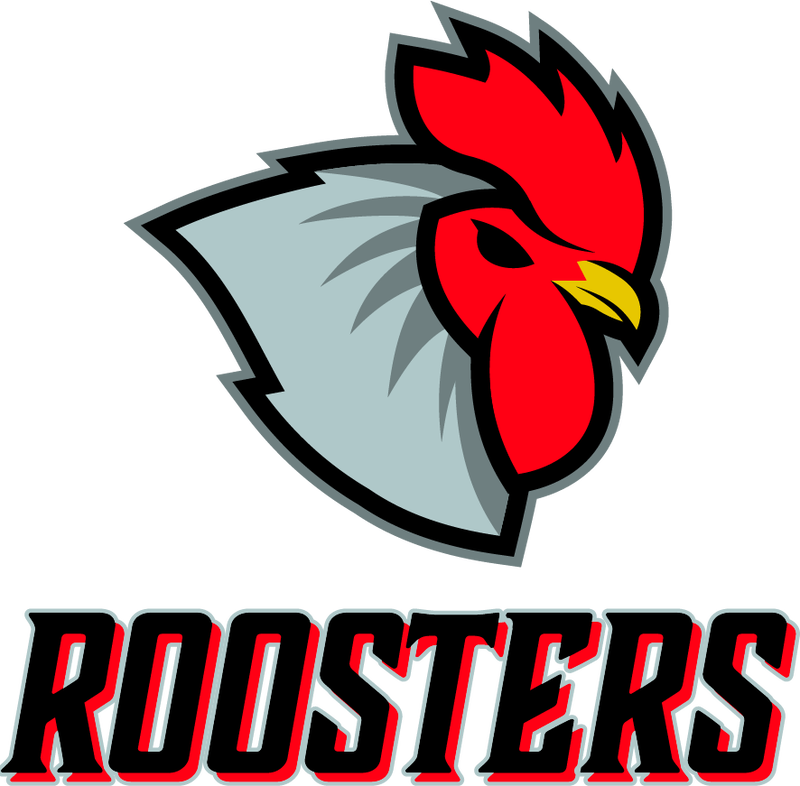
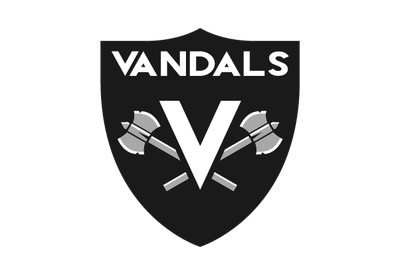
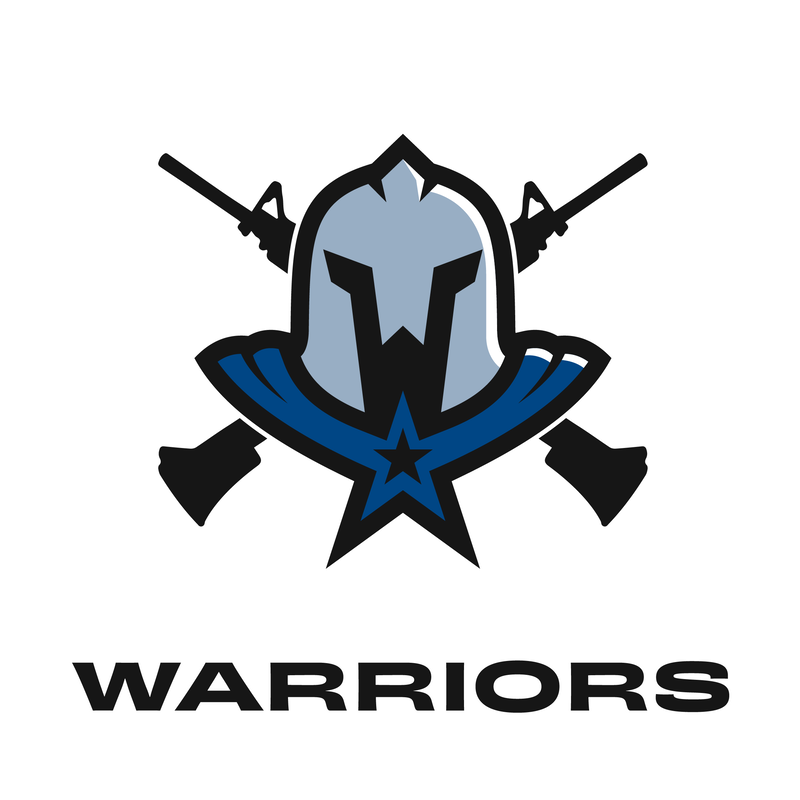
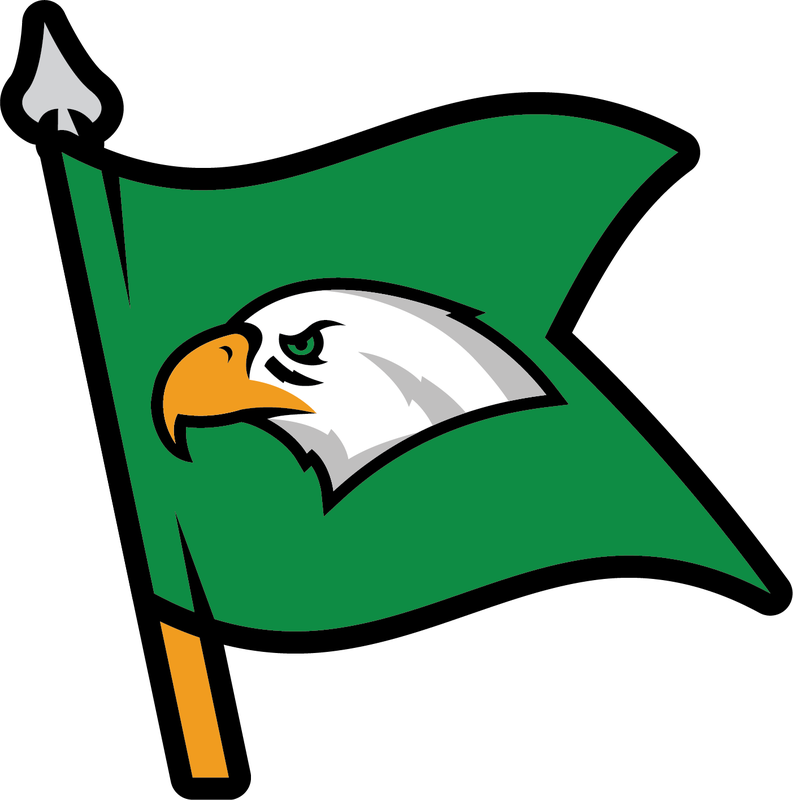
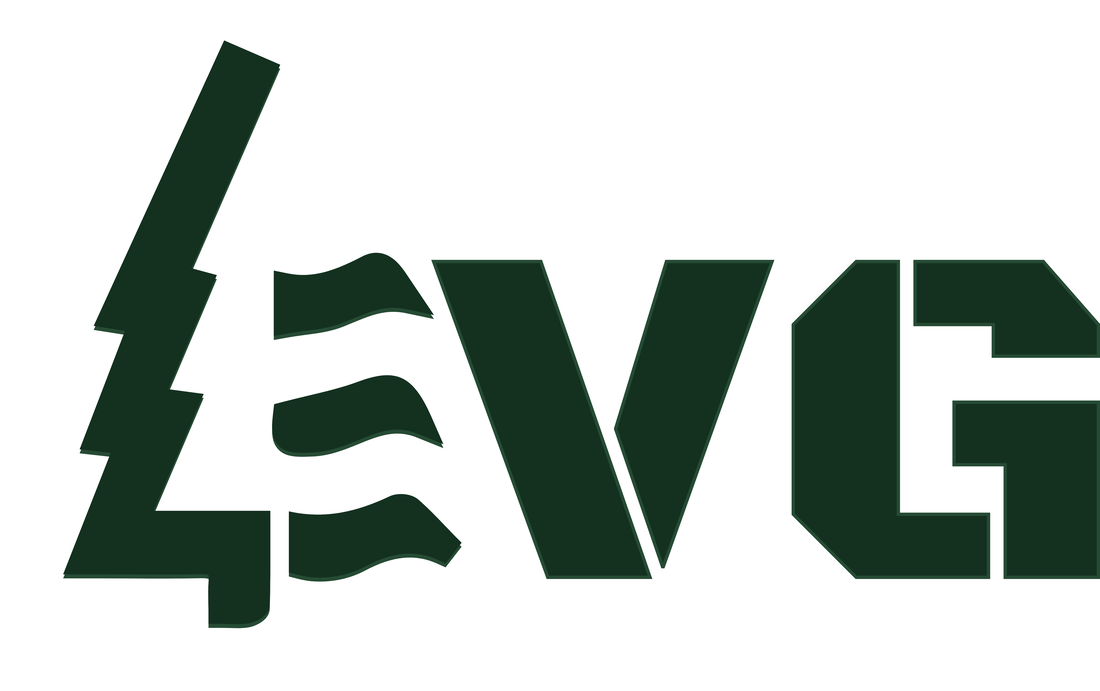

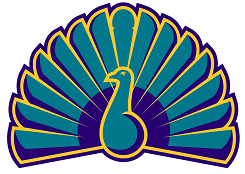
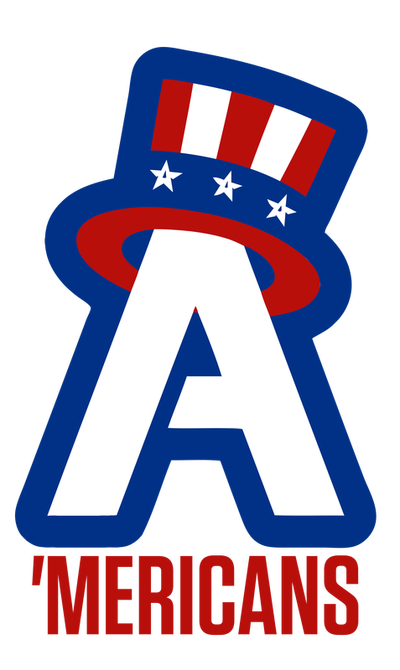
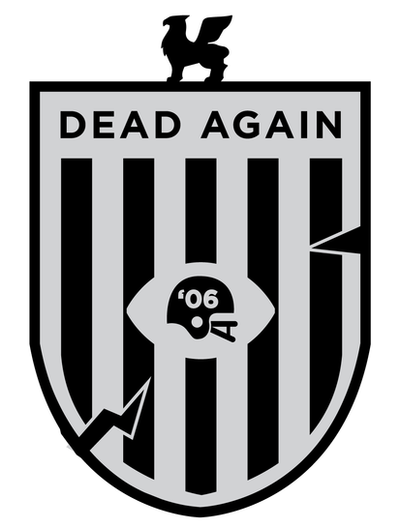
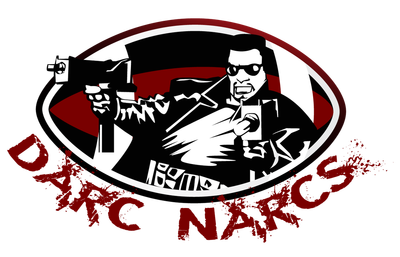
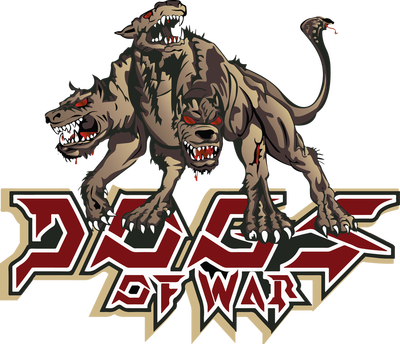
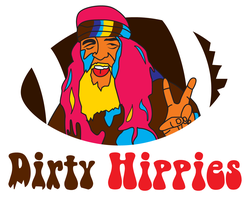
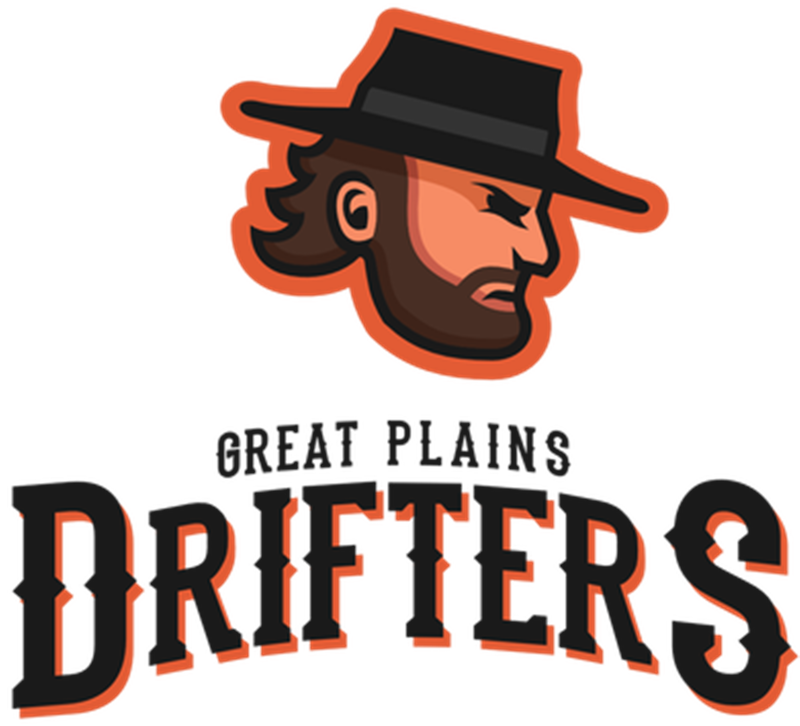
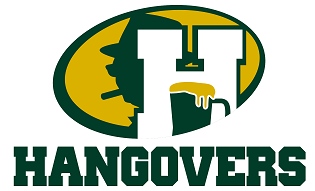
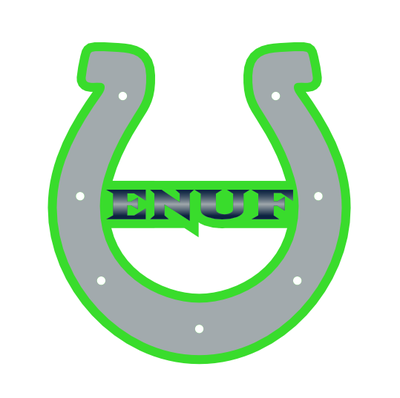
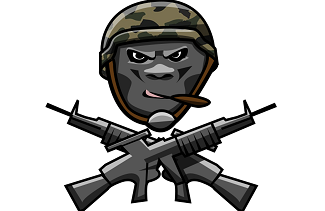
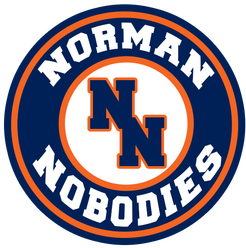
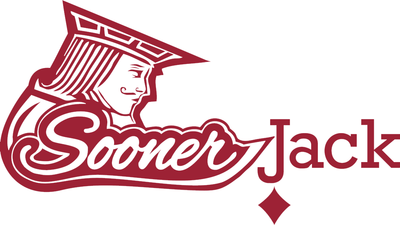
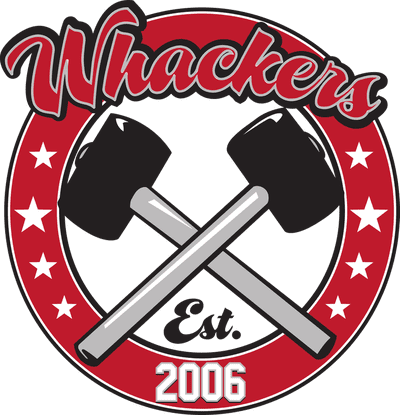
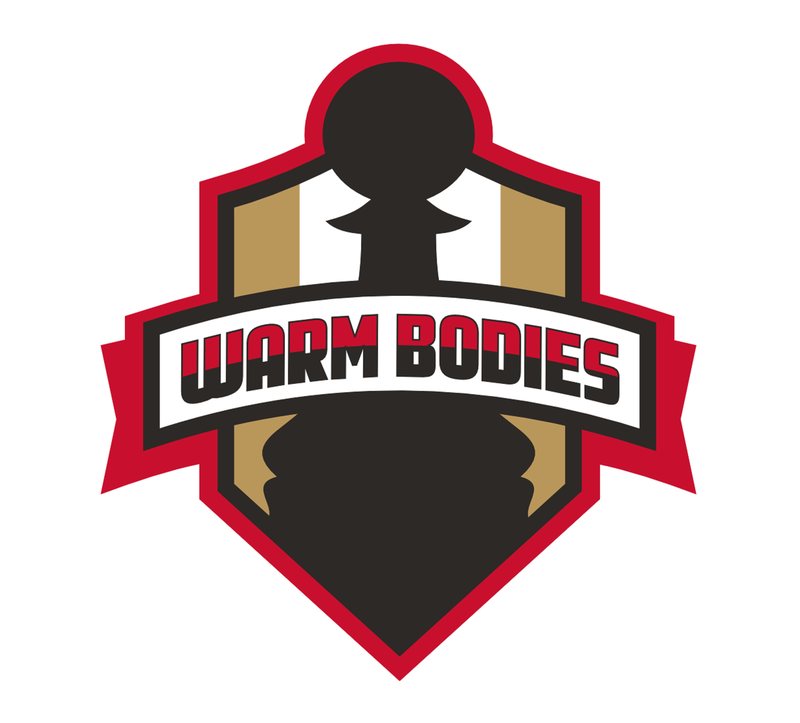


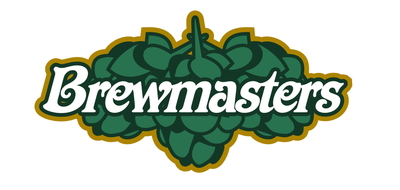
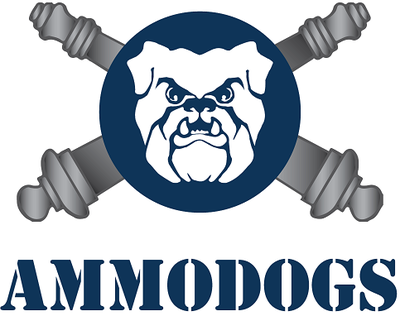
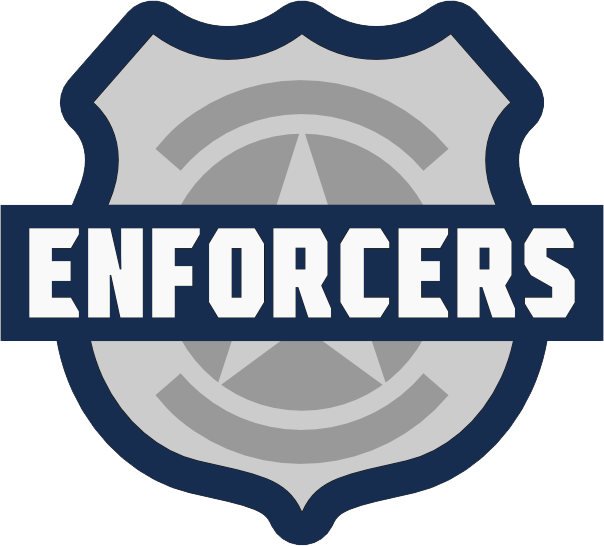
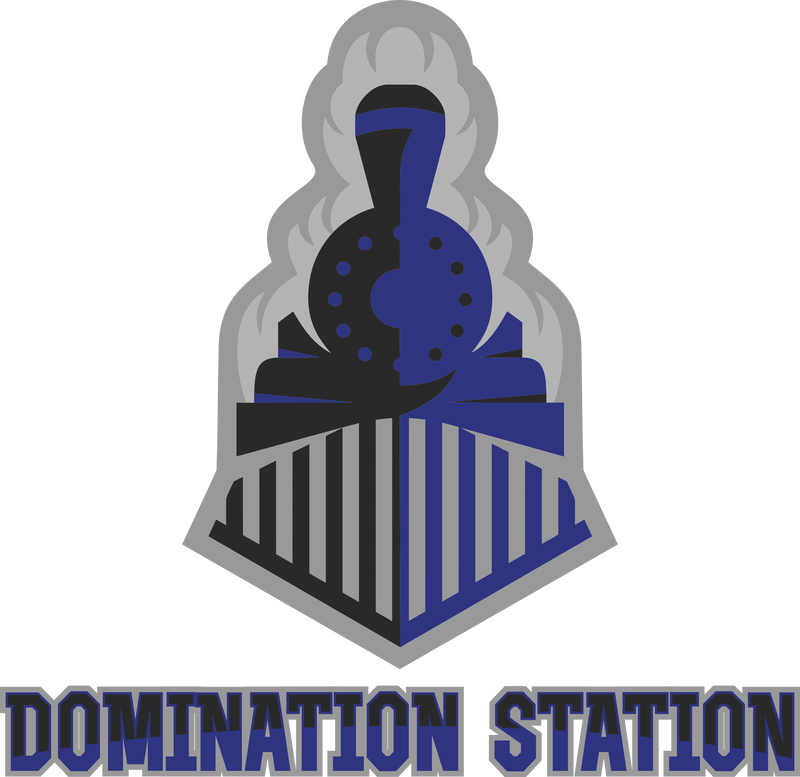
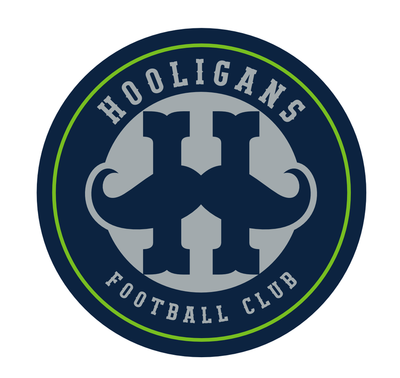
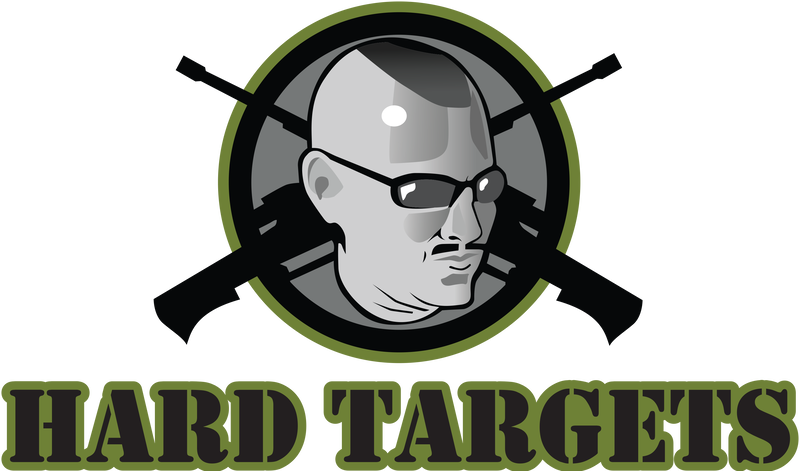
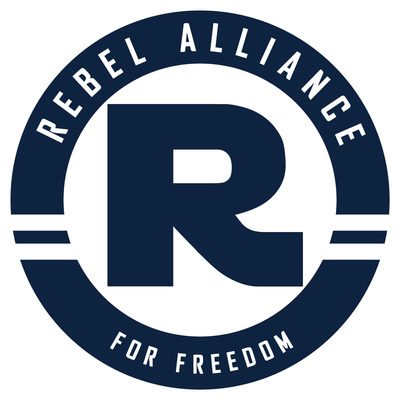
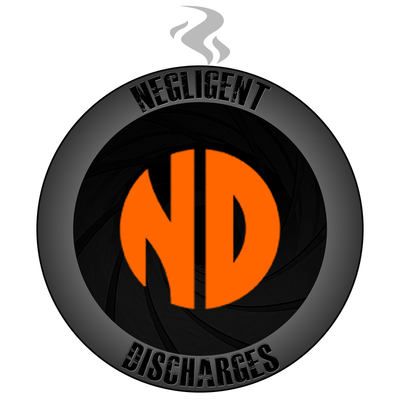
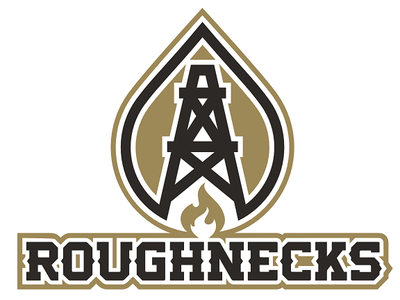
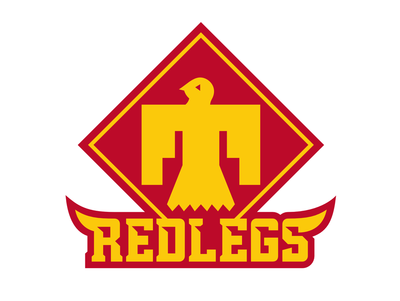
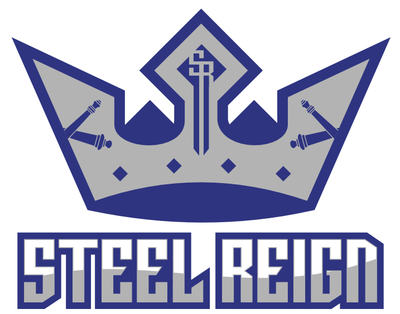
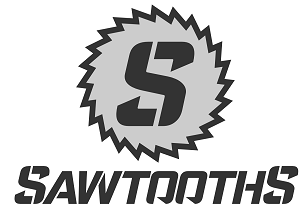
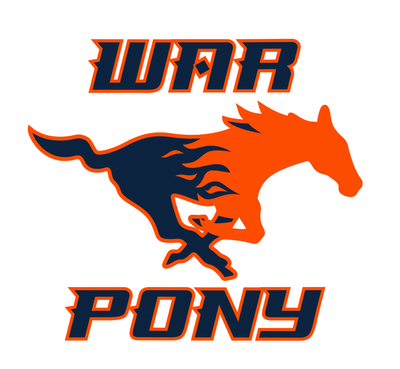


 RSS Feed
RSS Feed
